Recordings from CARLA Presentations
CARLA typically records and posts videos of presentations and webinars with the presenter's permission. See recorded presentations from 2016 to the present on this webpage.
To browse a list of all previous CARLA Presentation Series events see the CARLA bibliography list or YouTube playlist. To learn more about the wide variety of professional development offered through the center (conferences, workshops, institutes, and presentations), please see the database of publications and presentations.
2023-2024
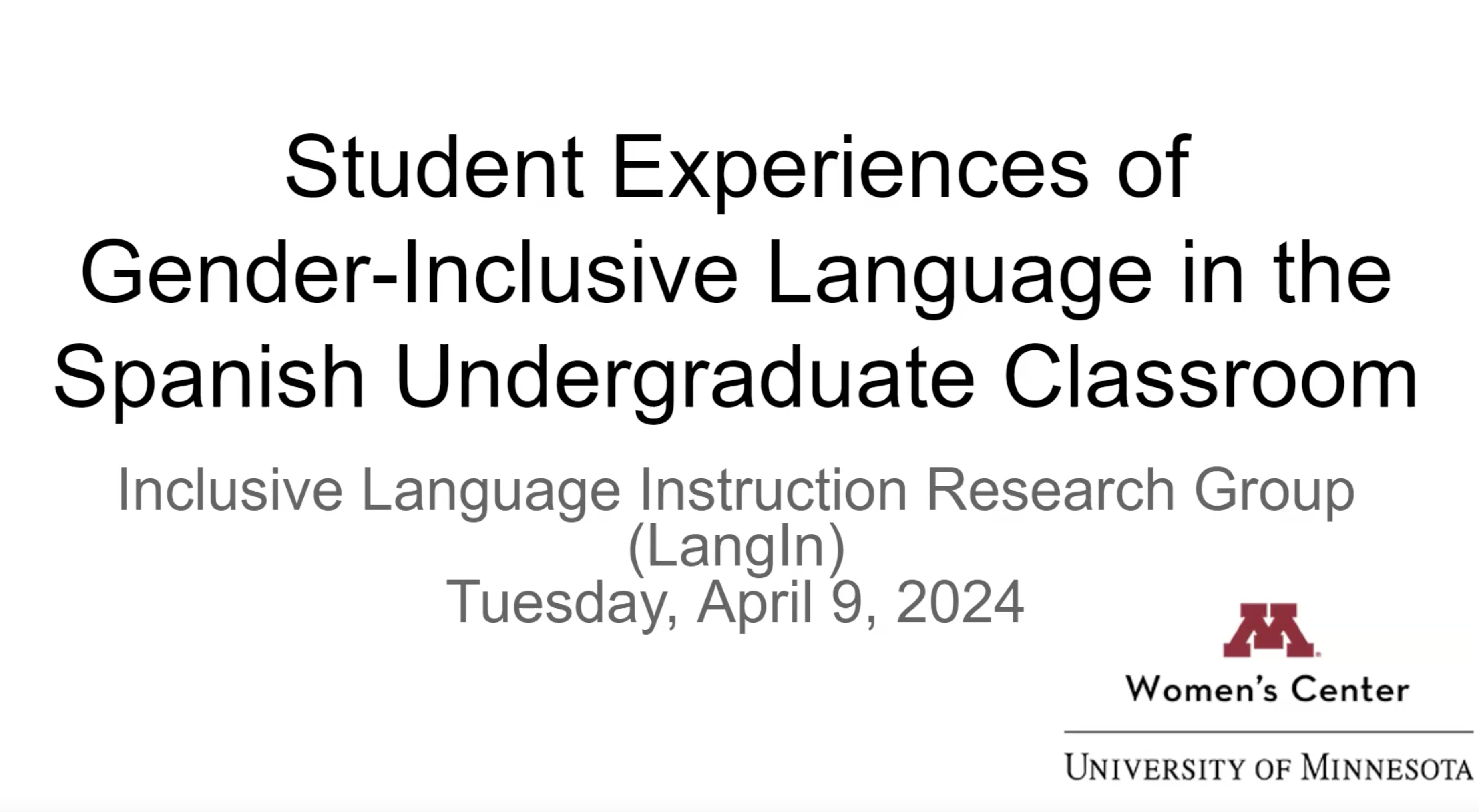
Braun, C., González Lesniak, F., Hama, Y., James, J., Ramsburg, J., & Takahira, A. (2024, April 9). "Student Experiences of Gender-Inclusive Language in the Spanish Undergraduate Classroom."
Even though Spanish conventionally has a binary grammatical gender system (i.e., masculine and feminine), various approaches have been taken in recent years to achieve a more equal linguistic representation of all genders (e.g., using both male and feminine at once such as “todos y todas” or adopting a new morpheme that is not associated with the traditional binary genders, as in “latinx” or “todes” instead of “latino” or “todos”). However, the gender-inclusive forms are yet to be accepted by many native speakers. Not unexpectedly, students who study Spanish as a foreign language are still unlikely to be exposed to gender-inclusive varieties (Morales-Vidal & Cassany 2020).
The Inclusive Language Instruction Research Group (LangIn) surveyed and interviewed undergraduate students of Spanish at the University of Minnesota about their experiences with and opinions of gender-inclusive language to examine how students learn and understand gender expressions and inclusivity in the language classroom. Furthermore, the study seeks to contribute to the creation of gender-inclusive classroom environments by articulating what kind of gender-related topics, materials, and pedagogy are desired by students themselves.
Presenters:
Camille Braun is a PhD candidate in Hispanic Literature and Culture in the Department of Spanish and Portuguese Studies at the University of Minnesota. Her research explores artistic narratives which center the voices and expertise of people who use drugs in contemporary Spain.
Fernando González Lesniak is a Ph.D candidate in Curriculum and Instruction specializing in Second Language Education at the University of Minnesota. His research interests include acoustic phonetics, teacher education, translanguaging, social justice and gender-just pedagogies.
Yoko Hama is a Ph.D. candidate specializing in Hispanic Linguistics in the Department of Spanish and Portuguese Studies at the University of Minnesota. Their research interests include sociolinguistics, translanguaging, language and identity, especially in the context of Asian diaspora communities in Spanish-speaking countries.
Jacky James is a graduate student in Hispanic Linguistics in the Department of Spanish and Portuguese Studies at the University of Minnesota. Their research interests include language contact and language change, specifically involving inclusive language.
James Ramsburg is a PhD candidate in Hispanic Linguistics in the Department of Spanish and Portuguese Studies at the University of Minnesota. His research focuses on identifying and explaining dialectal variation, especially in the lexicon and morphosyntax.
Alejandra Takahira is a PhD student in Spanish and Portuguese literature at the University of Minnesota. She researches contemporary women authors of Asian ancestry in Latin America, and also works with contemporary cinema, feminist theory and race in Latin America.
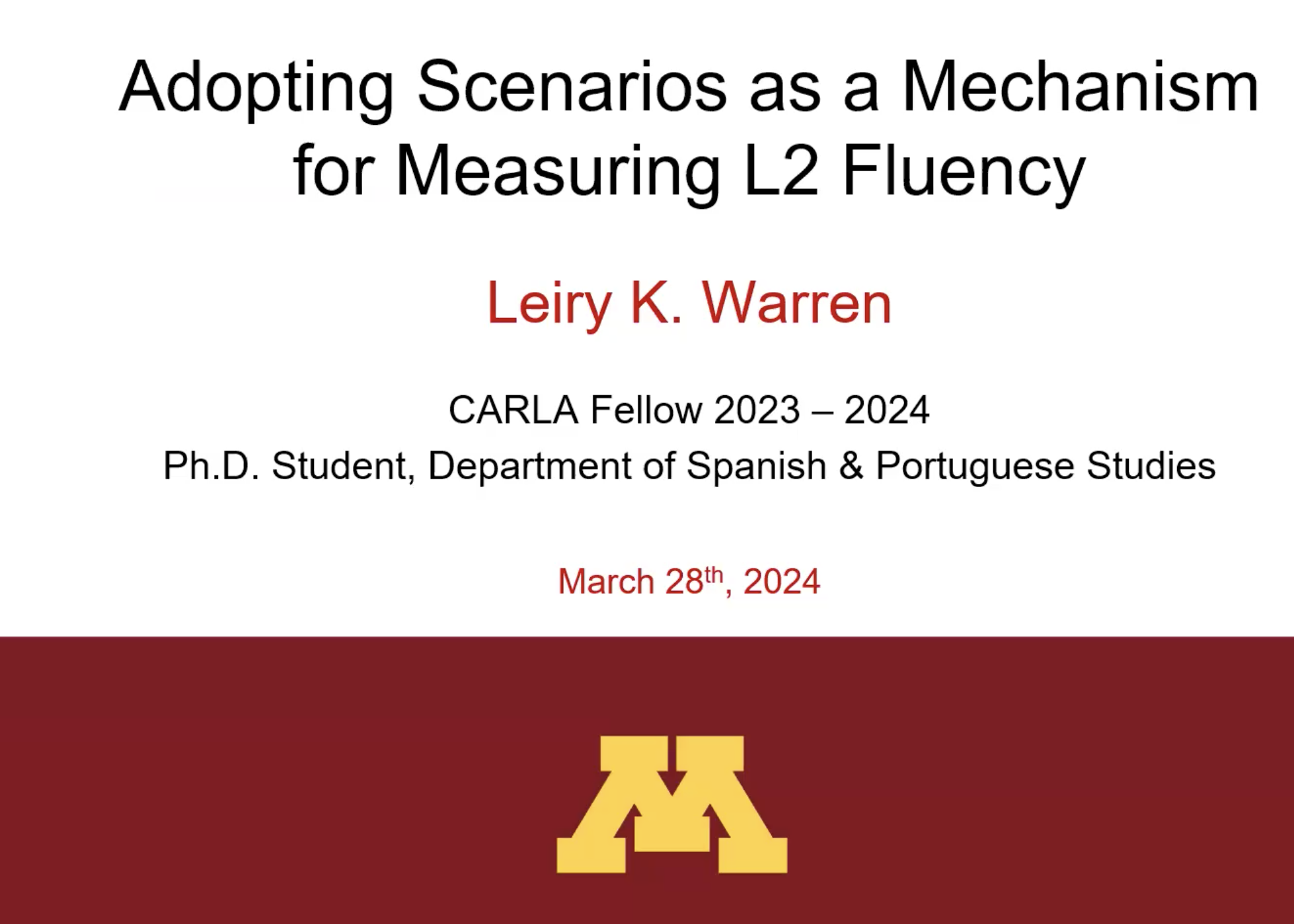
Warren, L. (2024, March 28). "Adopting Scenarios as a Mechanism for Measuring L2 Fluency."
Fluency is a crucial aspect of foreign and second language (L2) oral proficiency, often assessed through speaking examinations, playing a vital role in determining an L2 user's competence. However, there is a disparity in defining fluency, ranging from narrow to broad perspectives, influencing how oral proficiency is evaluated. Most tests employ presentational tasks, lacking authenticity and deemed insufficient for realistic assessments, leading to a call for alternatives. Scenarios (Di Pietro, 1994), conceptualized as situations fostering strategic interaction for language learning, emerge as an alternative for fluency assessment, providing a realistic evaluation method. This proposed mechanism aligns with the need for oral tests adhering to authenticity, interactivity, and practicality, as suggested by Bachman and Palmer (1996), offering a more accurate performance evaluation for language users in authentic situations.
Presenter:
Leiry Warren is a PhD student in Hispanic Linguistics in the Department of Spanish and Portuguese Studies where she teaches undergraduate Spanish courses. Her research interests include second language acquisition, oral fluency assessments, sociocultural theory, metacognition in language learning, the use of scenarios (Di Pietro, 1994), and language policy. She was selected to be a CARLA Fellow for 2023–2024.
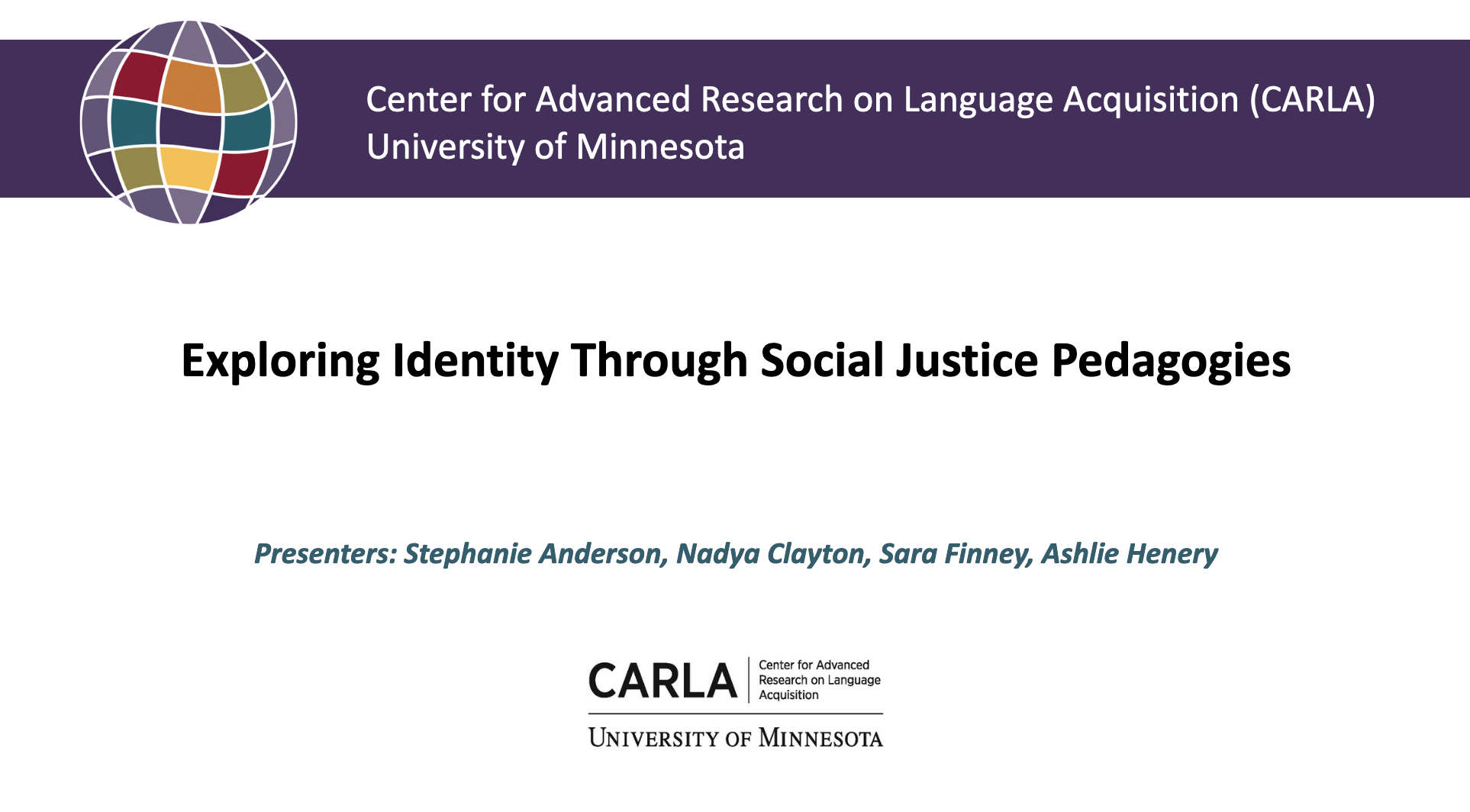
Anderson, S., Clayton, N., Finney, S., Henery, A. (2024, February 22). "Exploring Identity Through Social Justice Pedagogies."
This interactive session engages participants with intermediate-level curricular units in French, Portuguese, Russian, and Spanish that address multilingual/multicultural identity through a social justice lens. To begin, each presenter will provide an overview of their unit. Then, curriculum developers will discuss the challenges, successes, and highlights of implementing the units in their classrooms. The presentation will culminate with a Q&A session followed by a demonstration of how attendees can access the curricular units for use in their classrooms.
Presenters:
Stephanie Anderson is a Senior Teaching Specialist of Spanish and Portuguese in the Department of Spanish and Portuguese Studies at the University of Minnesota.
Nadya Clayton is a Senior Lecturer of Russian in the Department of German, Nordic, Slavic and Dutch at the University of Minnesota.
Sara Finney is a Senior Lecturer and the Intermediate Spanish Coordinator in the Department of Spanish and Portuguese Studies at the University of Minnesota.
Ashlie Henery is a Lecturer and the Coordinator of First-Year French in the Department of French and Italian at the University of Minnesota.
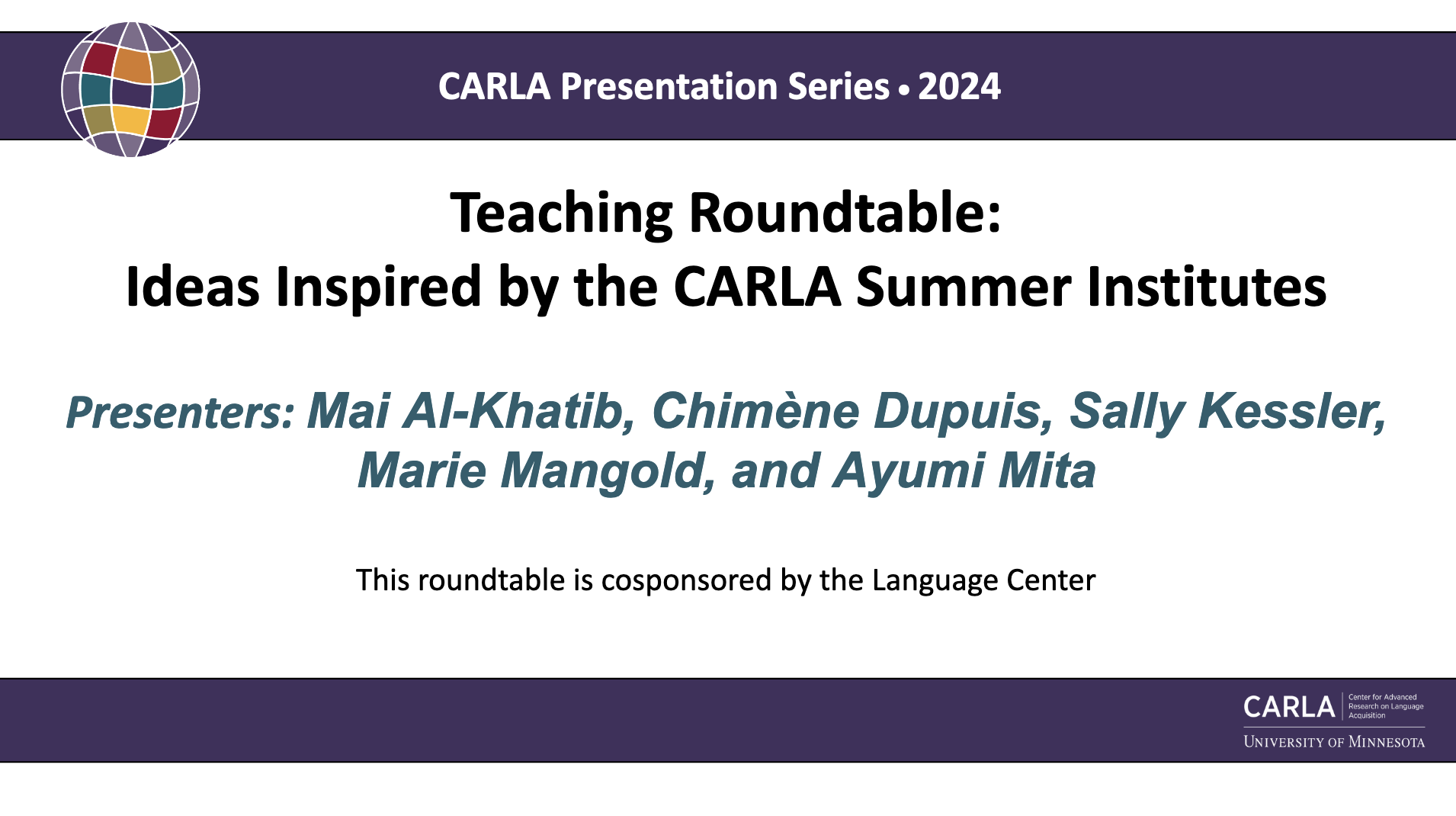
Al-Khatib, M., Dupuis, C., Kessler, S., Mangold, M., & Mita, A. (2024, February 8 ). "Teaching Roundtable: Ideas from the CARLA Summer Institutes."
This roundtable will feature several University of Minnesota language instructors who will share a wide range of practical teaching ideas that they gleaned from taking a CARLA Summer Institute.
Each presenter will give an informal, four-minute presentation about something that inspired them during the institute that they hope to incorporate into their language classroom. After this brief introduction to all of the teaching ideas, attendees will have an opportunity to exchange further ideas with presenters individually or in small groups.
Roundtable Presenters and Titles
Fostering a Classroom Community Cross Pollinates Ideas and Supports RigorThe Teaching Roundtable presenters were recipients of a scholarship offered through the LC/CARLA Summer Institute Scholarship Program for UMN Language Instructors.
Presenter: Mai Al-Khatib, Researcher in the Institute of Linguistics
Summer Institute: Creativity in the Language Classroom
Remodeling Our Curriculum and Lessons Through the Lens of Social Justice
Presenter: Chimène Dupuis, Graduate Instructor of French and Masters
student in the Department of French and Italian
Summer Institute: Teaching Language Through the Lens of Social Justice
Generosity in Authentic Materials for Literacies Acquisition
Presenter: Sally Kessler, Graduate Instructor of French and PhD student in the Department of French and Italian
Summer Institute: Using Target Language Texts to Support Students' Literacies Development
Dispelling Stereotypes and Making it Relevant to Language Learners
Presenter: Marie Mangold, Graduate Instructor of Spanish and PhD candidate in Hispanic Linguistics in the Department of Spanish and Portuguese Studies
Summer Institute: Teaching Language Through the Lens of Social Justice
Fostering Self-Directed Learning: Reimagining Japanese Language Curriculum with Social Justice Standards
Presenter: Ayumi Mita, Senior Lecturer of Japanese in the Department of Asian and Middle Eastern Studies
Summer Institute: Teaching Language Through the Lens of Social Justice
This roundtable and the scholarship program are co-sponsored by the Language Center.
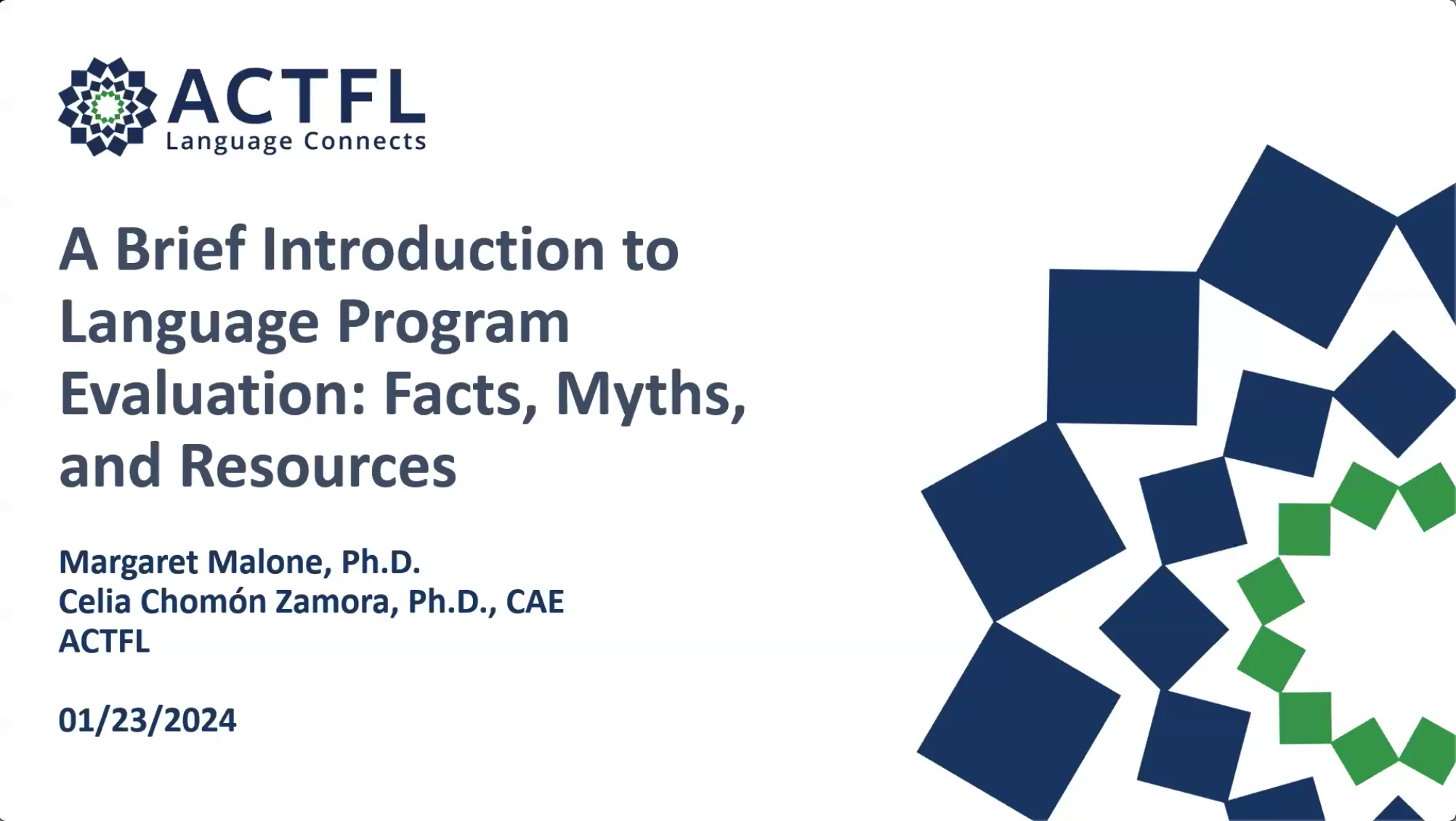
Malone, M., & Chomón Zamora, C. (2024, January 23). "A Brief Introduction to Language Program Evaluation: Facts, Myths, and Resources."
ACTFL-CARLA WEBINAR:
Program evaluation can provide insight into how to maintain, improve, and protect language programs. When undertaking program evaluation, it’s essential to consider the purpose of the program, the motivation for evaluation, and how these will be reconciled in sharing results and planning for change. Moreover, program evaluations can be developed and conducted by external or internal reviewers or a combination of both. At the same time, many administrators and instructors do not understand the nature of program evaluation and how to effectively implement it. This webinar provides a quick overview of how to use program evaluation to explore what works within a program, improve aspects that need support, and demonstrate the value of language programs.
Presenters:
Margaret Malone is Director of Assessment and Research at ACTFL and co-leader of Practical Program Evaluation. She is the former Director of the AELRC and has over 30 years of experience in language education. Dr. Malone is well-versed in program evaluation, survey research, materials development, language test development, and professional development delivered through online and face-to-face platforms.
Celia Chomón Zamora is Director for Professional Learning and Certification at ACTFL and co-leader of Practical Program Evaluation Dr. Zamora has over 15 years of experience as a K-12 language teacher and administrator, an instructor and administrator of postsecondary language courses, and a researcher of heritage language instruction.
This webinar is part of the joint CARLA-ACTFL Practical Program Evaluation initiative. The presenters will serve as instructors for the CARLA Summer Institute Introduction to Practical Program Evaluation for Heritage Language Programs.
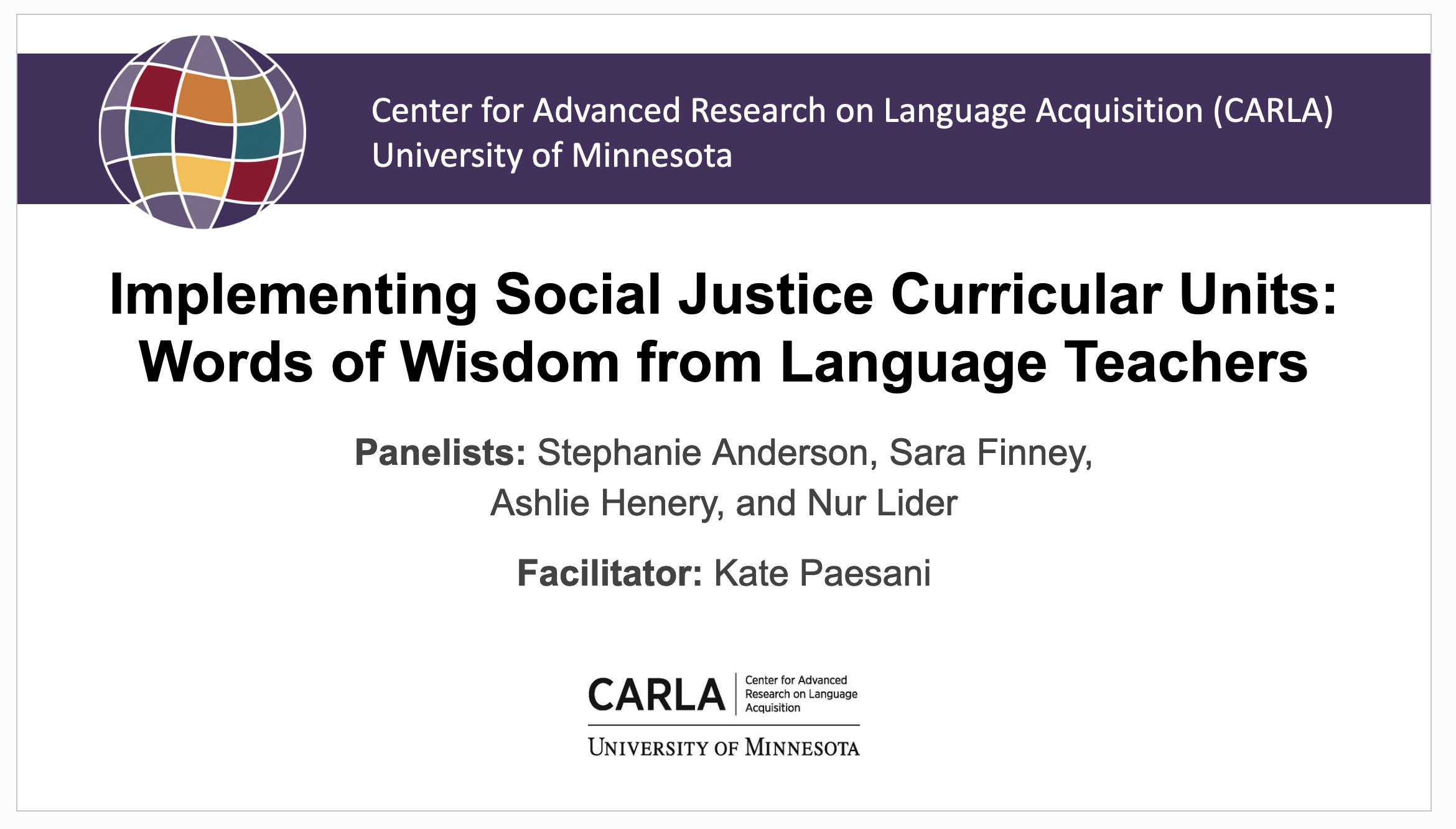
Anderson, S., Finney, S., Henery, A., & Lider, I. (2023, December 7). "Implementing Social Justice Curricular Units: Words of Wisdom from Language Teachers."
SOCIAL JUSTICE WEBINAR:
Learn about social justice curricular units developed by practitioners for intermediate-level language learners in nine languages. In this webinar, curriculum developers from CARLA's Social Justice in Language Education initiative share successes, challenges, and practical advice based upon their experiences developing social justice curricular units and implementing them in their classrooms. The conversation will highlight free resources from the CARLA website that language teachers can download and adapt for their own contexts.
Presenters:
Stephanie Anderson is a Senior Teaching Specialist of Spanish and Portuguese in the Department of Spanish and Portuguese Studies at the University of Minnesota.
Sara Finney is a Senior Lecturer and the Intermediate Spanish Coordinator in the Department of Spanish and Portuguese Studies at the University of Minnesota.
Ashlie Henery is a Lecturer and the Coordinator of First-Year French in the Department of French and Italian at the University of Minnesota.
Ilknur Lider is the Turkish Program Coordinator and Instructor in the Department of Linguistics at the University of Pittsburgh.
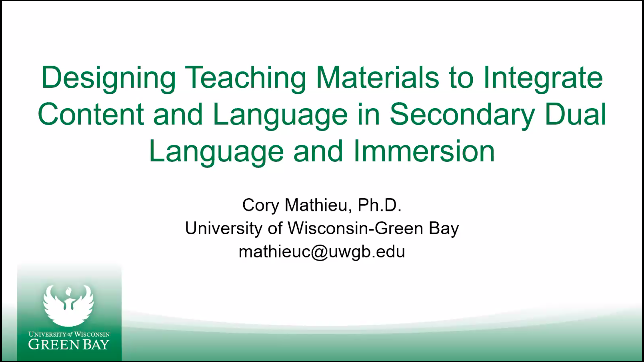
Mathieu, C. (2023, November 9). "Designing Teaching Materials to Integrate Content and Language in Secondary Dual Language and Immersion."
SECONDARY IMMERSION WEBINAR:
Explore how teaching materials can serve as a tool for integrating content and language in your secondary DLI classroom. In this practical webinar, CARLA’s Secondary Dual Language Education initiative leader shares research-based strategies for designing materials to support language instruction within a content-focused DLI class.
Presenter:
Cory Mathieu is an Assistant Professor in the Professional Program in Education at the University of Wisconsin - Green Bay. She developed and co-teaches the CARLA Summer Institute Secondary Dual Language and Immersion: Achieving the Promise of Secondary Continuation Programs.
This CARLA Presentation is cosponsored by the Multilingual Education program in the College of Education and Human Development.

King, K., & Stockman, A. (2023, November 1). "Promoting Greater Equity and Access to Minnesota Seals of Bilingualism."
CARLA INITIATIVE PRESENTATION:
Many U.S. states now offer seals of bilingualism to qualifying high school graduates. While seals are an important official recognition with both symbolic and monetary value (in the form of college tuition credits), access to state seals of bilingualism remains uneven. This presentation provides an overview of efforts to address this gap via CARLA’s Equity and Access to States Seals of Biliteracy initiative. Here we share findings from a 2022-2023 needs analysis with Minnesota world language teachers, coordinators and administrators. These qualitative and quantitative findings inform the current stage of the project: development of multilingual toolkits, promotional materials and assessment supports. This presentation shares these tools as well as challenges in developing them and overviews the next stages of the project.
Presenters:
Kendall King is Professor of Multilingual Education, where she teaches and conducts research on language policy, sociolinguistics and child bilingualism and second language learning. Her recent research (with collaborator Maria Schwedhelm) examines equity and access to state seals of biliteracy. Together, with Ayumi Stockman, she co-directs CARLA’s Equity and Access to States Seals of Biliteracy initiative.
Ayumi Stockman is World Languages Education Specialist at the Minnesota Department of Education. A former World Language Content Specialist at Minneapolis Public Schools, Ayumi has been instrumental in providing guidance to schools and districts in program design, assessments, curriculum development, teacher training, and overseeing the successful implementation of the Minnesota Bilingual Seals Program.
This CARLA Presentation is cosponsored by the Multilingual Education program in the College of Education and Human Development.

Dupuis, C., & Dalola, A. (2023, October 19). "Using TikTok and Instagram Reels to Support Learning Development and Cultural Awareness in Beginning French Courses."
CARLA GRADUATE RESEARCH PROJECT PRESENTATION:
Following research articulating the benefits of social media activities in language learning classrooms, we undertook a project to create an openly accessible database of dynamic media resources in French from TikTok and Instagram. Using a combination of unique intersectional profiles and direct hashtag searches, we searched the platforms for authentic video-based media and organized relevant clips into a thematic database in line with topics covered in beginning French courses. We selected clips for inclusion based on their authenticity and ability to increase learners’ cultural and sociolinguistic awareness of diversity within the francophone world. The video database was designed as an Open Educational Resource (OER), and is freely accessible online to help instructors expand their access to this new genre of interactive media. Subsequent research will examine the efficacy of this media type in helping learners develop cultural and sociolinguistic awareness, pronunciation gains, and communicative proficiency in beginning French courses.
Presenters:
Chimène Dupuis is a graduate student in the Department of French and Italian, at the University of Minnesota. She is an instructor for beginning French courses at UMN and has been working on innovative learning experiences in language classrooms.
Amanda Dalola is Director of the Language Center and Associate Professor of Linguistics at the University of Minnesota. Her current research projects include the production, perception, and digital media renderings of sociophonetic variables and speech styles in French and Korean, the use of social media applications in the language learning classroom, and the use of translanguaging and open educational resources as open educational practices.
This CARLA Presentation is cosponsored by the Language Center and the Institute of Linguistics in the College of Liberal Arts.
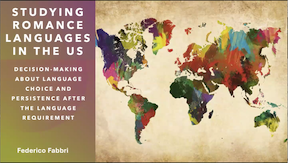
Fabbri, F. (2023, October 5). "Studying Romance Languages in the US: Decision-Making in Regard to Language Choice and Persistence after the Language Requirement."
This presentation focuses on a study aiming to address the longstanding crisis of enrollments and retention in US-based language programs. Focused on the four most commonly taught Romance languages—French, Italian, Portuguese, and Spanish—the study investigated key factors leading U.S. undergraduates to choose these languages at the university level. Further, the study examined salient reasons in their decision to continue or quit language study upon fulfillment of the language requirement, also proposing a number of initiatives for language programs to improve their enrollment numbers and retention rates.
Presenter:
Federico Fabbri is the Director of Language Instruction in Italian at the University of Minnesota. A recent graduate in the doctoral program in Second Language Acquisition and Teaching (SLAT) at the University of Arizona, his main interests are in Language Program Administration, particularly Curriculum Design and Materials Development; he is also involved in research projects on L2 Enrollment and Retention, Open Educational Resources, and L2 Autoethnography.
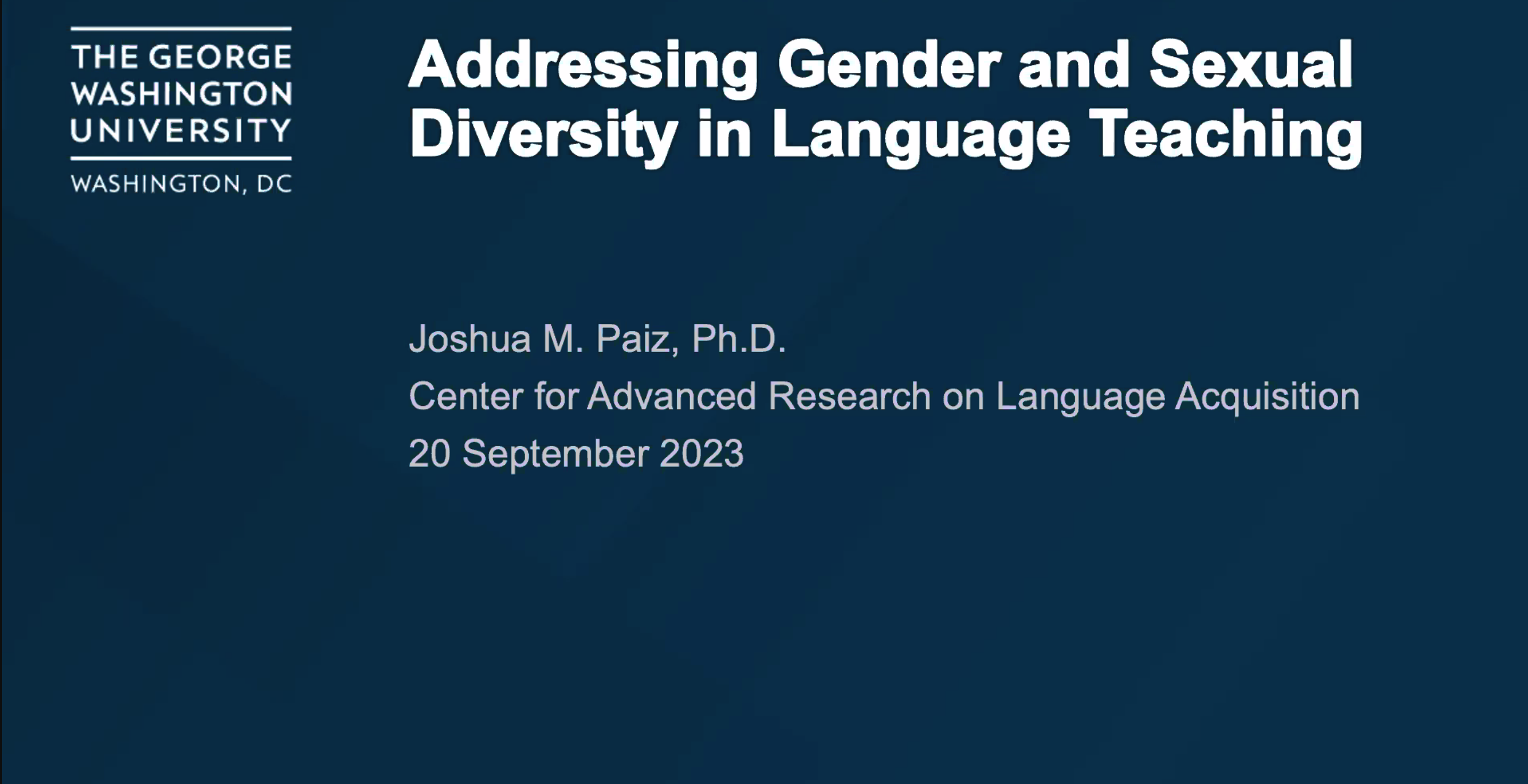
Paiz, J. M. (2023, September 20). "Addressing Gender and Sexual Diversity in Language Teaching."
SOCIAL JUSTICE WEBINAR:
This webinar introduces participants to the growing subfield of Lavender (or Queer) Applied Linguistics and its implications for language education. Drawing on a diverse body of interdisciplinary research, the presenter provides participants with a broad overview of recent work and then describe a pedagogical framework that can be applied in part or in whole to diverse educational contexts. The presenter concludes with advice for how to negotiate LGBTQ+ inclusion with various stakeholders in the educational process from students to self to administrators.
Presenter:
Joshua M. Paiz is a Teaching Assistant Professor of English for Academic Purposes (EAP) at George Washington University and a Teacher Educator in the TESOL Institutes of Montgomery College and the Community College of Baltimore County. His scholarship has focused on addressing LGBTQ+ issues in English language teaching, exploring the intersections of queer theory and World Englishes, and Artificial Intelligence and Natural Language Processing in Applied Linguistics.
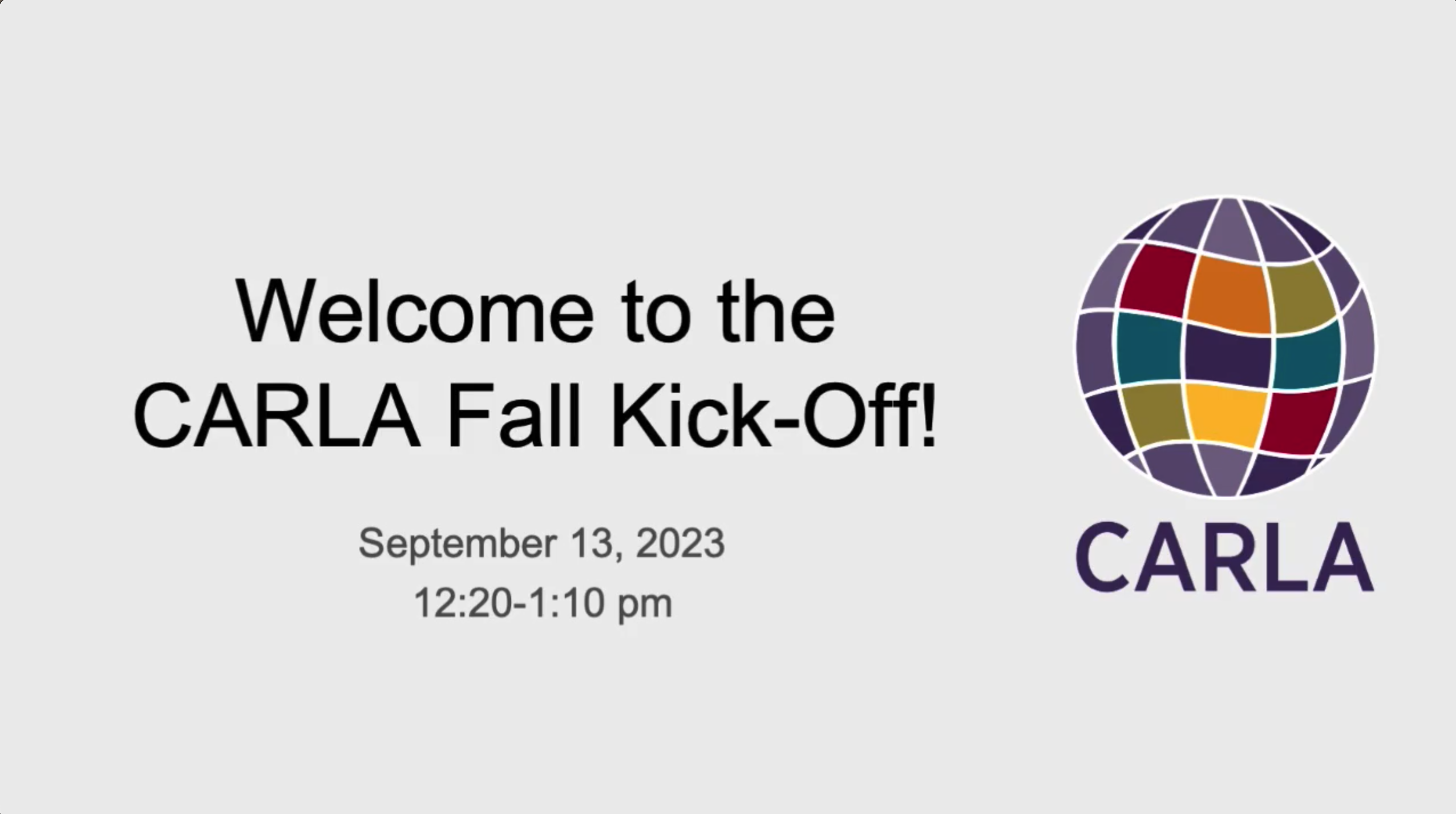
CARLA. (2023, September 13). "CARLA Fall Kick-Off Event."
The annual fall kick-off event for the Center for Advanced Research on Language Acquisition (CARLA) highlighted CARLA’s current initiatives with plans for the coming year. Atendees also found out how to get involved with the Center through the CARLA Fellows Program, CARLA Presentation series, CARLA/LC Summer Institute scholarship program, and more.
Presenters:
Martha Bigelow is a Professor of Multilingual Education and is the Chair of the Department of Curriculum and Instruction. She is a co-chair of the Language Teacher Education conference to be held in May 2024.
Kendall King is a Professor of Multilingual Education in the Department of Curriculum and Instruction. She is a co-leader of the Equity & Access to State Seals of Biliteracy initiative.
Karin Larson is the Executive Assistant Director of the Center for Advanced Research on Language Acquisition (CARLA).
Mandy Menke is an Associate Professor of Hispanic Linguistics in the Department of Spanish and Portuguese Studies. She is a co-leader of the Literacies in Language Education and Social Justice in Language Education initiatives.
Kate Paesani is the Director of CARLA and an Associate Professor in the Department of French and Italian. She is a co-leader of the Language Program Direction, Literacies in Language Education and Social Justice in Language Education initiatives, and is a co-chair of the Language Teacher Education conference.
2022-2023
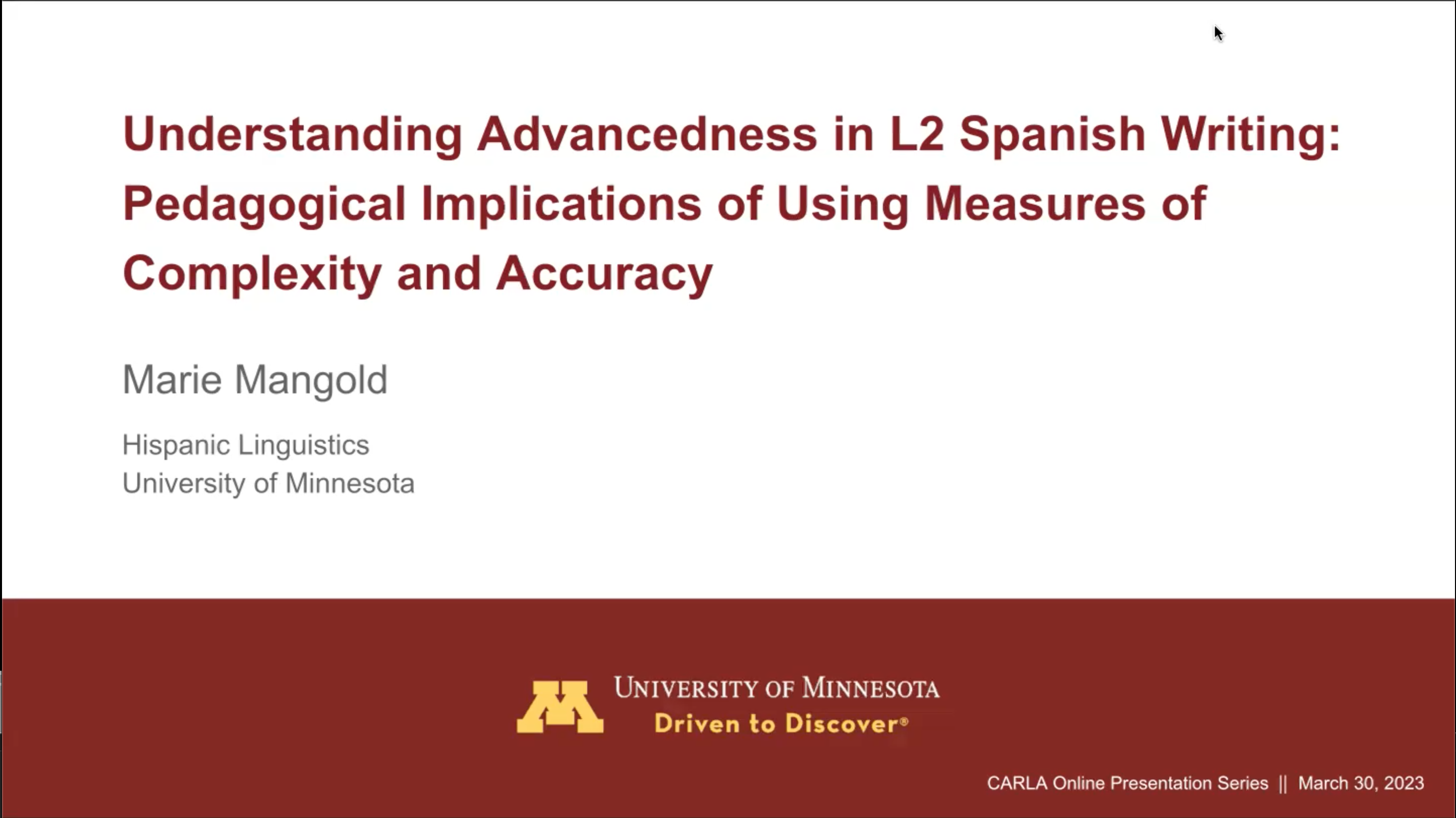
Mangold, M. (2023, March 30). "Understanding Advancedness in L2 Spanish Writing: Pedagogical Implications of Using Measures of Complexity and Accuracy."
CARLA FELLOW PRESENTATION:
This project compares the writing of L2 learners of Spanish at different proficiency levels in order to identify linguistic features unique to the Advanced level. Forty writing samples from ACTFL's Writing Proficiency Test (WPT) comprise the data of this project; 20 from the Intermediate-High proficiency level and 20 from the Advanced-Low. Measures of complexity (lexical and syntactic) and accuracy were used to analyze the written texts. Results reveal implications for the L2 Spanish classroom and what advancedness entails in L2 learners.
Presenter:
Marie Mangold is a PhD student in Hispanic Linguistics in the Department of Spanish and Portuguese Studies where she teaches undergraduate Spanish courses. Her research interests include second language acquisition and pedagogy, language teacher preparation and certification, curriculum analysis and design, and language assessment. She was selected to be a CARLA Fellow for 2022–2023.
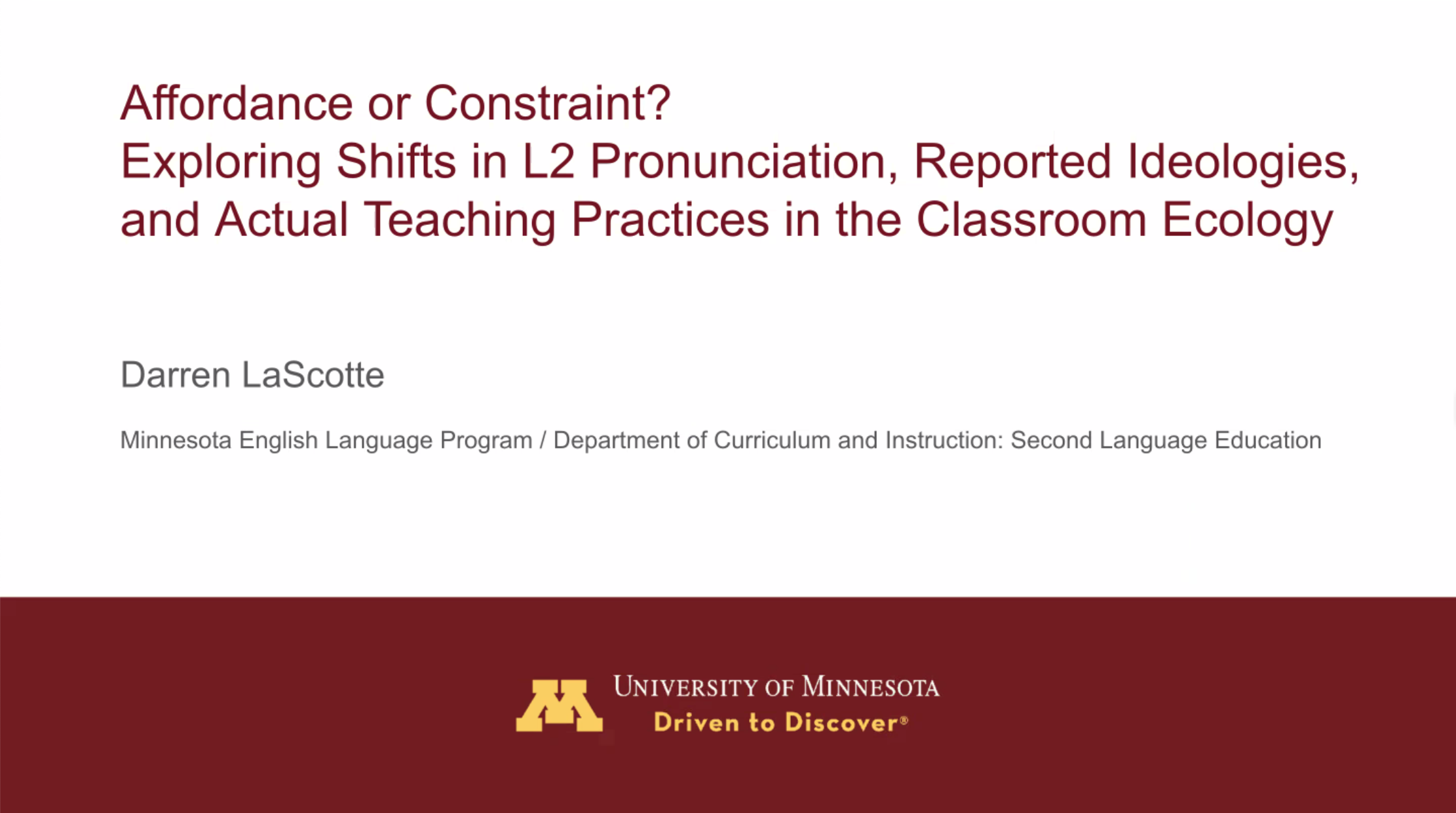
LaScotte, D. (2023, March 15). “Affordance or Constraint? Exploring Shifts in L2 Pronunciation, Reported Ideologies, and Actual Teaching Practices in the Classroom Ecology.”
CARLA FELLOW PRESENTATION:
Applying an ecological approach to classroom-based research (Guerrettaz & Johnston, 2013; van Lier, 2004), this study investigates the impact of International Teaching Assistant (ITA) programs on students’ reported ideologies and English pronunciation patterns, and the extent to which these students transfer what they had learned from their ITA course to their actual teaching contexts. A multi-method case study design is used to explore how ITAs describe their teaching ideologies and the impact of the ITA program, as well as the extent to which these ideologies and demonstrated changes in L2 English pronunciation are evident in their actual instructional contexts.
Presenter:
Darren LaScotte is a PhD candidate in Second Language Education in the Department of Curriculum and Instruction and a Teaching Specialist in the Minnesota English Language Program. Within the broader scope of applied linguistics, his research focuses on second language acquisition and use, and on the resulting implications for teaching and learning. He was selected to be a CARLA Fellow for 2022–2023.
This presentation is cosponsored by the Second Language Education program in the Department of Curriculum and Instruction.
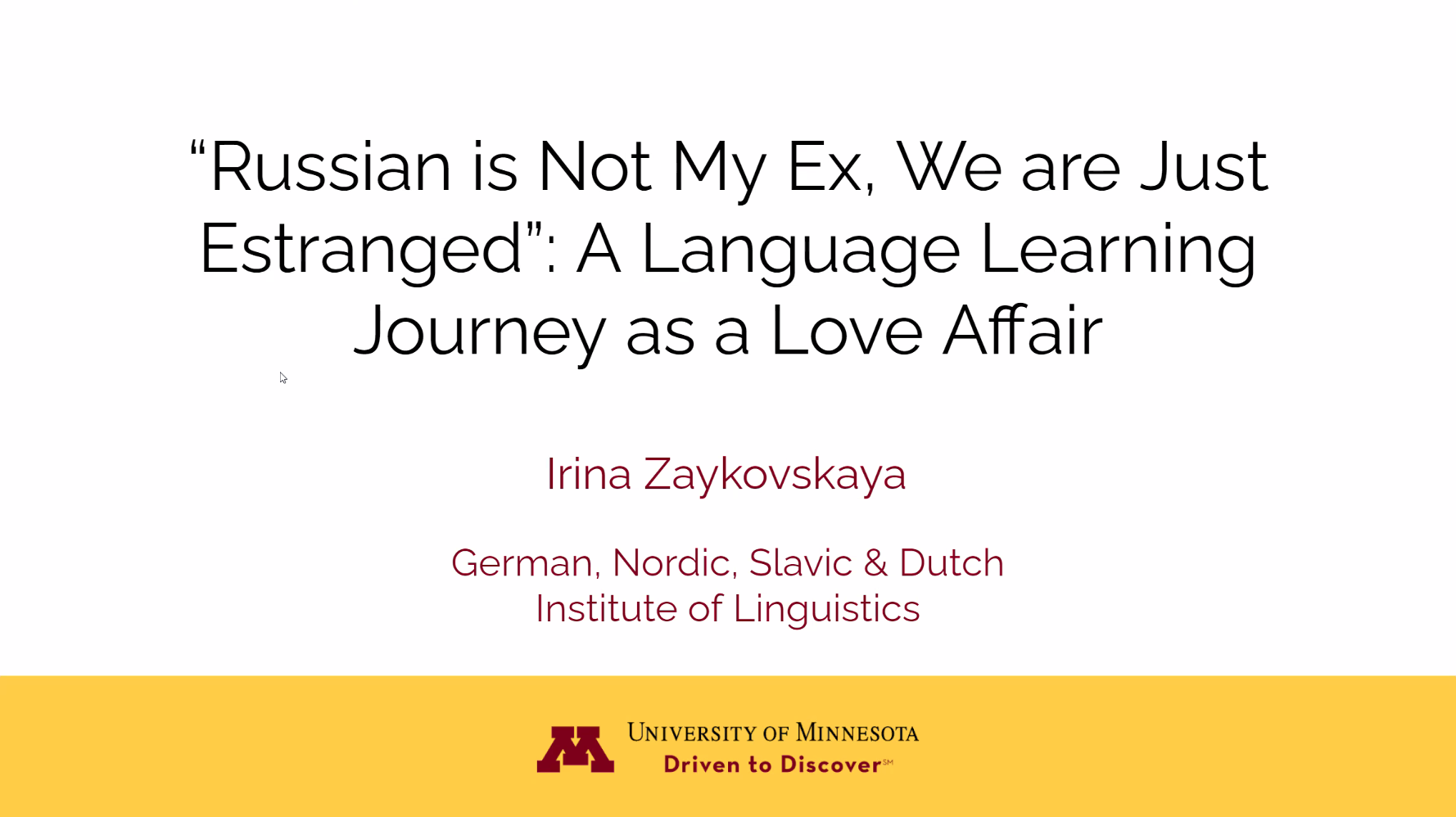
Zaykovskaya, I. (2023, February 15). “'Russian is Not My Ex, We are Just Estranged': A Language Learning Journey as a Love Affair.”
The idea of language learning as identity construction, a process engaging one's mind, body, and emotions, has been consistently theorized and explored by researchers since the early 2000s (e.g., Block 2007; Kramsch 2009; Pavlenko 2005), and empirical studies focusing on the emotional aspect of language learning are increasing in number. This talk presents the results of a longitudinal (2015–2020) case study of one Russian language learner's journey. During the study, Alyosha, the main participant, graduated from a university with a major in Russian, went to law school, and eventually became a history teacher. The data include multiple interviews, social media feeds, journal entries, notes, class assignments, poetry, and photos that together document language learning in a university classroom, a study abroad trip, and postgraduate studies, and capture the pivotal moments of the process. Using a narrative approach and following the participant’s view of his Russian learning, Zaykovskaya tells a story of a love affair, from the moment of falling in love with learning Russian to the eventual separation, when the participant had to discontinue his studies due to personal reasons, and discuss the impact that it had, and continues to have, on his life.
Presenter:
Irina Zaykovskaya is a Lecturer at the Department of German, Nordic, Slavic, and Dutch at the University of Minnesota where she teaches Russian and World Englishes. Her areas of expertise are second language learning and language ideologies, and she studies how beliefs and attitudes affect one’s language learning journey.
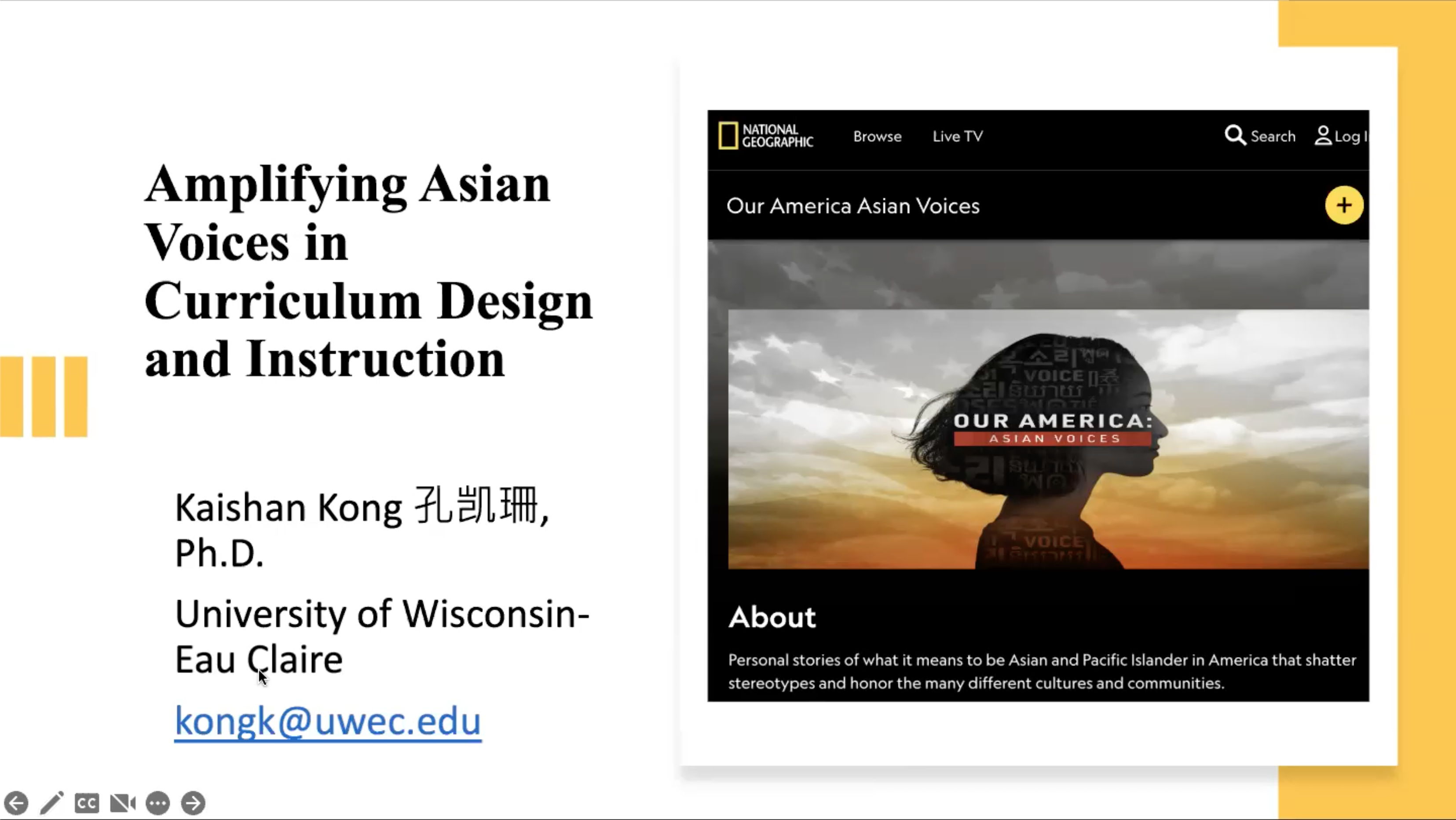
Kong, K. (2023, February 9). SOCIAL JUSTICE WEBINAR: “Amplifying Asian Voices in Curriculum Design and Instruction.”
This webinar introduces the topic of integrating Asian Voices into world language education. The presenter begins with some research findings from a recent publication on teaching for social justice in Chinese language education and then describes a framework to inspire world language teachers to consider when and how to amplify Asian Voices in curriculum design and instruction. The webinar ends with some suggestions for educators to continue diversifying Asian Voices in the landscape of world language education.
Presenter:
Kaishan Kong is an Associate Professor of Chinese at the University of Wisconsin-Eau Claire. For over ten years, she has taught a course focused on culture as part of the STARTALK program and CARLA Summer Institute program. She was recognized as a Wisconsin Teaching Fellow in 2015 and a Fulbright Scholar in 2020.
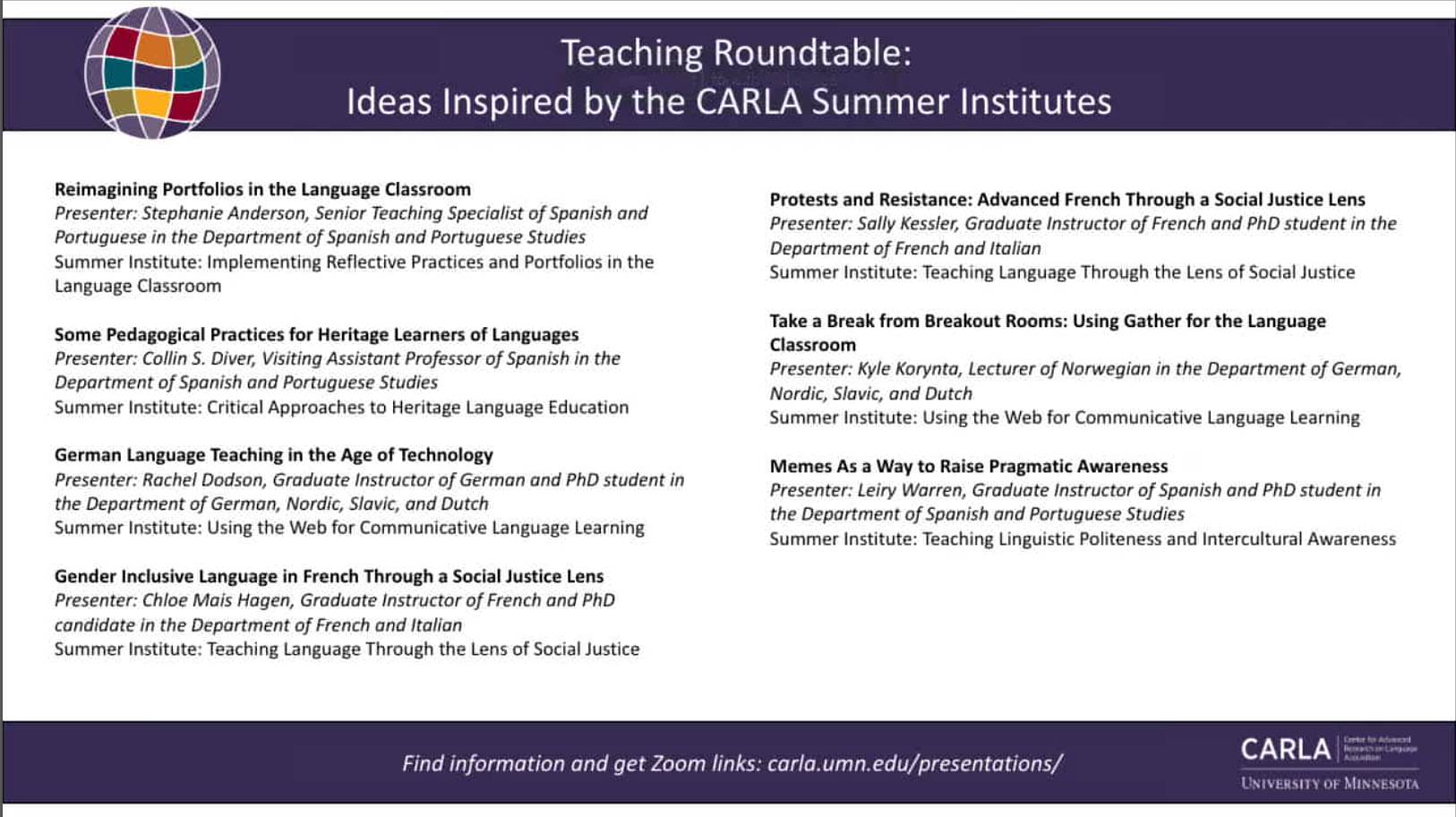
Anderson, S., Dodson, R., Hagen, C., Kessler, S., Korynta, K., & Warren, L. (2023, February 2). “Teaching Roundtable: Ideas from the CARLA Summer Institutes.”
This roundtable features six University of Minnesota language instructors who showcase a wide range of practical teaching ideas that they gleaned from taking a CARLA Summer Institute.
Each presenter gives an informal, three-minute presentation about something that inspired them during the institute that they hope to incorporate into their language classroom.
Roundtable Presenters:
Reimagining Portfolios in the Language Classroom
Stephanie Anderson, Senior Teaching Specialist of Spanish and Portuguese in the Department of Spanish and Portuguese Studies
Summer Institute Attended: Implementing Reflective Practices and Portfolios in the Language Classroom
Some Pedagogical Practices for Heritage Learners of Languages
Collin S. Diver, Visiting Assistant Professor of Spanish in the Department of Spanish and Portuguese Studies
Summer Institute Attended: Critical Approaches to Heritage Language EducationGerman Language Teaching in the Age of Technology
Rachel Dodson, Graduate Instructor of German and PhD student in the Department of German, Nordic, Slavic, and Dutch
Summer Institute Attended: Using the Web for Communicative Language LearningGender Inclusive Language in French Through a Social Justice Lens
Chloe Mais Hagen, Adjunct French Instructor, St. Olaf College
Summer Institute Attended: Teaching Language Through the Lens of Social Justice
Protests and Resistance: Advanced French Through a Social Justice Lens
Sally Kessler, Graduate Instructor of French and PhD student in the Department of French and Italian
Summer Institute Attended: Teaching Language Through the Lens of Social JusticeTake a Break from Breakout Rooms: Using Gather for the Language Classroom
Kyle Korynta, Lecturer of Norwegian in the Department of German, Nordic, Slavic, and Dutch
Summer Institute Attended: Using the Web for Communicative Language Learning
Memes As a Way to Raise Pragmatic Awareness
Leiry Warren, Graduate Instructor of Spanish and PhD student in the Department of Spanish and Portuguese Studies
Summer Institute Attended: Teaching Linguistic Politeness and Intercultural Awareness
The Roundtable presenters were recipients of a scholarship offered through a special partnership between the University of Minnesota's Language Center and CARLA. The CARLA Summer Institute Scholarship Program for UMN P&A Language Instructors and Graduate Students was created to support professional development for University of Minnesota language instructors through the CARLA Summer Institute program.
This presentation was co-sponsored by the Language Center.
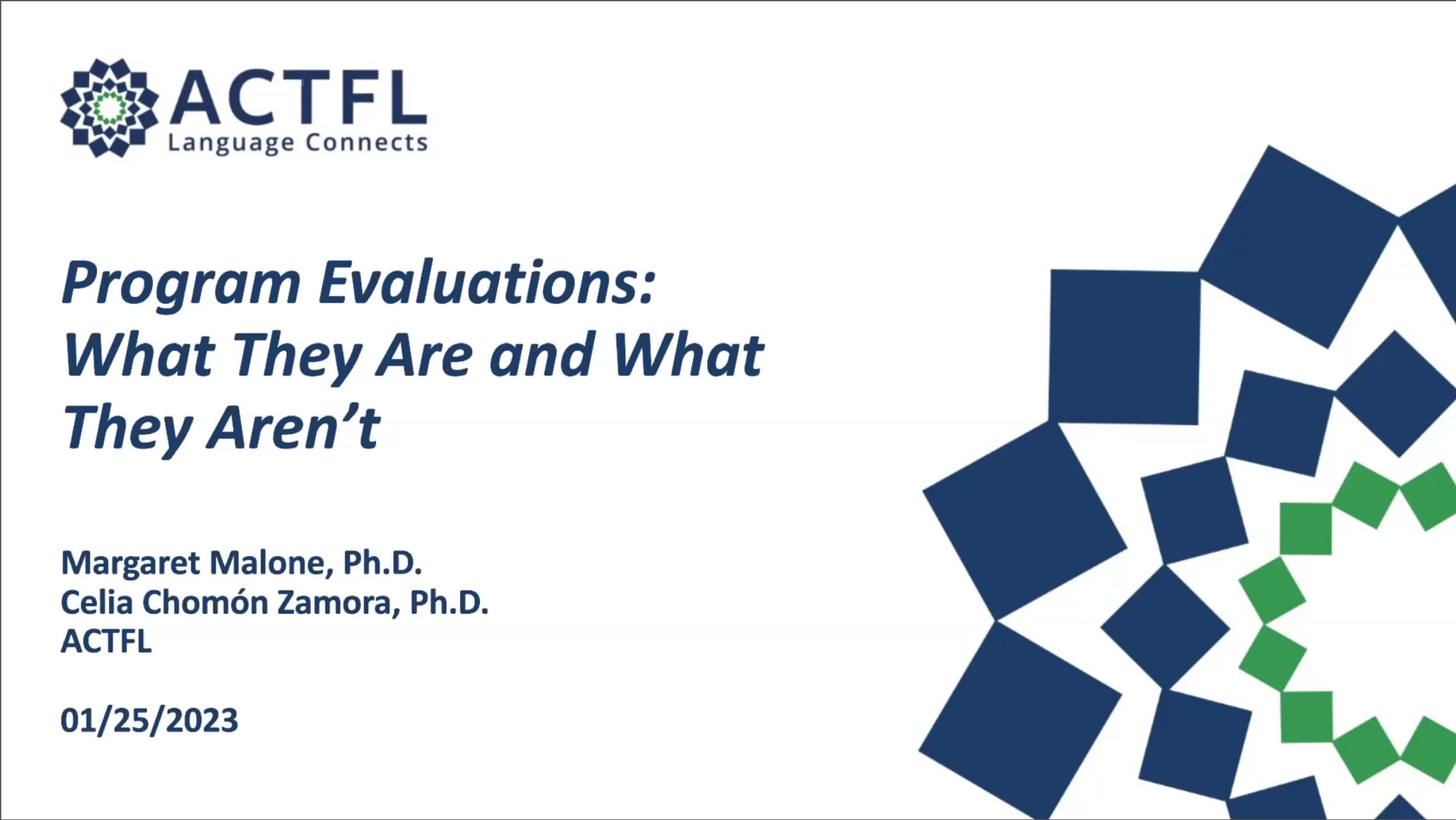
Malone, M., & Chomón Zamora, C. (2023, January 25). “Program Evaluations: What They Are and What They Aren’t.”
CARLA-ACTFL WEBINAR:
Evaluation is critical to understanding the outcomes of language programs. In conducting evaluation, it is important to take a comprehensive approach that considers the needs of learners and teachers, the requirements and capacities of administrators, parents and other stakeholders, the values of the discipline and the contributions of the program to society, locally, nationally and internationally. However, many instructors mistake evaluations as opportunities to eliminate programs or evaluate the performances of individual instructors. Join us as we provide an overview of why program evaluations are crucial to the longevity and success of language programs, and combat myths of what they are NOT.
This webinar is part of the joint CARLA-ACTFL initiative on Practical Program Evaluation. The presenters are instructors for the CARLA Summer Institute Practical Program Evaluation for Instructors of Less Commonly Taught Languages.
Presenters:
Margaret Malone is Director of Assessment and Research at ACTFL, and co-leader of Practical Program Evaluation. She is the former Director of the AELRC and has over 30 years of experience in language education. Dr. Malone is well-versed in program evaluation, survey research, materials development, language test development, and professional development delivered through online and face-to-face platforms.
Celia Chomón Zamora is Director for Professional Learning and Certification at ACTFL and co-leader of Practical Program Evaluation. Dr. Zamora has over 15 years of experience as a K-12 language teacher and administrator, an instructor and administrator of postsecondary language courses, and a researcher of heritage language instruction.
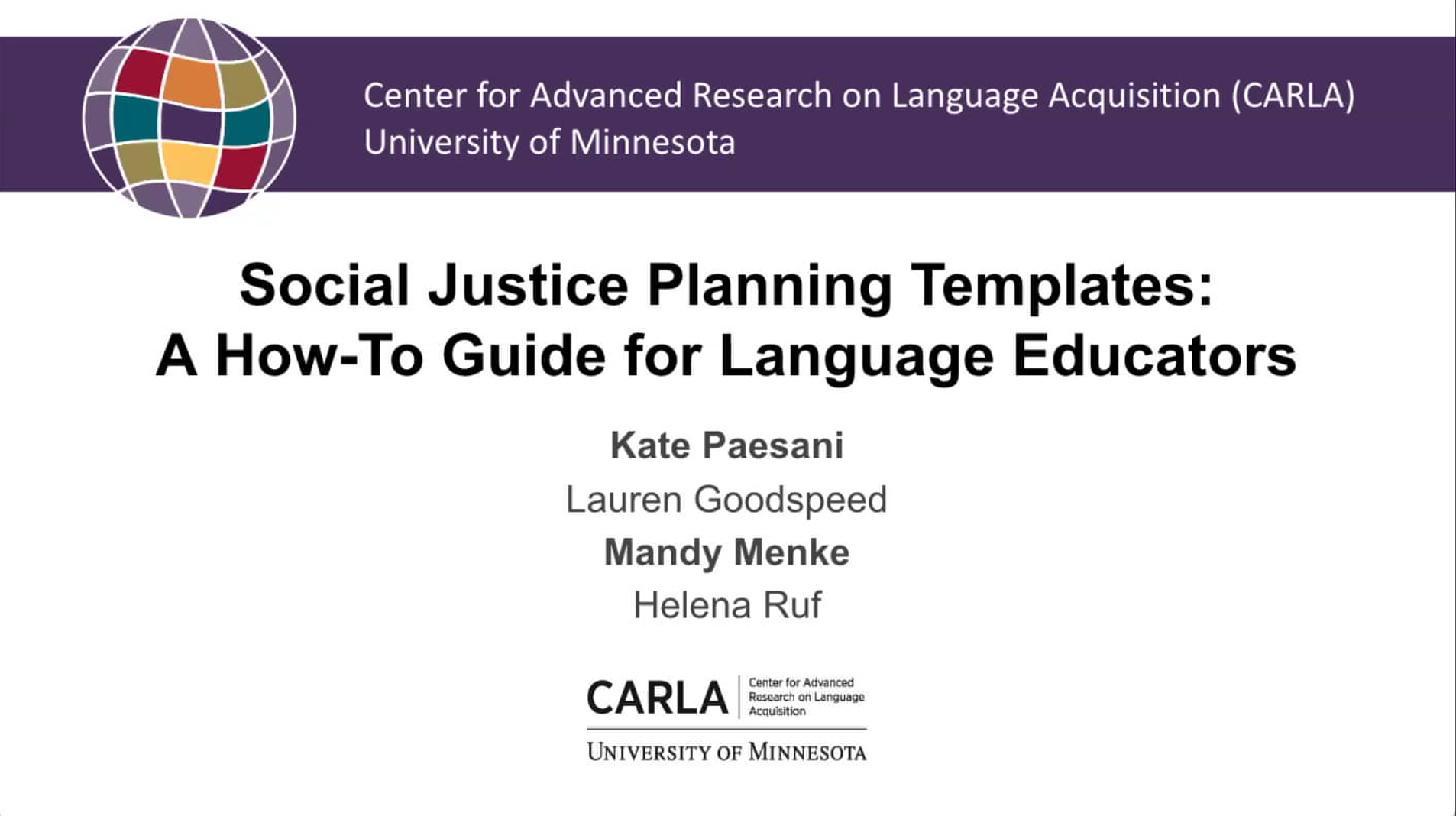
Menke, M., & Paesani, K (2022, December 7). “Social Justice Planning Templates: A How-to Guide for Language Educators.”
Discover how to use instructional planning templates created to support the integration of social justice themes into language classes. In this practical webinar, CARLA’s Social Justice in Language Education initiative leaders share unit, lesson plan, and summative assessment templates along with their accompanying user’s guides, and discuss how to use and adapt them to fit the needs of language teachers and students alike.
Presenters:
Mandy Menke
is an Associate Professor of Hispanic Linguistics and the Director of Language Programs for the Department of Spanish & Portuguese Studies. She is a co-leader of the LRC initiative Social Justice in Language Education.
Kate Paesani is the Director of the Center for Advanced Research on Language Acquisition (CARLA) and an Associate Professor in the Department of French and Italian. She is a co-leader of the LRC initiative Social Justice in Language Education.
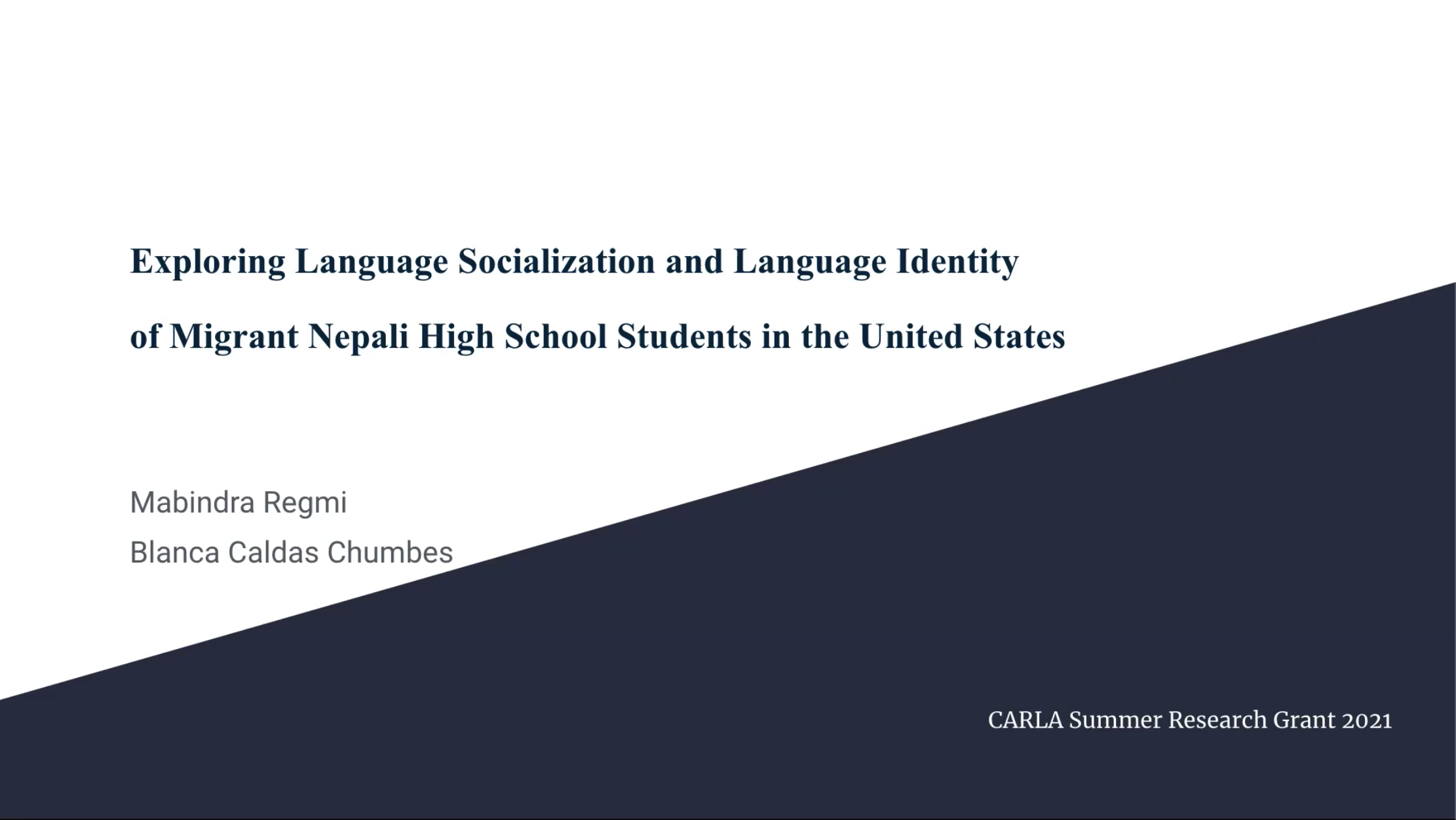
Regmi, M. (2022, November 30). “Exploring Language Socialization and Language Identity of Migrant Nepali High School Students in the United States.”
Nepali migrant students often experience language and identity shifts as they negotiate their sense of self within their new cultural and linguistic landscape in the United States. This presentation explores the results of a research study looking at ways in which how Nepali migrant students perceive their initial experiences of the English language at schools in their new country. It also showcases how these students explain their relationship with their heritage language and the shifts that they have experienced. The findings of this study highlight how such experiences shape how they perceive their identities.
Presenters:
Mabindra Regmi is a PhD student of Second Language Education in the Department of Curriculum and Instruction at the University of Minnesota. He is interested in exploring the language socialization of the Nepali migrant community in the United States.
Blanca Caldas Chumbes is an Associate Professor in Second Language Education and Elementary Education in the Department of Curriculum and Instruction at the University of Minnesota. Her areas of interest are bilingual education, minoritized language practices and pedagogies, critical pedagogy, critical discourse analysis, and critical (performance) ethnography.
This presentation is cosponsored by the Second Language Education program in the College of Education and Human Development.
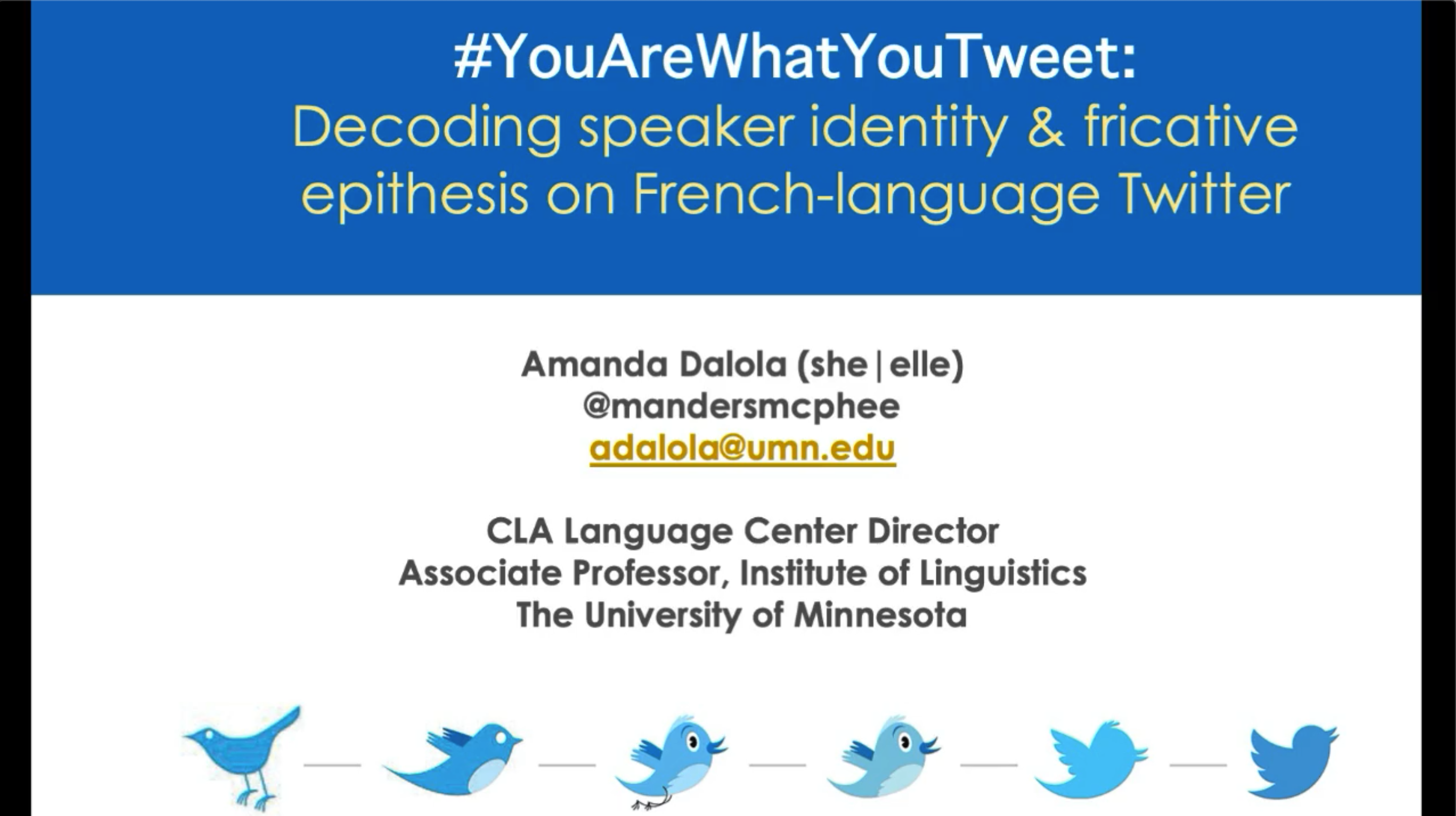
Dalola, A. (2022, November 9). “#YouAreWhatYouTweet: Decoding Speaker Identity & Fricative Epithesis on French-Language Twitter.”
Phrase-final fricative epithesis (PFFE) is a sociophonetic phenomenon in Continental French (=from France) in which utterance-final vowels lose their voicing and give way to intense fricative-like whistles, e.g., mais oui_hhh (Fónagy, 1989). Although readily observed in the speech of both native speakers and second-language learners, the variable’s percepts remain somewhat elusive. This study uses a matched-guise task to establish PFFE’s perceptual values among native and second-language French speakers and determines what sociolinguistic characteristics of the listener influence these perceptions. The findings are then compared to a 2060-token Twitter corpus of PFFE occurrences to illustrate the ways in which the variable’s life on Twitter both corroborates previous perception findings and provides evidence of a more iconic, more structurally permissive life on Twitter, conditioned by the creative digital vernacular writing style popular to the medium. Suggestions are offered for raising language learners’ awareness of and competence in decoding sociophonetic phenomena, particularly those with complex multimodal behaviors.
Presenter:
Amanda Dalola is director of the Language Center and associate professor of Linguistics at the University of Minnesota. Her current research projects include the production, perception, and digital media renderings of sociophonetic variables and speech styles in French and Korean, the use of social media applications in the language learning classroom, and the use of translanguaging and open educational resources as open educational practices.
This presentation is cosponsored by the Language Center and the Institute of Linguistics.
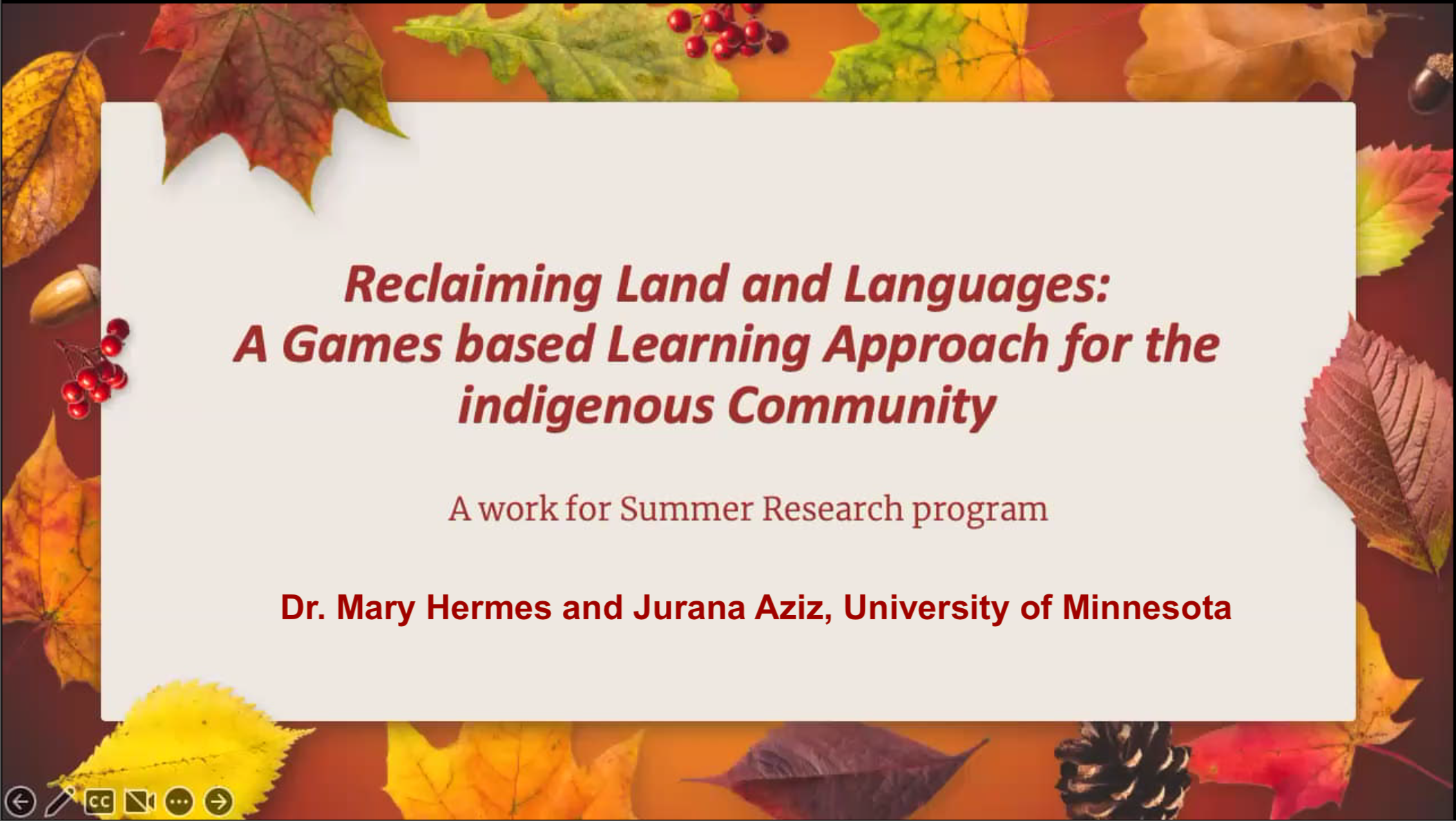
Aziz, J. (2022, October 27). “Reclaiming Land and Languages: A Games-Based Learning Approach for the Indigenous Community.”
Drawing from the indigenous reclamation research, decolonized literature, and cultural ecology for indigenous people, this research seeks to understand the indigenous community-based game design approaches to reclaim relationships with land and languages. The study examined games as pedagogies for the Ojibwe learners through multimodal language learning strategies while advocating for community-based participatory research to restore relationships with the indigenous community. Based on this approach, the researchers explored how a games-based approach fosters reclaiming Ojibwe relationships between land and language learning that connects the humans with the more-than-humans.
Research results provide suggestions for the indigenous community to adopt multimodal approaches in learning to reduce gaps in reclaiming relationships. The study also offers a framework for indigenous knowledge development through games that engages the elements of the land that can be helpful to those who need to observe the possibilities of such connections and for future educators to rethink games-based pedagogies as a way of bridging land with language.
Presenters:
Jurana Aziz is a PhD student of Second Language Education in the Department of Curriculum and Instruction at the University of Minnesota focused on indigenous language revitalization and cultural inclusion in language education. She previously worked as a researcher for the indigenous Sadri community in Bangladesh.
Mary "Fong" Hermes is Professor of Second Language Education in the Department of Curriculum and Instruction at the University of Minnesota. For over 25 years she has been involved in the Ojibwe language reclamation movement and her research encompasses the indigenous language revitalization to connect land with languages.
This presentation is cosponsored by the Second Language Education program in the College of Education and Human Development.
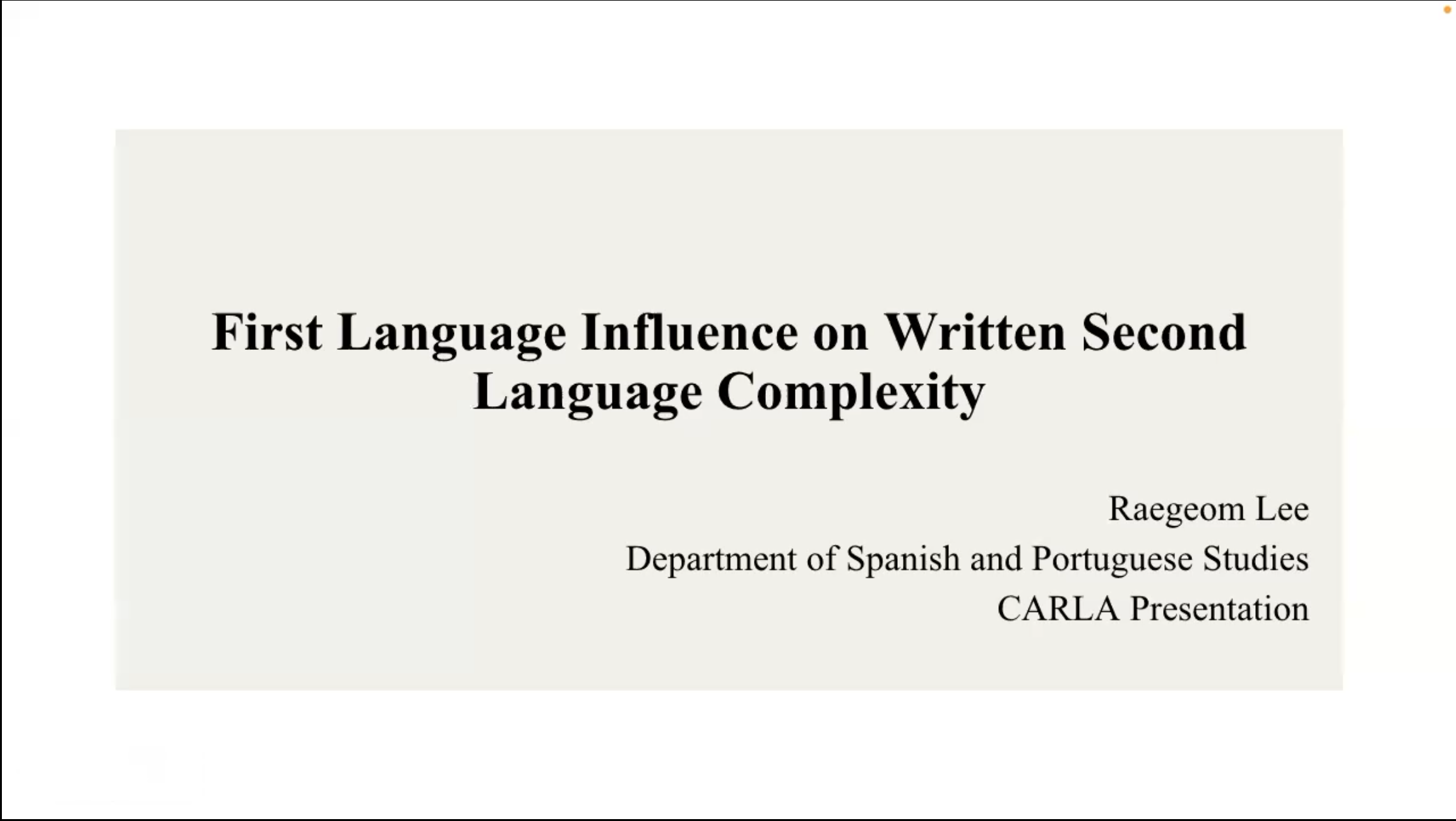
Lee, R. (2022, October 13). "First Language Influence on Written Second Language Complexity."
To use language like a native speaker requires the ability to connect and expand sentences with more sophisticated and complex syntactic structure (Housen, Kuiken & Vedder 2020). An emerging body of work has suggested that typological differences influence the development of L2 syntactic complexity (e.g., Kuiken & Vedder, 2019; Ströbel et al., 2020; Vercellotti, 2019). Examples of these typological differences between L1 and L2 include verbal and nominal complexity in a number of morphosyntactic constructions.
This study seeks to expand on this work and further probe the influence of the first language on the development of the second by examining the L2 Spanish of L1 Korean and L1 English speakers. The research questions include: Does the syntactic complexity of learners of the same proficiency level differ according to the L1? If so, how? This study contributes to the research base on syntactic complexity as an index of L2 development and responds to calls to expand study populations in L2 Spanish research beyond native English speakers (e.g., Long & Geeslin, 2018). Findings further suggest that differences in L2 Spanish development among L1 speakers of different languages should be considered when planning instruction.
Presenter:
Raegeom Lee is a PhD student of Hispanic Linguistics in the Department of Spanish and Portuguese at the University of Minnesota. Her specialization is in Applied Linguistics and Second Language Acquisition (SLA). Specifically, she is very interested in the perception of verbal irony in advanced-level SLA.
This presentation is cosponsored by the Department of Spanish and Portuguese Studies in the College of Liberal Arts.
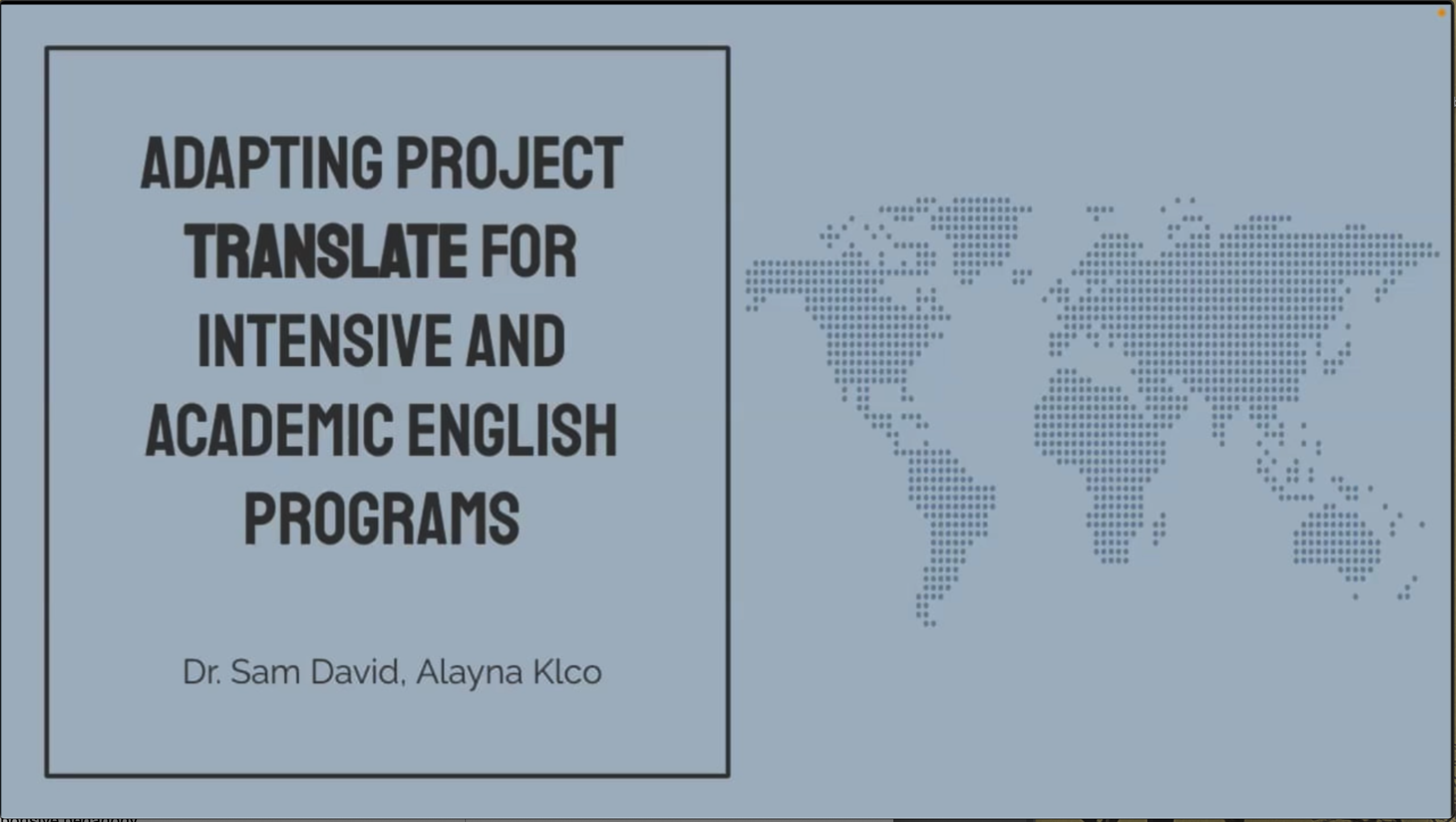
David, S. & Klco, A. (2022, September 28). "Adapting Project TRANSLATE for Intensive English Programs."
This research study explores the role of translanguaging and pedagogical translation in postsecondary Intensive English Program (IEP) programs. Over several focus group sessions, IEP instructors discussed TRANSLATE, a collaborative translation pedagogy currently studied in middle-grade content classrooms, and how its purpose and instructional implementation may be adapted for use in their postsecondary teaching context. This analysis is grounded in constant comparative methodology (Krueger, 2014) and examines instructors’ sense-making process of translanguaging and the TRANSLATE protocol as well as how collaborative translation may contribute to or constrain the attainment of pedagogical objectives. This presentation will share professional learnings from the focus groups and demonstrations of how students’ home languages can be used to engage multilingual students in the postsecondary Intensive English Program learning context.
Presenters:
Sam David is Assistant Professor of Second Language Education in the Department of Curriculum and Instruction at the University of Minnesota and Co-PI on Project TRANSLATE. His research focuses on literacy development of emergent bilingual students and teacher learning about translanguaging and culturally responsive pedagogy.
Alayna Klco is an MA TESOL graduate student in the Department of Curriculum and Instruction at the University of Minnesota. She has been teaching adults in community English programs and IEPs for five years and is currently a research assistant with Project TRANSLATE.
This presentation is cosponsored by the Second Language Education program in the College of Education and Human Development.
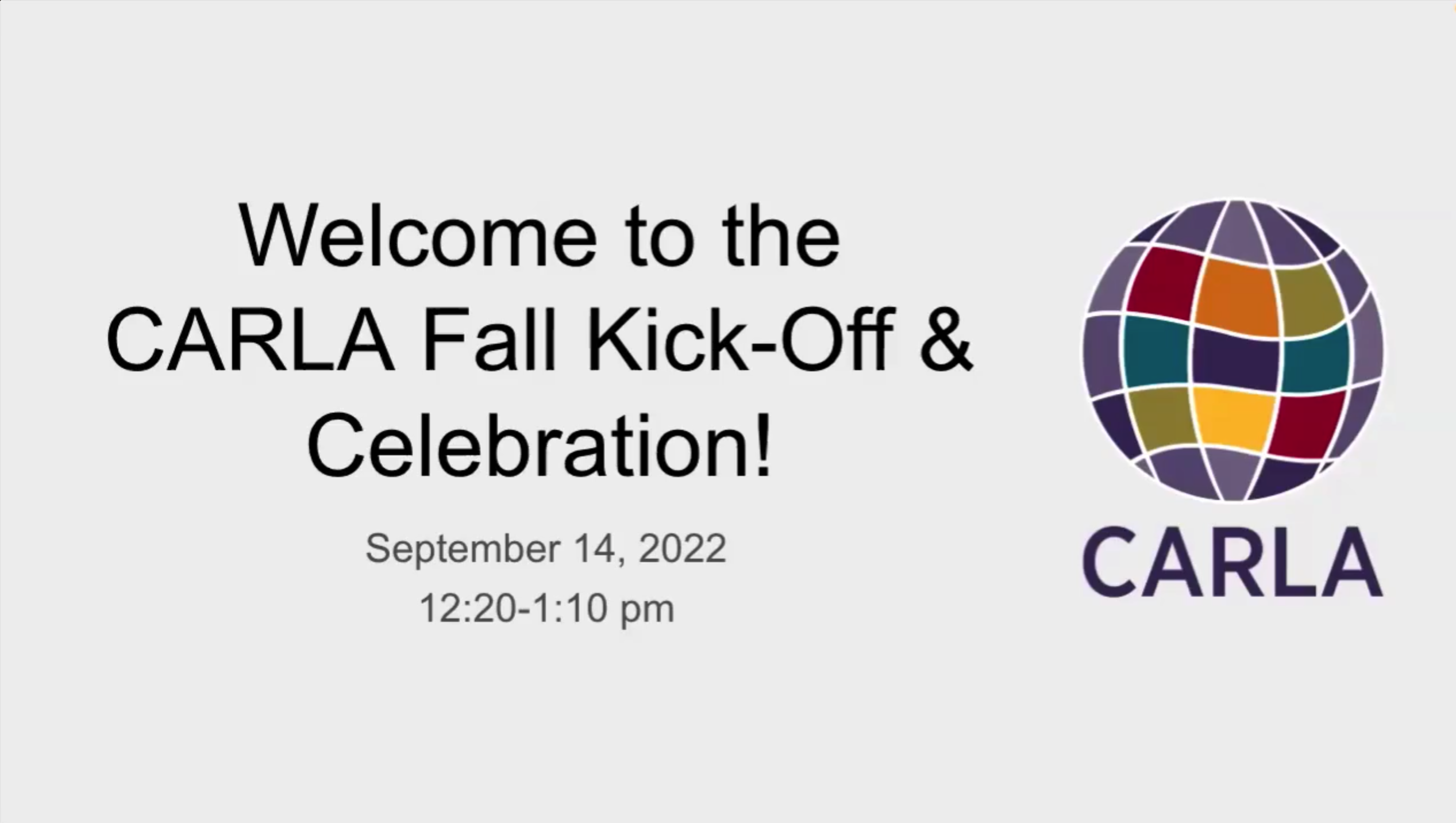
CARLA. (2022, September 14). "CARLA Fall Kick-Off and Celebration."
This presentation was for a special fall kick-off for the Center for Advanced Research on Language Acquisition (CARLA) to help us celebrate our recent Language Resource Center (LRC) grant award. Learn about the seven new LRC initiatives and how they fit into CARLA’s current and past work of improving language teaching and learning. Attendees also learned how to get involved with the Center through the CARLA Fellows Program, workshops and presentations, CARLA/LC Summer Institute scholarship program, and more.
Presenters:
Lauren Goodspeed is a Lecturer in the Department of French and Italian and Director of the French Language Program. She is a co-leader of the LRC initiative: Social Justice in Language Education.
Kendall King is a Professor in the Department of Curriculum and Instruction and is the co-leader of the LRC initiative: Equity & Access to State Seals of Biliteracy.
Kate Paesani is the Director of the Center for Advanced Research on Language Acquisition (CARLA) and an Associate Professor in the Department of French and Italian.
Helena Ruf is a Senior Lecturer and Director of Language Instruction in the Department of German, Nordic, Slavic and Dutch. She is a co-leader of the LRC initiative: Social Justice in Language Education.
2021-2022
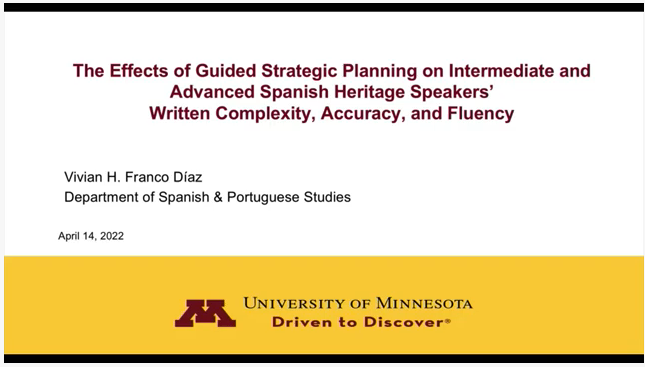
Franco Díaz, V. H. (2022, April 14). "The Effects of Guided Strategic Planning on Intermediate and Advanced Spanish Heritage Speakers’ Written Complexity, Accuracy, and Fluency."
Previous research about the effects of strategic or pre-task planning on second language accuracy have reported mixed and inconclusive results (i.e. Crookes, 1989; Yuan and Ellis, 2003; Kawauchi, 2005) and the impact on bilinguals such as Spanish heritage speakers of varying proficiency levels has not been explored. This presentation analyzes the interaction between strategic planning and proficiency on the written complexity, accuracy, and fluency of second-generation Spanish heritage speakers. Implications for the instruction of Spanish heritage speakers are discussed.
Presenter:
Vivian H. Franco Díaz is a Ph.D. candidate in Hispanic Linguistics in the Department of Spanish and Portuguese Studies at the University of Minnesota. Her research focuses on the acquisition of Spanish as a second and heritage language, specifically academic writing development; language ideologies; and Spanish heritage language education.
This presentation is cosponsored by the Second Language Education Program in the Department of Curriculum and Instruction.
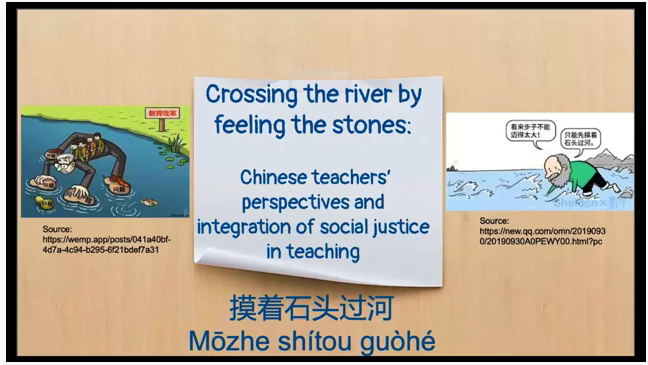
Kong, K. (2022, March 1). "Crossing the River by Feeling the Stones: Chinese Teachers’ Perspectives and Integration of Social Justice in Teaching."
Recent global social unrest has called for more attention from language teachers to address and integrate social justice in classrooms. It is important to explore what social justice looks like in world language classrooms (Wassell, Wesely & Glynn, 2019; Wesely & Thenoux, 2021), and investigate teachers’ positioning in justice-orientation work (Maddamsetti, 2021; Marlatt & Barnes, 2021). To this end and building on recent work on teacher agency (Pantić, 2015; Peña-Pincheira & De Costa, 2021), this project investigated Chinese language teachers’ understanding of social justice, and instructional approach to integrating social justice in the classroom. The presenter highlights research findings on teacher participants’ perspectives and practices, share discussion themes, and offers implications for language teaching and teacher education.
Presenter:
Kaishan Kong is an Associate Professor of Chinese at the University of Wisconsin-Eau Claire. Her research interests include language and culture education, intercultural communication and teacher education.
This presentation is cosponsored by the Second Language Education Program in the Department of Curriculum and Instruction.
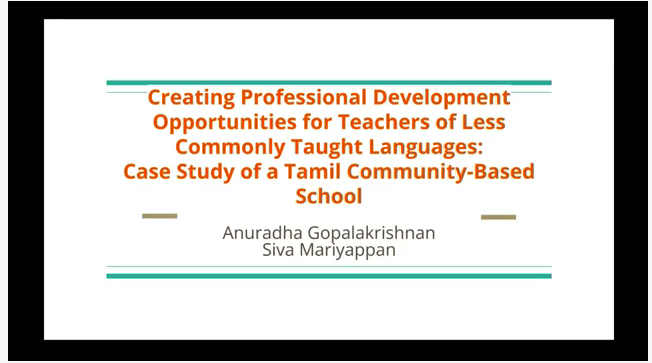
Gopalakrishnan, A., & Mariyappan, S. (2022, February 16). "Creating Professional Development Opportunities for Teachers of Less Commonly Taught Languages: Case Study of a Tamil Community School."
Professional development for teachers of Less Commonly Taught Languages (LCTL) can be challenging for several ideological, logistical, and language-specific reasons. Despite tremendous interest and motivation in receiving professional training, LCTL instructors rarely have access to appropriate opportunities or necessary resources. This presentation explores how one community school, where Tamil is taught as a heritage language, is striving to overcome these challenges in innovative ways. Over the past few years, the Minnesota Tamil School has taken up several short- and long-term initiatives to train its teachers through state and national level collaborations, partnerships with researchers, and diversification of teaching and learning platforms. The presenters trace the school’s decade-long journey in offering teacher support, their ongoing challenges, and future plans in continuing to promote and sustain the Tamil language.
Presenters:
Anuradha Gopalakrishnan is a language researcher and educator with over fifteen years of experience teaching multiple languages including German, English, and Tamil. Her research interests lie in the intersection of teacher education and multilingual pedagogies. Her recent work has focused on working with heritage language teachers, particularly with those teaching Less Commonly Taught Languages.
Siva Mariyappan founded the Minnesota Tamil School in 2008 and has been serving as its Course Director for over a decade. He was one of the founders of the American Tamil Academy as well as the American Tamil Teachers Association where he currently serves as its Communication Director. He has been leading the nationwide effort to draft the National Tamil Standards since 2018. His mission is to help all Tamil teachers working voluntarily in over 300 independent, nonprofit community schools throughout the U.S.
This presentation is cosponsored by the Second Language Education Program in the Department of Curriculum and Instruction.
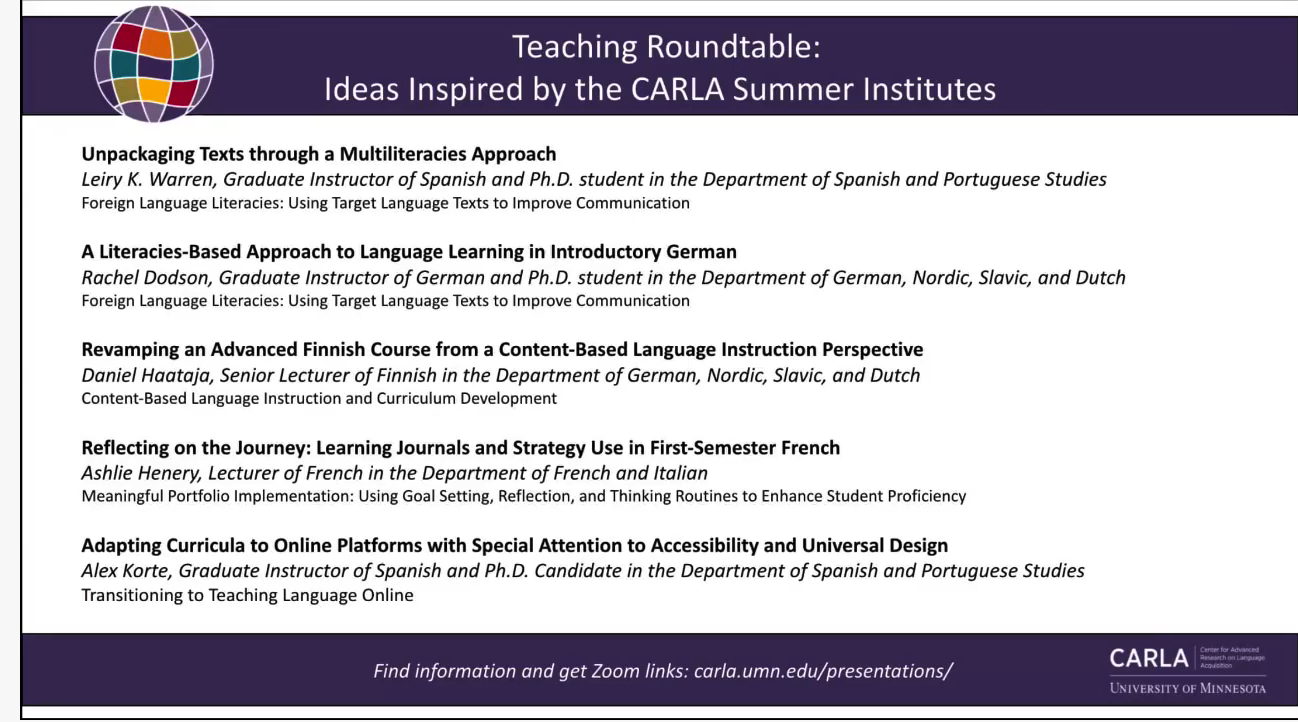
Dodson, R., Haataja, D., Henery, A., Korte, A., & Warren, L. (2022, January 26). "Teaching Roundtable: Ideas Inspired by the CARLA Summer Institutes." [Panel Presentation].
This roundtable featured five University of Minnesota language instructors who showcased a wide range of practical teaching ideas that they gleaned from taking a CARLA Summer Institute. Each presenter gave a short, informal, 3-minute presentation about something that inspired them during the institute that they’ve been able to incorporate into their postsecondary language classroom. After this brief introduction to all of the teaching ideas, attendees joined the presenters in breakout rooms so they could continue to exchange ideas in a smaller group setting. Everyone was invited back to the main room for a final wrap-up.
0:00 Welcome and Introduction
2:08 3-minute presentations
19:55 Breakout Room #1
43:56 Breakout Room #2
1:06:54 Wrap-up
Roundtable Presentations:
Unpackaging Texts through a Multiliteracies Approach
Leiry K. Warren, Graduate Instructor of Spanish and Ph.D. student in the Department of Spanish and Portuguese Studies
Summer Institute Attended: Foreign Language Literacies: Using Target Language Texts to Improve Communication
A Literacies-Based Approach to Language Learning in Introductory German
Rachel Dodson, Graduate Instructor of German and Ph.D. student in the Department of German, Nordic, Slavic, and Dutch
Summer Institute Attended: Foreign Language Literacies: Using Target Language Texts to Improve Communication
Revamping an Advanced Finnish Course from a Content-Based Language Instruction Perspective
Daniel Haataja, Senior Lecturer of Finnish in the Department of German, Nordic, Slavic, and Dutch
Summer Institute Attended: Content-Based Language Instruction and Curriculum Development
Reflecting on the Journey: Learning Journals and Strategy Use in First-Semester French
Ashlie Henery, Lecturer of French in the Department of French and Italian
Summer Institute Attended: Meaningful Portfolio Implementation: Using Goal Setting, Reflection, and Thinking Routines to Enhance Student Proficiency
Adapting Curricula to Online Platforms with Special Attention to Accessibility and Universal Design
Alex Korte, Graduate Instructor of Spanish and Ph.D. Candidate in the Department of Spanish and Portuguese Studies
Summer Institute Attended: Transitioning to Teaching Language Online
The Roundtable presenters were recipients of a scholarship offered through a special partnership between the University of Minnesota's Language Center and CARLA to support professional development for University of Minnesota language instructors to attend the CARLA Summer Institute program.
This roundtable was cosponsored by the Language Center and CARLA.
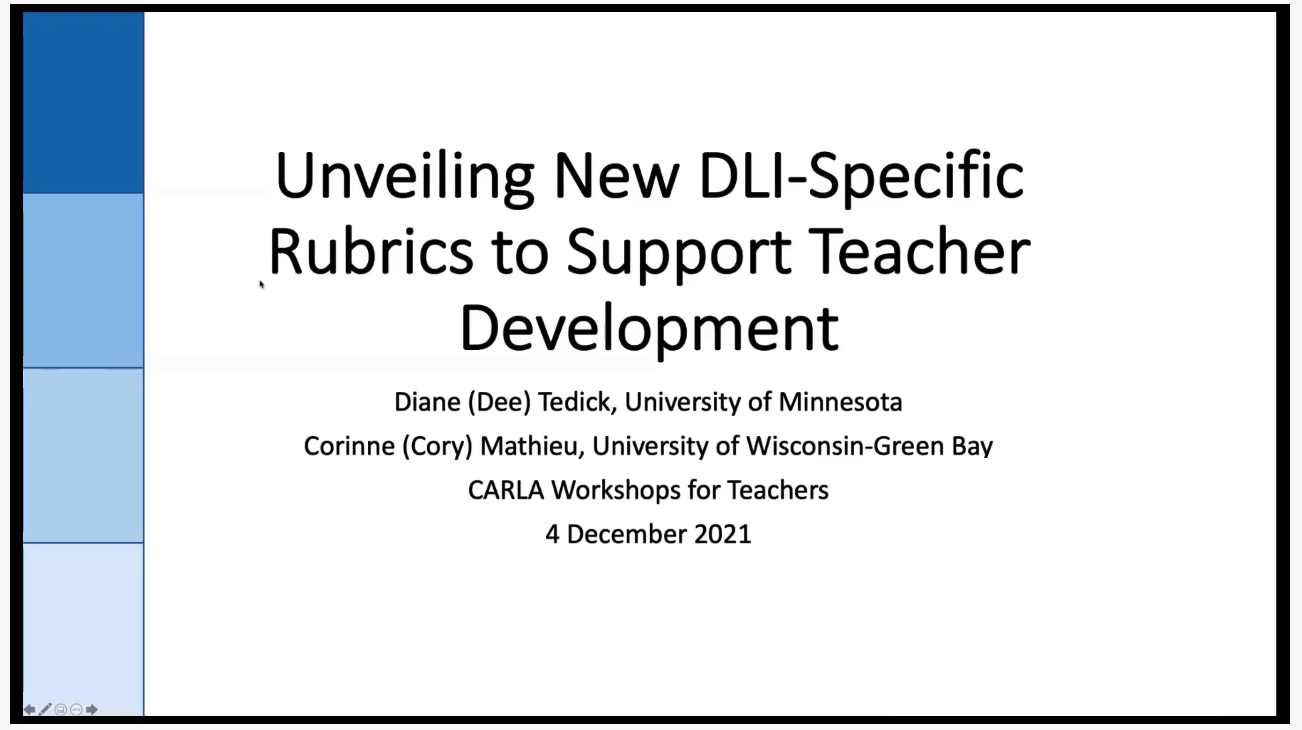
Tedick, D., & Mathieu, C. (2021, December 4). "Unveiling New DLI-Specific Rubrics to Support Teacher Development." [Workshop].
In this interactive workshop, Diane (Dee) Tedick and Cory Mathieu introduced their new dual language and immersion (DLI) specific Teacher Assessment Rubrics! The preservice, inservice, and self-assessment rubrics describe the pedagogical skills and knowledge that are unique to DLI contexts and necessary for promoting high levels of student academic achievement and language development. They are designed to support DLI teacher preparation and professional development. The rubrics are research-based, context-dependent, formative, developmental, and educative – ideally, teachers will learn new skills and practices by interacting with the rubrics. The workshop included an introduction to the content of the rubrics and an associated workbook, an explanation of the development process, and substantial time for Q&A and discussion with colleagues about how the rubrics might be integrated into teacher education and K-12 DLI programs. Check out the rubrics on the website and the presentation slides (PDF).
Presenters:
Diane (Dee) Tedick is a Professor of Second Language Education at the University of Minnesota. She is Principal Investigator on the USDE National Professional Development grant that supported the creation of these rubrics. She has worked in the DLI field as a teacher, teacher educator, and researcher for over 30 years. She coordinates the graduate certificate program in Dual Language and Immersion education as well as the M.Ed. in Language Immersion Education. She also works with DLI programs and teachers locally, nationally, and internationally.
Cory Mathieu is an Assistant Professor of Education at the University of Wisconsin – Green Bay. She received her Ph.D. in Second Language Education at the University of Minnesota where her research specialized in secondary dual language and immersion education. She is passionate about supporting DLI teachers to better integrate content and language in their instruction, and she has developed a CARLA Summer Institute focused exclusively on secondary DLI education.
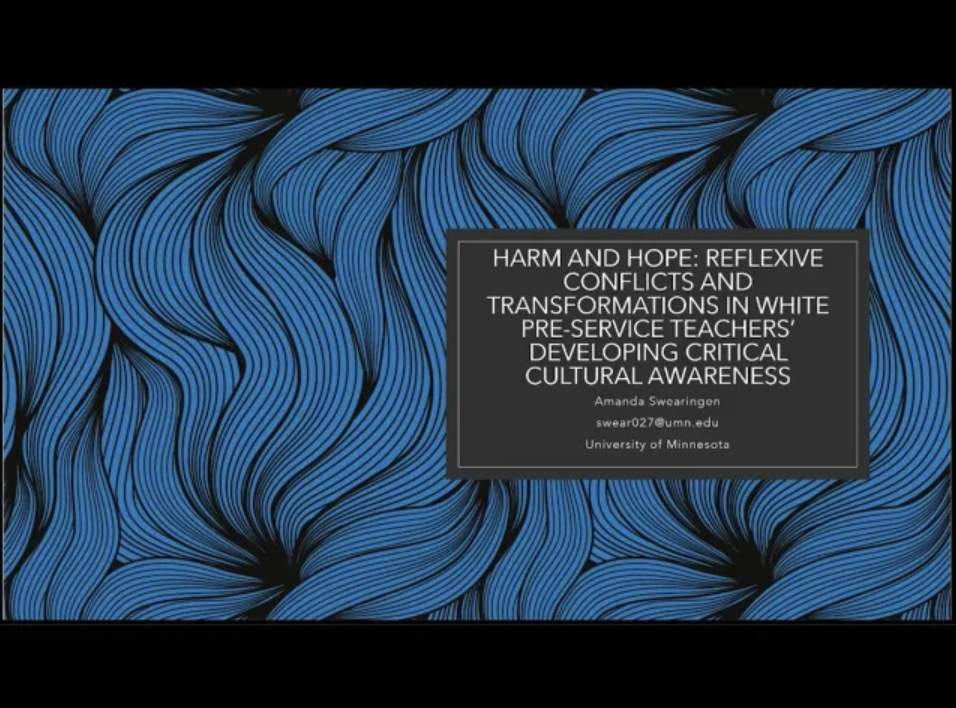
Swearingen, A. & David, S. (2021, November 11). "Harm and Hope: Reflexive Conflicts and Transformations in White Pre-Service Teachers’ Developing Critical Cultural Awareness."
English language teaching continues to define the “intercultural” from narrow social scientific and positivist perspectives where intercultural competencies derive from conceptualizations of culture from a nationalist lens (Kubota, 2004; R’boul, 2020), and pre-service teachers (PSTs) are most commonly apprenticed into viewing their roles from positions that sanitize the act of teaching English and reduce intercultural understandings to essentializing praxis. As such, PSTs struggle when challenged to confront critical reframings of interculturality that foreground the sociohistorical shaping of cultured ways of being in classrooms that emerge from the unequal distribution of power and dominance in which culture becomes a site of struggle (Kubota & Miller, 2017; Moon, 1996; Motha, 2006). This qualitative study drew on Critical Cultural Awareness (Guilherme, 2002) and Critical Whiteness Studies in teacher education (DiAngelo, 2012; Marx, 2006; Picower, 2009; Sleeter, 2008; White, 2012) in analyzing PSTs’ weekly written reflections during a semester of TESL undergraduate coursework. Findings offer insights into the identity, ideological, and emotional conflicts white PSTs navigated when reflecting on critical intercultural worldviews that often clashed with their prior lived experiences and expectations for becoming English language teachers. PSTs’ engagement in self-reflexivity revealed the delicate and complex intersection of harm and hope as they reimagined their future classrooms as critical intercultural spaces.
Presenters:
Amanda J. Swearingen is a PhD student in Second Language Education in the Department of Curriculum and Instruction at the University of Minnesota. Her scholarship focuses on language teacher education for critical intercultural consciousness, critical pedagogical approaches to teacher education, decolonizing teacher education curriculum, and practitioner inquiry through participatory and action-oriented research.
Samuel David is an Assistant Professor of Second Language Education at the University of Minnesota. His research interests include literacy development of emergent bilingual students, teacher learning about translanguaging and culturally responsive pedagogy, and educational equity for linguistically & culturally diverse students.
This presentation is cosponsored by the Second Language Education Program in the Department of Curriculum and Instruction.
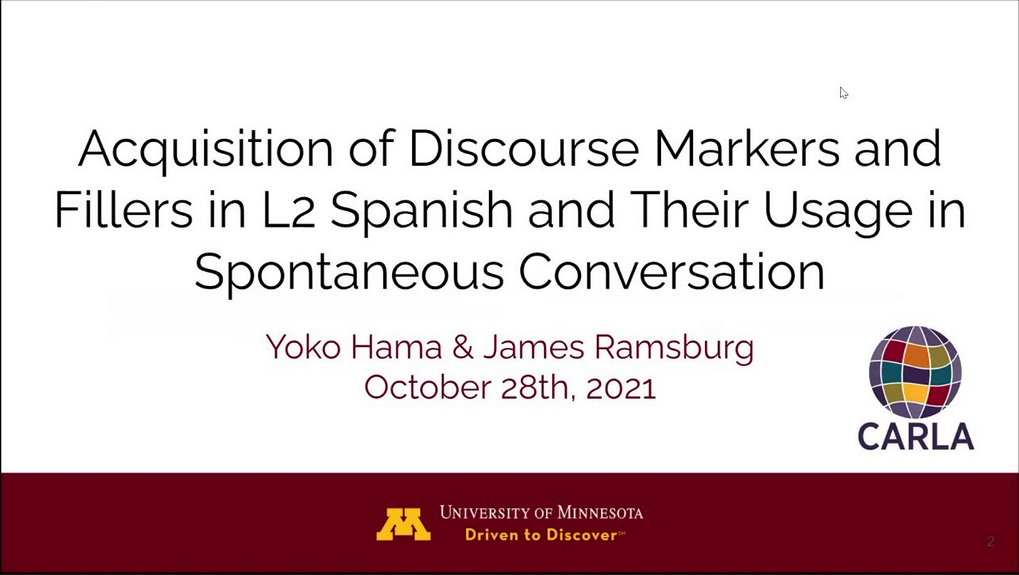
Hama, Y., & Ramsburg, J. (2021, October 28). "The Acquisition of Discourse Markers and Fillers in L2 Spanish and Their Usage in Spontaneous Conversation."
Do advanced learners utilize discourse markers and fillers in a similar frequency as native speakers? What factors contribute to the more native-like usage of discourse markers and fillers in second language acquisition? The purpose of this study is to determine how native English speakers acquire the use of discourse markers and fillers in their L2 Spanish, as well as observe their spontaneous conversations in order to linguistically analyze communicative strategies among English-Spanish bilingual speakers.
Presenters:
James Ramsburg is a PhD student and instructor in the Department of Spanish & Portuguese Studies. His research applies various quantitative methods to study the effects of language contact and dialect change.
Yoko Hama is a PhD student in the Department of Spanish & Portuguese Studies specializing in Hispanic Linguistics. Their research interests include sociolinguistics, language contact, language and identity, especially in the context of Asian diaspora communities in Spanish speaking countries.
This presentation is cosponsored by the Department of Spanish and Portuguese Studies.
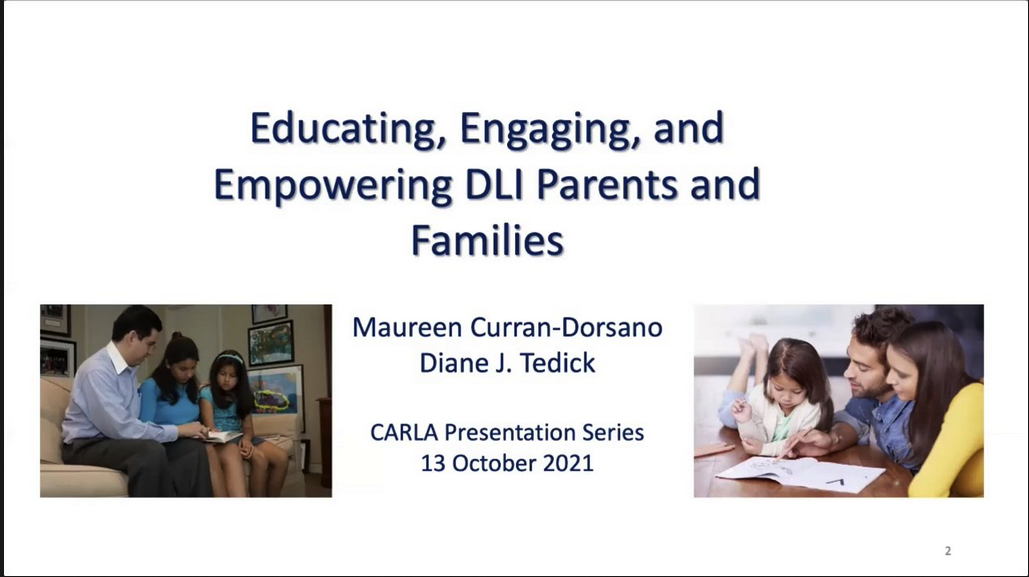
Curran-Dorsano, M., & Tedick, D. (2021, October 13). "Educating, Engaging, and Empowering DLI Parents and Families: Materials and Resources for Families and Parent Educators."
Parent or family engagement has been identified as one of the most crucial aspects influencing student achievement in schools (e.g., Henderson & Mapp, 2002). Educators working in well-implemented dual language and immersion (DLI) programs ensure that families are informed and engaged and play integral roles in their children’s education (Howard et al., 2018). Yet DLI programs need well-developed materials to educate families to ensure that they are able to play key roles in their children’s learning. To this end, we developed a DLI family education program specifically for two-way bilingual immersion programs, which can be modified for one-way and indigenous programs. Modules and interactive activities designed for face-to-face workshops for parents and families span four key topics: DLI Basics, Bilingualism & Biliteracy, The Challenges of DLI, and College & Career Opportunities. In this session, we showcase samples of the materials and share program participant perspectives. We also unveil a website (with materials in English, Spanish, and Hmong) that provides all the materials for the DLI family education workshops as well as additional support and information for DLI parents and parent educators.
Presenters:
Maureen Curran-Dorsano is a retired French immersion teacher from Edina Public Schools. She worked for four years as the Coordinator of the Dual Language and Immersion Family Education project described in this session.
Diane (Dee) Tedick is a Professor in the Second Language Education program. She works with dual language and immersion (DLI) programs locally, nationally, and internationally. She coordinates the graduate certificate program in DLI and the M.Ed. in Language Immersion Education and is Principal Investigator on the USDE grant that supported the family education project described in this session.
This presentation is cosponsored by the Second Language Education Program in the Department of Curriculum and Instruction.
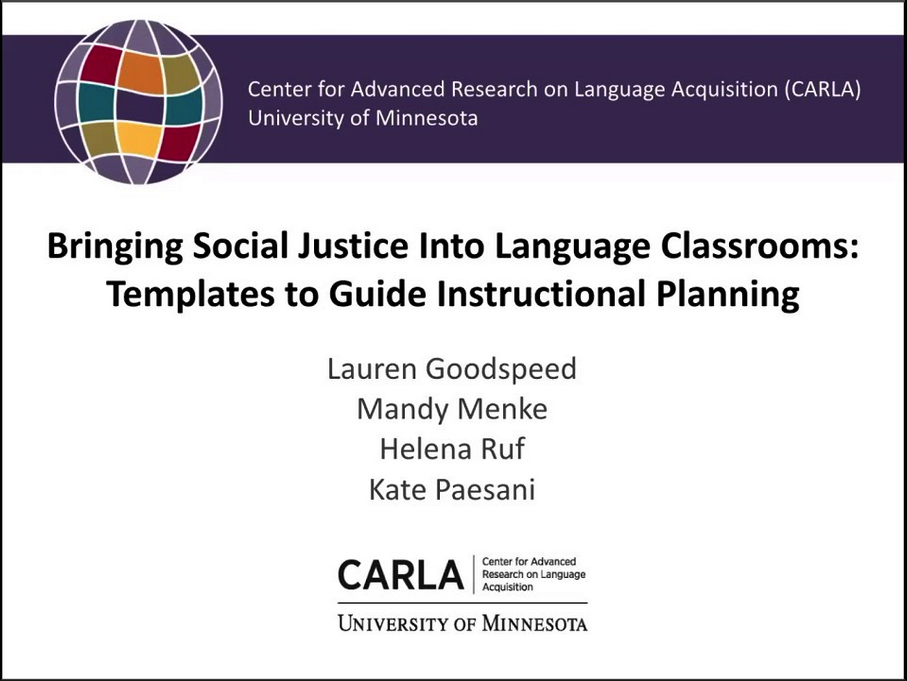
Goodspeed, L., Menke, M., Paesani, K., & Ruf, H. (2021, September 28). "Bringing Social Justice into Language Classrooms: Templates to Guide Instructional Planning."
This presentation describes the process of developing research-based curricular unit and lesson plan templates that support language instructors in the teaching of social justice themes. The templates merge frameworks grounded in multiliteracies (Kalantzis et al., 2016), social justice (Hackman, 2005; Learning for Justice, 2018), and career readiness (Regents of the University of Minnesota, 2018), to promote development of students’ language proficiency, intercultural understanding, and career competencies. Presenters explain the collaborative and iterative process that informed this work, including affordances and constraints encountered during the template-creation process. Next, they introduce the templates and illustrate how they are being used to create intermediate-level curricular units in nine languages. Finally, presenters address implications of this social justice project, including its national dissemination plan and its contribution to the professional development of teachers across languages and institutional contexts.
Presenters:
Lauren Goodspeed is a Lecturer in the Department of French and Italian and Director of the French Language Program. Her research centers on applications of multiliteracies pedagogy for the foreign language classroom, particularly in regard to second language writing.
Mandy Menke is an Assistant Professor and Director of Language Programs in the Department of Spanish & Portuguese Studies. She is currently involved in projects related to the development of syntactic and lexical complexity in written second language Spanish and teacher learning around multiliteracies pedagogy.
Kate Paesani is Director of the Center for Advanced Research on Language Acquisition (CARLA) and affiliate Associate Professor in the College of Liberal Arts at the University of Minnesota. Her research focuses on literacies-oriented curriculum and instruction and language teacher development, couched within the frameworks of multiliteracies pedagogy and sociocultural theory.
Helena Ruf is a Senior Lecturer and Director of Language Instruction in the Department of German, Nordic, Slavic and Dutch. Current and past research projects focus on implementation of multiliteracies pedagogies and second language writing.
2020-2021
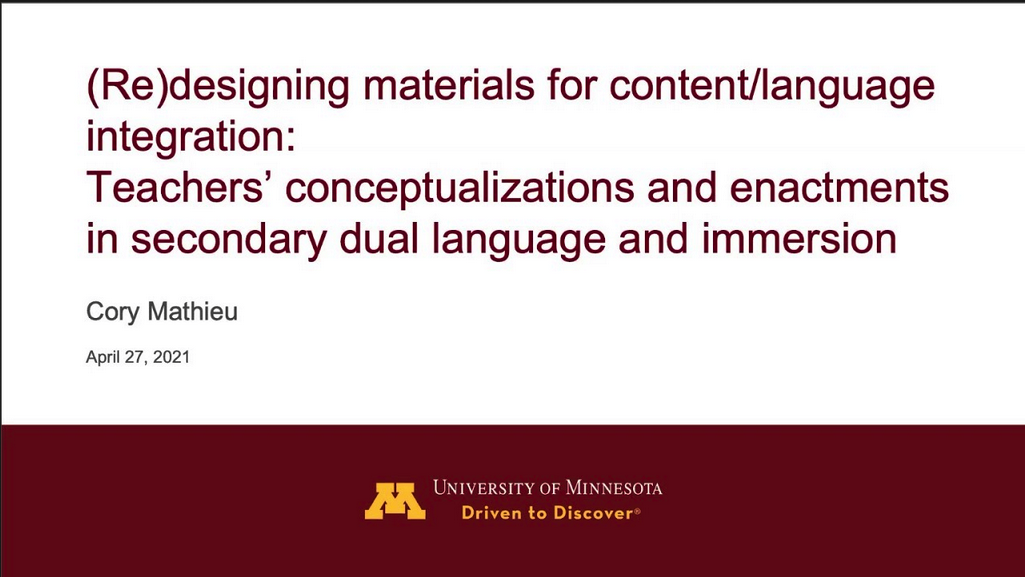
Mathieu, C. (2021, April 27). "(Re)designing Materials for Content/Language Integration: Teachers Conceptualizations and Enactments in Secondary Dual Language and Immersion."
One of the greatest pedagogical challenges for secondary dual language and immersion (DLI) teachers is effectively and systematically integrating language instruction within a content-focused classroom. This presentation discusses a nine-month design-based research study that sought to understand how intentionally designed classroom materials might assist secondary DLI teachers with this endeavor. Drawing on theories of counterbalanced instruction (Tedick & Lyster, 2020) and Systemic Functional Linguistics (Halliday, 1993), Ms. Mathieu collaborated with two teachers to (re)design their content-focused materials to include language-focused instructional features. This presentation will share how the iterative process of collaborative materials analysis, (re)design, instruction, and reflection shaped the teachers’ conceptualizations and enactments of content and language integration in the classroom. Implications for content-based language teacher education will be discussed.
Presenter:
Cory Mathieu is a Ph.D. candidate in Second Language Education at the University of Minnesota. Her research focuses on teacher professional development, pedagogy, and curriculum design for dual language and immersion education.
This presentation is cosponsored by the Second Language Education Program in the Department of Curriculum and Instruction
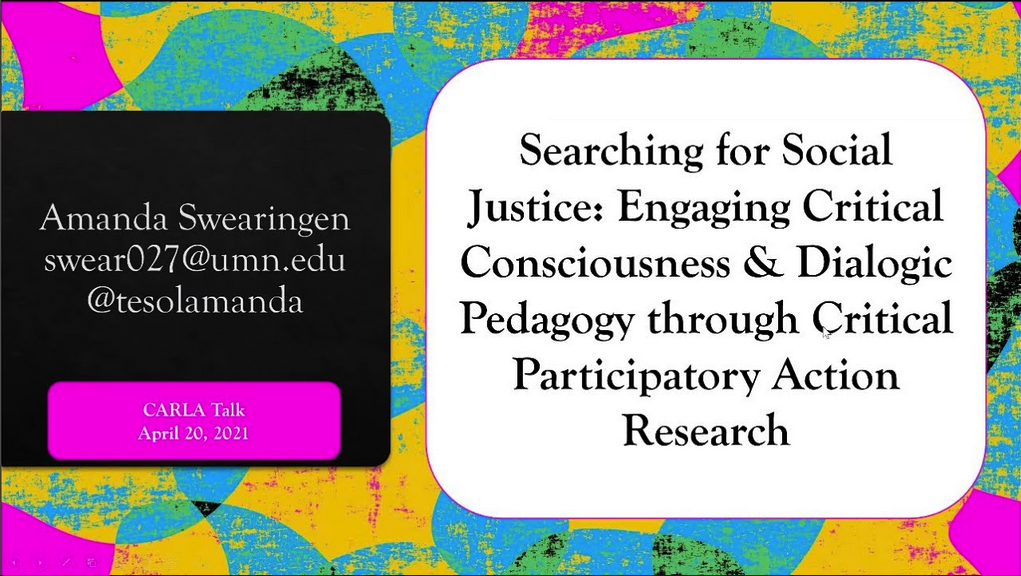
Swearingen, A. (2021, April 20). "Searching for Social Justice: Engaging Critical Consciousness & Dialogic Pedagogy through Critical Participatory Action Research."
CARLA Fellow Presentation:
“Social justice” has become a major emphasis in education, so preparing pre-service teachers to develop praxis aimed at educational equity has driven many contemporary trends in teacher preparation programs. However, questions remain about how teacher educators can facilitate pre-service teachers’ consciousness raising on the conceptualizations and practicalities of teaching for liberation. This presentation examines the ways one teacher educator worked alongside her pre-service English language teachers to reimagine their classroom as a site of dialogic education (Freire, 1970) through a Critical Participatory Action Research (CPAR; Kemmis, McTaggart, & Nixon, 2014) project on the School-to-Prison Pipeline that challenged participants to actively engage in critical explorations of themselves as both intercultural humans and teachers from a lens that extended beyond the walls of their classroom. Through CPAR, participants deconstructed traditional top-down knowledge dissemination pathways and became responsible for and responsive to their own complex journeys of discoveries of who they are as critical teacher-scholars in their sense-making of “social justice.” Implications for the potentials of CPAR as a “practice-changing practice” (Kemmis et al., 2014, p. 2) in language teacher preparation are discussed.
Presenter:
Amanda Swearingen is a Ph.D. student in Second Language Education at the University of Minnesota. Her research explores pre-service teachers’ developing identities as critical intercultural scholars and pedagogues and the ways teacher preparation curriculum engages with critical intercultural communication.
This presentation is cosponsored by the Second Language Education Program in the Department of Curriculum and Instruction.
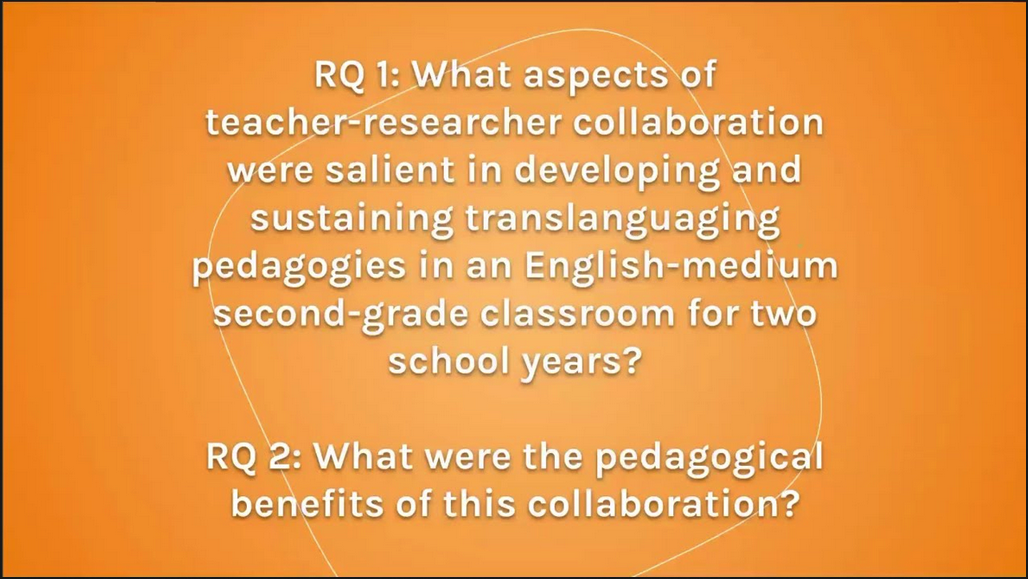
Shepard-Carey, L. (2021, April 14). "Translanguaging Pedagogies in Elementary Classrooms: Widening Possibilities with Long-Term Teacher-Researcher Collaboration."
Translanguaging pedagogies demand resistance to the monolingual subjectivities inherent in school systems, yet there are several ideological, ecological, and practical obstacles in implementation (Allard, 2017). As such, teacher-researcher collaboration is one way to push-back and create sustainable change (Tian & Shepard-Carey, 2020). While a growing number of studies surrounding translanguaging pedagogies have utilized collaborative approaches (e.g. Daniel et al., 2019; Liu et al., 2020), few studies have interrogated these approaches in detail. As such this study elucidates how relational dynamics, ecological structures, history, and power shaped collaborative processes and possibilities surrounding translanguaging pedagogies in a linguistically- and culturally-diverse second grade classroom. Drawing on ethnographic methods in connection to a larger multi-year participatory design research study (Bang & Vossoughi, 2016), this study further explores the role of collaboration in developing translanguaging pedagogies with her research partner, Ms. Hassan. Qualitative thematic analysis demonstrated several emergent findings: (a) that the teacher perceived that long-term collaboration not only strengthened students’ multilingual identities and learning processes, (b) facilitated transformative change in ideologies surrounding multilingualism and, (b) further inspired critical thinking and resistance to school norms and policies. She concludes the presentation with discussion of implications for research and teaching.
Presenter:
Leah Shepard-Carey is a Ph.D. in Second Language Education at the University of Minnesota. As a former public school educator, her research focuses on fostering multilingualism and multilingual literacy practices in early childhood and elementary English-medium classrooms.
This presentation is cosponsored by the Second Language Education Program in the Department of Curriculum and Instruction.
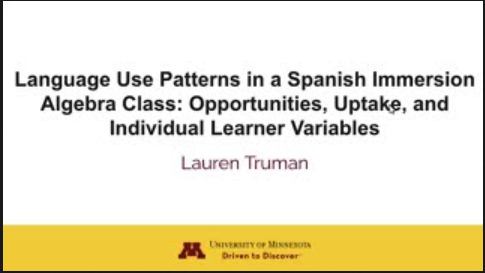
Truman, L. (2021, March 30). "Language Use Patterns in a Spanish Immersion Algebra Class: Opportunities, Uptake, and Individual Learner Variables."
By the time dual language education (DLE) students reach high school, their opportunities to communicate in the minority language are often limited. This is especially true in programs where only two immersion courses per year are required. Typically, one of these courses is a math or science class, whose course content is not language related. The combination of these factors, in addition to students' general reluctance to use the minority language, affects students' continued development of their minority language skills. This study examines a secondary Spanish immersion math class to determine what kinds of opportunities for Spanish use the teacher provides the students, how students take up those opportunities, and the role of individual learner variables in student language use patterns.
Presenter:
Lauren Truman is a Ph.D. candidate in the Spanish and Portuguese Department at the University of Minnesota. Her primary research focuses on language use in dual language education (DLE) programs.
This presentation is cosponsored by the Department of Spanish and Portuguese Studies.
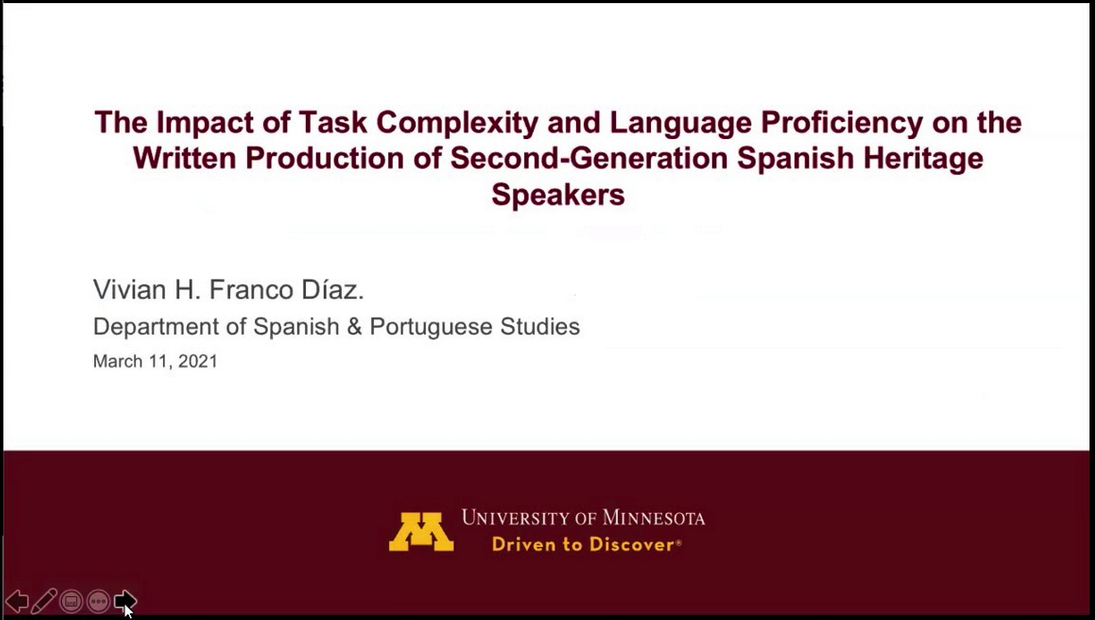
Franco Díaz, V. H. (2021, March 11). "The Impact of Task Complexity and Language Proficiency on the Written Production of Second-Generation Spanish Heritage Speakers."
CARLA Fellow Presentation:
Although there have been numerous studies investigating the effects of task complexity on second language performance, a limited number (cf. Torres, 2013, 2018) has examined the impact of task complexity and language proficiency on Spanish heritage speakers' written production. This presentation discusses how changes in task complexity manipulated along ± reasoning demands (resource-directing cognitive factor) of Robinsons (2007) Triadic Componential Framework impact the complexity, accuracy, and fluency (CAF) of second-generation Spanish heritage speakers' argumentative writing. Likewise, this presentation explores if their performance differs according to their linguistic competence as tested through a modified version of the DELE exam. Results are discussed in relation to the Cognition Hypothesis (Robinson, 2001) and pedagogical implications are addressed.
Presenter:
Vivian H. Franco Díaz is a Ph.D. candidate in Hispanic Linguistics in the Department of Spanish and Portuguese Studies at the University of Minnesota. Her research focuses on the acquisition of Spanish as a second and heritage language, specifically academic writing development; language ideologies; and Spanish heritage language education.
This presentation is cosponsored by the Department of Spanish and Portuguese Studies.
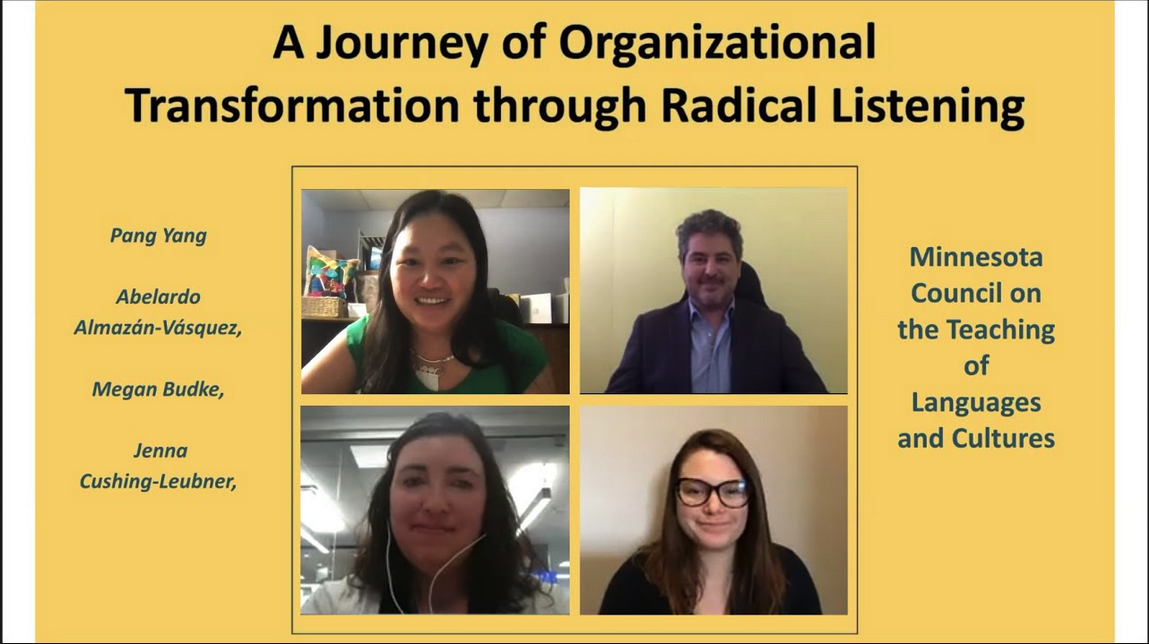
Almazán-Vázquez, A., Cushing-Leubner, J., Budke, M., & Yang, P. (2021, February 23). "A Journey of Organizational Transformation through Radical Listening."
Invited CARLA Presentation:
Organizations often find themselves enabling systemic oppression and maintaining existing experiences with privilege and marginalization. How do we restructure our organizations to interrupt privilege and better amplify and serve marginalized communities? Hear the story of how one organization the Minnesota Council on the Teaching of Languages and Cultures uses radical listening to learn from those who are often silenced in order to make meaningful changes. Learn actionable steps your own organization might take to amplify immigrant, Black, Indigenous, and other people of color (BIPOC) narratives. Transform your organization through intentional changes driven by equity and inclusion.
Presenters:
Abelardo Almazán-Vázquez is in his 10th year teaching Spanish, coaching an all-gender soccer team, and teaching Latin Dance at The Putney School. He pursued his Licenciatura in Teaching Spanish as a Second Language at Universidad Internacional UNINTER, and his Master's degree in Latin American Studies at Cleveland State University. Abelardo came to the U.S. as an immigrant 18 years ago from the beautiful “City of the Eternal Spring," Cuernavaca, México.
Dr. Jenna Cushing-Leubner is an Assistant Professor in World Languages Education, ESL, and Bilingual/Bicultural Education at the University of Wisconsin-Whitewater, where she coordinates the World Languages licensure program and developed and coordinates the online Heritage Language Education Professional Development program. As a critical and participatory design language education researcher, she collaborates with heritage language educators, multilingual learners, and community educators and elders to understand and create transformative multilingual learning environments for linguistic and cultural knowledge reclamation and sustainability.
Megan Budke is a teacher and leader at Wayzata Public Schools in Minnesota, where she teaches middle school Spanish and serves as a world language curriculum coordinator, focusing on improving world language programming through proficiency-based curriculum design and assessment practices. She has presented at MCTLC, CSCTFL, and ACTFL and served as the 2020 President of the Minnesota Council on the Teaching of Languages and Cultures.
Pang Yang is a veteran English as a Second Language & Heritage Hmong teacher at Osseo Public Schools, Minnesota, whose passion is in Student-Centered Learning, amplifying student voices in language classrooms and Ethnic Studies in Hmong Heritage classrooms. Pang is a powerhouse who takes on many roles including counselor, cultural navigator, parent educator, event coordinator, advocate, and more.
This presentation is cosponsored by the Minnesota Council on the Teaching of Languages and Cultures and the Minnesota Department of Education.
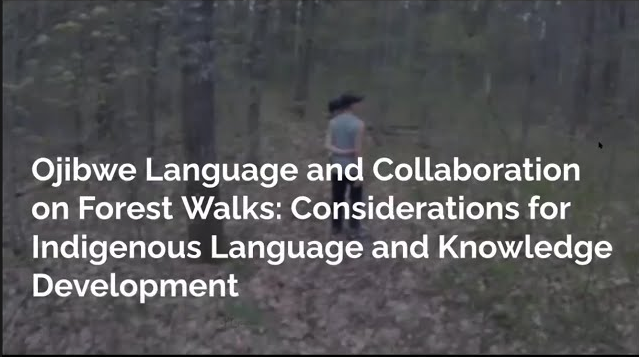
McKenzie, J. & Hermes, M. (2021, February 8). "Ojibwe Language and Collaboration on Forest Walks: Considerations for Indigenous Language and Knowledge Development."
Indigenous language reclamation efforts are pushing academic ideas of what language is to be accountable to Indigenous epistemologies. As Indigenous immersion school efforts aim to grow more young speakers, it is important to understand how these speakers engage their linguistic, cultural, and land-based knowledge and relationships in intergenerational engagements on and with land. In this project, we examine episodes from three forest walks, taken from a broader corpus of walks (14), to describe how one Elder walking with groups of two children constructed knowledge and joint meaning-making in the Ojibwe language while walking on Ojibwe lands. Working from a framework that an Indigenous epistemology is embodied in these cultural ecologies, we explore how seeing humans as a part of the natural world, at play on the walks, facilitates language and other knowledge development. The project points to implications for designing learning and teaching of Indigenous language that is not limited to language-as-code or communicative tool, but that goes hand in hand with holistic concepts of Indigenous ways of being and knowing.
Presenters:
James McKenzie is a Diné Ph.D. student at the University of Arizona focused on Indigenous language and culture maintenance and revitalization, Indigenous immersion education and Indigenous culture-based education. He has worked in academic and community settings in his homelands to contribute to and organize efforts for Diné language and culture maintenance and revitalization. James is a graduate of the MA in Second Language Education at the University of Minnesota.
Mary "Fong" Hermes is Professor of Second Language Education in the Department of Curriculum and Instruction at the University of Minnesota. She has worked as an indigenous community member, decolonizing the university for 25 years. Focused on Ojibwe language revitalization, her work now is transdisciplinary, and she is thinking about how to reconnect humans to more-than-humans and place.
This presentation is cosponsored by the Second Language Education Program in the Department of Curriculum and Instruction.
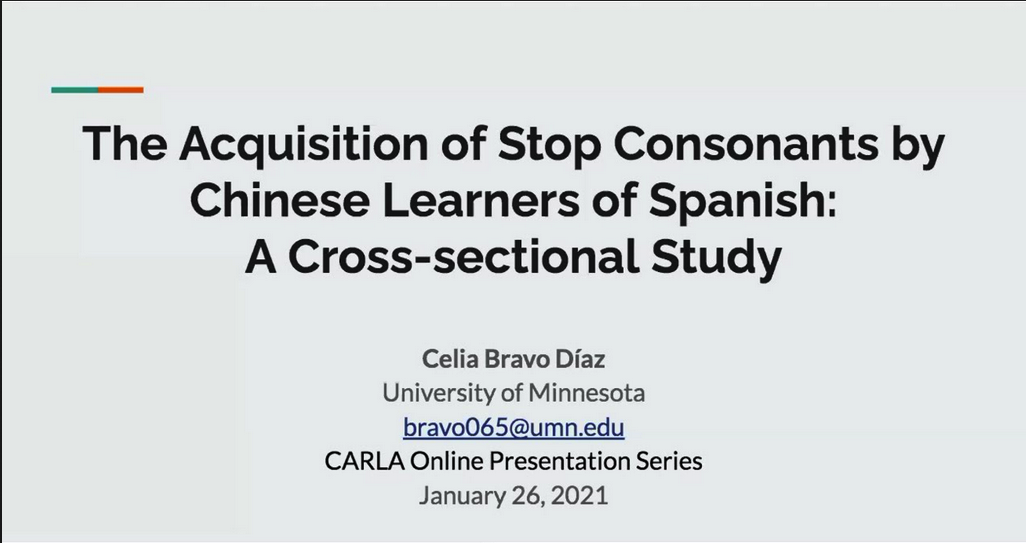
Bravo Díaz, C. (2021, January 26). "The Acquisition of Stop Consonants by Chinese Learners of Spanish: A Cross-sectional Study."
Much of what is known about the phonological development in second language Spanish is based on studies of L1 English speakers. This body of research has shown common pathways in the road of phonological acquisition; however, our understanding is limited by the lack of systematic investigation of learners from distinct linguistic backgrounds, by the scarcity of studies that include both production and perception data, and of speakers in the early and most advanced stages of L2 acquisition. To that end, this study explores the developmental patterns in the production and perception of Spanish stop consonants (/b, d, g, p, t, k/) in an uncommonly studied but growing population, Chinese learners of Spanish, at six levels of proficiency, from true beginners to near-native speakers.
The study data comes from fieldwork conducted in Spain between February and July of 2019 and includes three reading tasks, one perception task, and a language engagement questionnaire from 80 students. Based on research using mixed-effect models, the presenter will describe the L2 category formation of Spanish stops in reference to linguistic and individual factors. She will also discuss the contribution of this research to current models of second language speech.
Presenter:
Celia Bravo Díaz is a Ph.D. candidate in Hispanic Linguistics in the Department of Spanish and Portuguese Studies at the University of Minnesota. Her research focuses on second language phonology, specifically on the acquisition of the sound system in Spanish by native speakers of Mandarin Chinese.
This presentation is cosponsored by the Department of Spanish and Portuguese Studies.
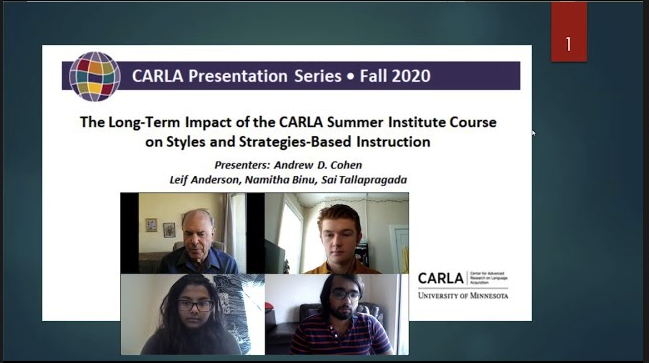
Cohen, A. with Anderson, L., Binu, N., & Tallapragada, S. (2020, December 8). "The Long-Term Impact of the CARLA Summer Institute Course on Styles and Strategies-Based Instruction."
The CARLA Summer Institute on Styles and Strategies-Based Instruction (SSBI) was offered for 22 years (1996 to 2017). During that time, 553 teachers, researchers, and administrators participated in the course. Given that the field of language learner strategies, and especially the sub-area of strategy instruction, has been experiencing an upsurge of interest, a study was conducted to investigate the long-term impact of this course on the subsequent careers of the participants.
Twenty-nine past SSBI participants volunteered to respond to a carefully designed and piloted 20-item survey questionnaire. A smaller group of these respondents also engaged in a follow-up interview. The respondents represented language educators who had taken the course up to two decades prior, as well as those who had taken it more recently. These respondents were largely language instructors, spanning the instructional levels from kindergarten through higher education, primarily teaching Spanish, but also English, Asian languages, and other languages as well. They reported teaching both in language courses, in immersion programs, and in programs intended to enhance their students ' language learning experiences whatever the target language.
The findings from this study provide insights as to the aspects of a CARLA Summer Institute course which may have a lasting impact on a language educator 's career.
Presenters:
Andrew D. Cohen (Professor Emeritus, University of Minnesota) and undergraduate research team from the University of Minnesota: Leif Anderson, Namitha Binu, and Sai Tallapragada.
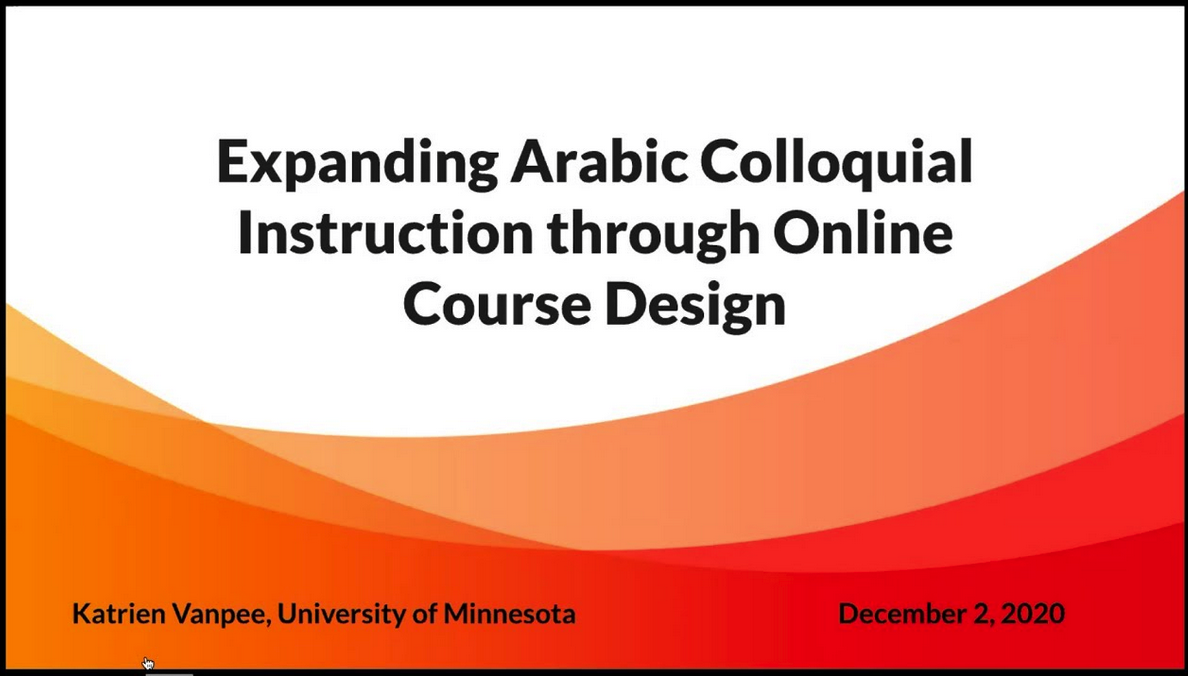
Vanpee, K. (2020, December 2). "Expanding Arabic Colloquial Instruction through Online Course Design."
Among the challenges Arabic multiglossia creates for Arabic language programs is the question of which, and how many, colloquial varieties of Arabic to offer as part of the curriculum. Due to constraints related to manpower and expertise, many Arabic programs limit their colloquial Arabic offerings to a single, or two, widely understood varieties: Egyptian and/or Levantine Arabic. In many cases, learners with interests or professional needs that go beyond these colloquials are left to their own devices—a problem exacerbated by the dearth of high-quality instructional materials for other varieties of Arabic.
In this presentation, the speaker discusses the design and delivery at the University of Minnesota of an online course in the colloquial Arabic of the Arabian Peninsula. This variety of Arabic has rarely been taught in the United States despite its usefulness for learners with a range of academic and professional interests. The speaker addresses the opportunities and challenges involved in the creation of a curriculum for less commonly taught varieties of Arabic like Arabian Peninsula Colloquial, as well as the advantages and the constraints of the online delivery format of the course. Additionally, she offers recommendations for the design of online courses in colloquial Arabic that can support the expansion of Arabic colloquial instruction in academic programs across the United States.
Presenter:
Katrien Vanpee is the Director of Arabic Language Instruction at the University of Minnesota, where she teaches courses in Arabic language, literature, and culture. Her interests include foreign language pedagogy; program direction and curriculum design; Arabic literature and poetry; and the cultural heritage of the Arabian Peninsula.
This presentation is cosponsored by the Language Center.
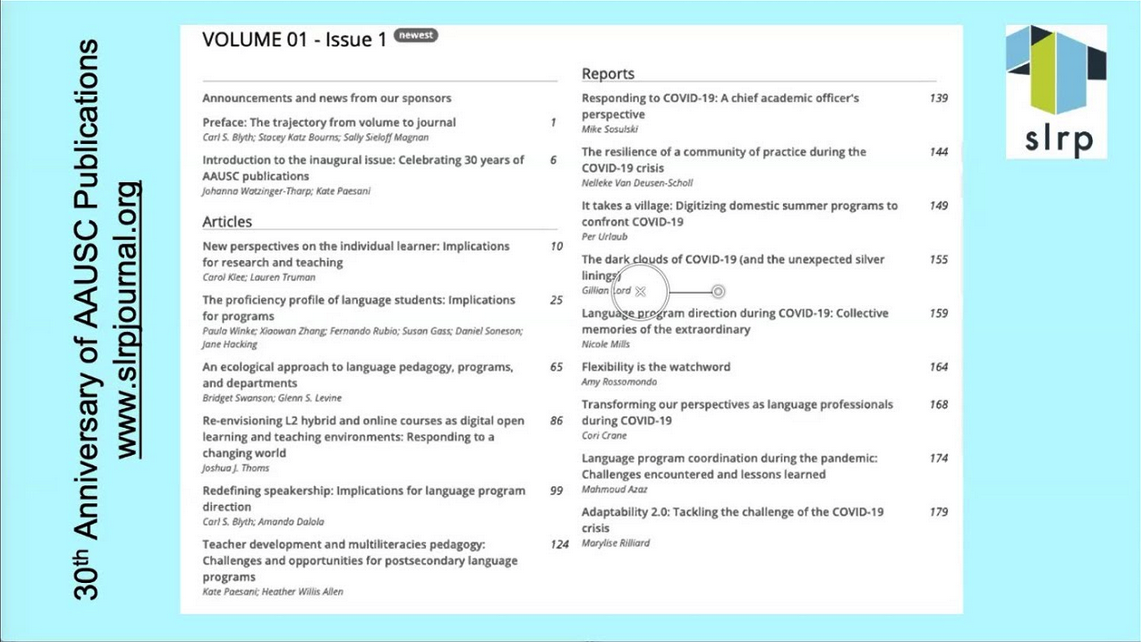
Watzinger-Tharp, J., & Paesani, K. (2020, November 12). "Webinar: Second Language Research & Practice: Publishing in an Open-Access Journal on Postsecondary Language Education."
Second Language Research & Practice, the new open-access journal of the American Association of University Supervisors and Coordinators (AAUSC), addresses postsecondary language education from theoretical, empirical, and practical perspectives. To celebrate the journal's debut, the co-editors led a thirty-minute webinar to orient readers to the journal and its inaugural issue where they described the focus of the journal 's two main rubrics, and explained the submission process. Learn about why you should read and publish your scholarship in this exciting new journal!
Presenters:
Johanna Watzinger-Tharp is Associate Professor in the Department of Linguistics at the University of Utah. She conducts research on dual language immersion programs, focusing on students' academic achievement and proficiency growth and on research implications for policy and practice. Her involvement with AAUSC dates back to the 1990's, when she was a language program director, and she also served as AAUSC president from 2006-2008.
Kate Paesani is Director of CARLA and affiliate Associate Professor at the University of Minnesota. Her research focuses on literacies-oriented curriculum and instruction and language teacher development, couched within the frameworks of multiliteracies pedagogy and sociocultural theory. She is a former language program director and has been actively involved in the AAUSC for nearly 20 years.
Second Language Research & Practice is published on behalf of the AAUSC by the National Foreign Language Resource Center (NFLRC) in partnership with CARLA, CERCLL, COERLL, L2TReC, and ORLC.
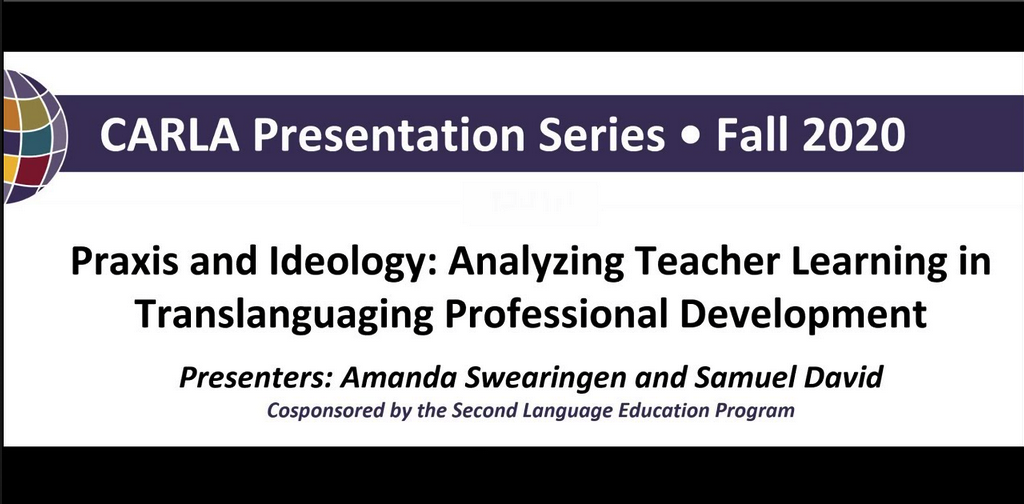
Swearingen, A., & David, S. (2020, October 29). "Praxis and Ideology: Analyzing Teacher Learning in Translanguaging Professional Development."
This qualitative study investigated seven teachers participating in a professional development series on translanguaging pedagogies. We will present on two analyses of this data. The first was aimed at understanding how teachers adapted translanguaging strategies into their classroom practice, and how they perceived challenges and benefits of these approaches. The second, ongoing analysis investigates the complex, fluid, and often contradictory language ideologies the teachers expressed and embodied while negotiating and disrupting the monolingual bias in their school.
Presenters:
Amanda Swearingen is a Ph.D. student in Second Language Education in the Department of Curriculum and Instruction at the University of Minnesota. Her research interests center around pre-service teacher development and critical intercultural communication.
Samuel David is an Assistant Professor of Second Language Education at the University of Minnesota. His research interests include literacy development of emergent bilingual students, teacher learning about translanguaging and culturally responsive pedagogy, and educational equity for linguistically & culturally diverse students.
This presentation is cosponsored by the Second Language Education program in the Department of Curriculum and Instruction.
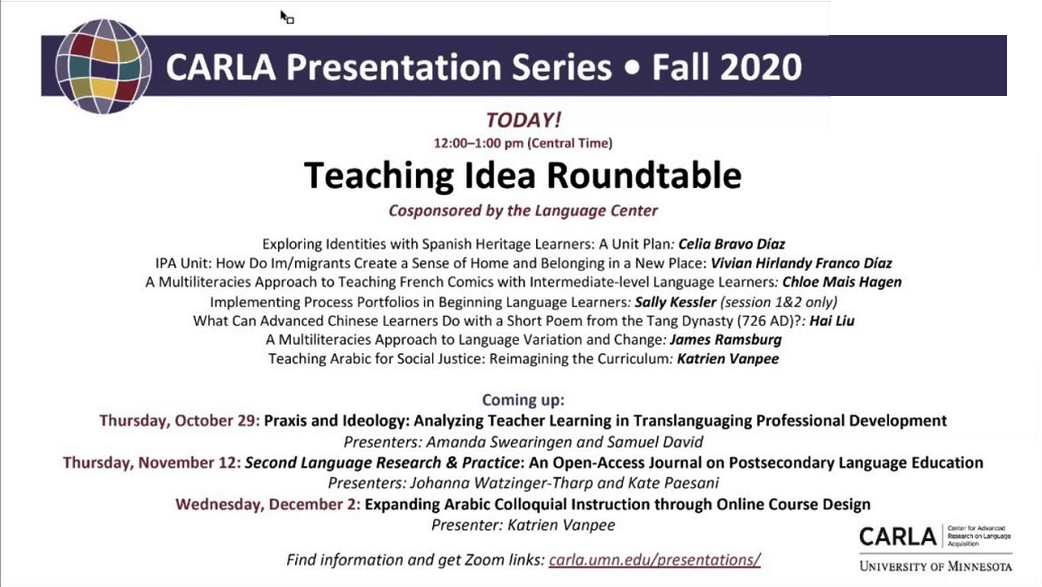
Bravo Díaz, C., Franco Díaz, V. H., Hagen, C. M., Kessler, S., Liu, H., Ramsburg, J, & Vanpee, K. (2020, October 15). "Teaching Idea Roundtable."
This CARLA roundtable featured University of Minnesota language instructors who received a scholarship to participate in a 2020 CARLA Summer Institute from the Language Center or CARLA. They each share information about the project they developed during their institute in a "swap shop" format.
The session began with a short introduction by Kate Paesani, CARLA Director. Each presenter gave a short, informal presentation in separate sessions. Attendees had the opportunity to hear up to three different presentations by moving to different breakout rooms at designated times.
Approximate video locations (min:sec) are listed with each presentation below, so you can jump to a specific presentation.
Presenters and Topics:
Exploring Identities with Spanish Heritage Learners: A Unit Plan (starts at 6:11)
Presenter: Celia Bravo Díaz, Spanish Graduate Instructor and PhD candidate
Summer Institute Attended: Critical Approaches to Heritage Language Education
IPA Unit: How Do Im/migrants Create a Sense of Home and Belonging in a New Place? (16:50)
Presenter: Vivian Hirlandy Franco D’az, Spanish Graduate Instructor and PhD student
Summer Institute Attended: Assessing Language Learners ' Communication Skills via Authentic Communicative Performance Tasks
A Multiliteracies Approach to Teaching French Comics with Intermediate-Level Language Learners (22:21)
Presenter: Chloe Mais Hagen, French Graduate Instructor and PhD candidate
Summer Institute Attended: Foreign Language Literacies: Using Target Language Texts to Improve Communication
Implementing Process Portfolios in Beginning Language Learners (29:43)
Presenter: Sally Kessler, French Graduate Instructor and PhD student
Summer Institute Attended: Meaningful Portfolio Implementation
What Can Advanced Chinese Learners Do with a Short Poem from the Tang Dynasty (726 AD)? (38:08)
Presenter: Hai Liu, Chinese Lecturer
Summer Institute Attended: Foreign Language Literacies: Using Target Language Texts to Improve Communication
A Multiliteracies Approach to Language Variation and Change (47:30)
Presenter: James Ramsburg, Spanish Graduate Fellow and PhD student
Summer Institute Attended: Foreign Language Literacies: Using Target Language Texts to Improve Communication
Teaching Arabic for Social Justice: Reimagining the Curriculum (52:58)
Presenter: Katrien Vanpee, Director of Arabic Language Programs
Summer Institute Attended: Teaching Language Through the Lens of Social Justice
This roundtable was cosponsored by the Language Center.
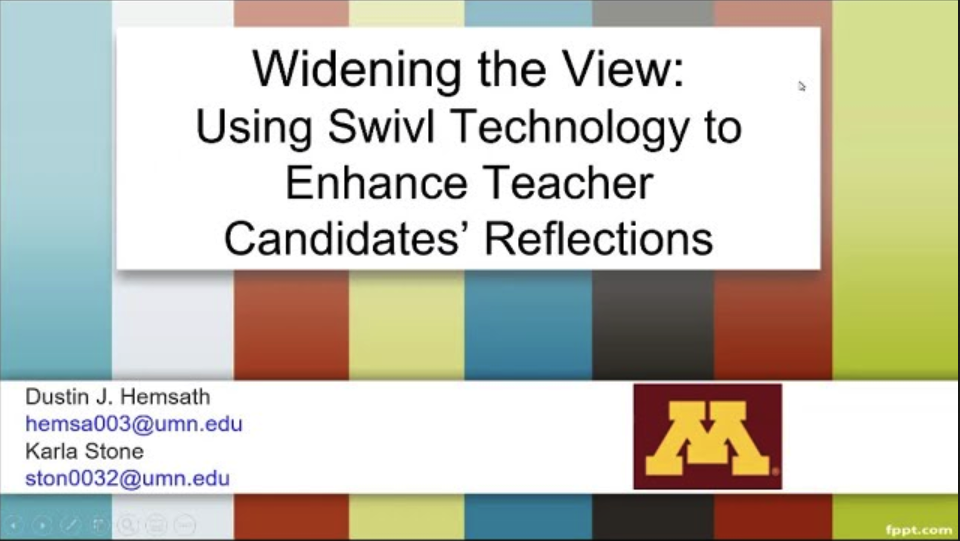
Hemsath, D. J. & Stone, K. (2020, October 8). "Widening the View: Using Swivl Technology to Enhance Teacher Candidates' Reflections."
After receiving a grant for Swivl bases, microphones, and Pro online accounts, the SLE initial licensure program piloted the new technology to conduct teacher candidates' video reflections during the Spring 2020 student teaching appointments. Using the teacher candidates' recorded video lessons and written reflections as data, this presentation describes the potential of Swivl technologies to enhance teacher candidates' reflections on language output in k-12 classrooms.
Presenters:
Dustin J. Hemsath is a Ph.D. student of Second Language Education in the Department of Curriculum and Instruction and currently working as a Supervisor of world language and ESL teacher candidates in the SLE licensure program. His research interests are in language teacher education, world language teaching and learning, and bilingualism.
Karla Stone is the license program lead for the ESL and World Language initial license program, and a lecturer in Second Language Education, Curriculum and Instruction.
This presentation is cosponsored by the Second Language Education Program in the Department of Curriculum and Instruction.
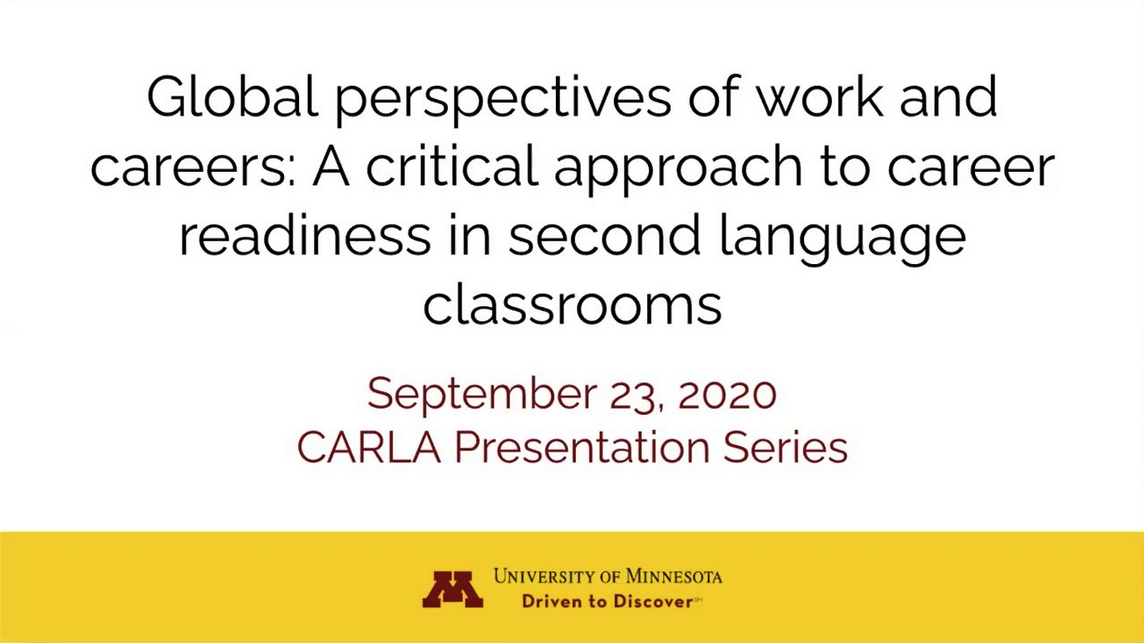
Mack, S. (2020, September 23). "Global Perspectives of Work and Careers: A Critical Approach to Career Readiness in Second Language Classrooms."
In U.S. higher education contexts, there are increasing appeals to employ global, international, and intercultural learning frameworks in the service of making students "career ready." This presentation examines key issues of equity and language teaching and learning generated by this situation, and outlines a critical, disciplinary-grounded approach to address them. The presentation includes examples of how this approach was applied to a multi-section intermediate Spanish as a Second Language course, proposes best practices, and highlights areas for continued work in the field.
Google doc to share resources
Presentation Slides
Presenter:
Sara Mack, Ph.D., is Senior Lecturer and Coordinator of Spanish 1004 at the University of Minnesota Twin Cities. She is a former Faculty Fellow of the College of Liberal Arts Career Readiness Initiative and recent recipient of the College of Liberal Arts Career Readiness Teaching Award. Her research interests include equity and access in U.S. higher education, metacognitive regulatory processes in classroom-based learning, sociophonetics, and learning and memory.
This presentation is cosponsored by the CLA Career Readiness Initiative and the Department of Spanish and Portuguese Studies.
2019-2020
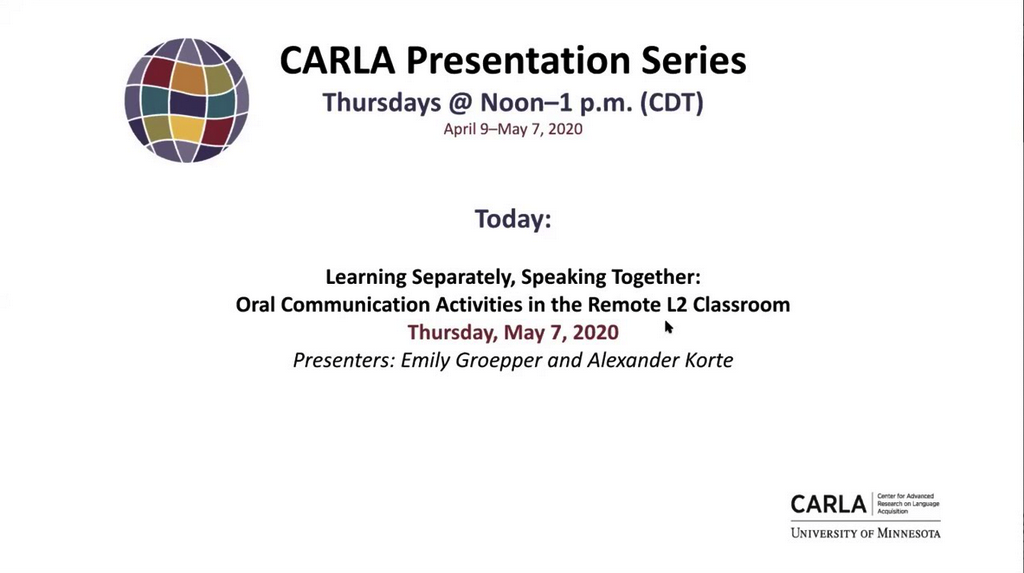
Groepper, E. & Korte, A. (2020, May 7). "Learning Separately, Speaking Together: Oral Communication Activities in the Remote L2 Classroom."
As university-level FL students reach upper-division content courses, their speaking skills tend to plateau. In the current distance-learning environment, it can be even more difficult for students to practice these skills. In this presentation, we offer guidance for transitioning speaking activities to online-platforms. We discuss examples of instructional activities that merge language and literary-cultural learning in order to promote advanced-level speaking in the world of physical-distancing. Our work is a result of an initiative that integrated systematic and explicit attention to speaking development in third-year German and Spanish upper-level courses.
Presenters:
Emily Groepper is a PhD candidate in German, Nordic, Slavic and Dutch (GNSD) at the University of Minnesota. Her research interests include second-language acquisition and her dissertation research focuses on expressions of emotion in medieval German mæren.
Alexander Korte is a PhD candidate in Spanish and Portuguese at the University of Minnesota. His research focuses on second-language acquisition and his dissertation investigates piracy in medieval Iberian literature.
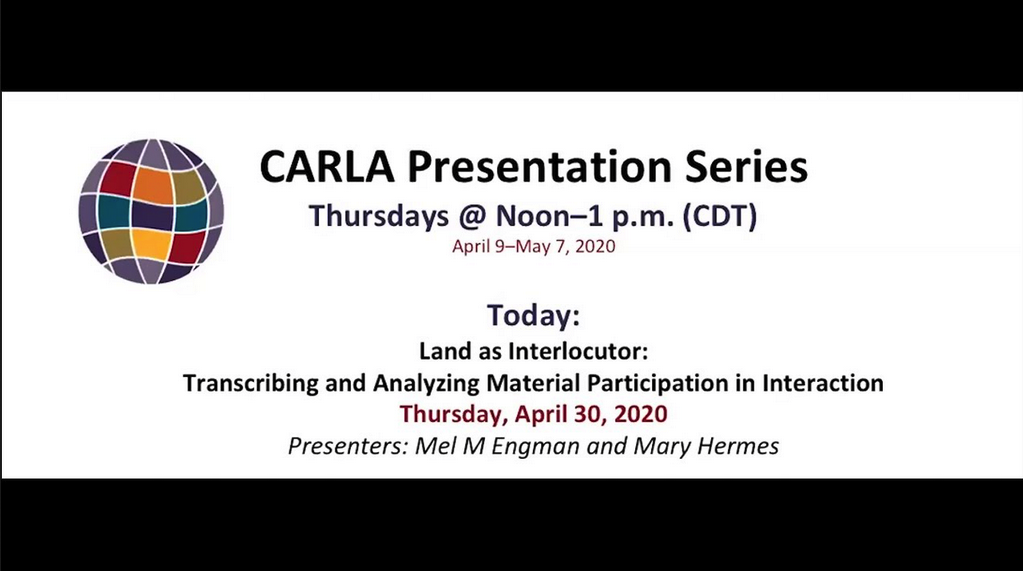
Engman, M. & Hermes, M. (2020, April 30). "Land as Interlocutor: Transcribing and Analyzing Material Participation in Interaction."
In recent years, materials use scholarship has expanded beyond creation and evaluation concerns to include research examining the relationships between language learners' development and their interactions with the material world (Guerrettaz et al., 2018; Guerrettaz & Johnston, 2013; Toohey, 2015). As centers of inquiry have shifted so have methods, particularly toward approaches that allow for greater attention to situated action. Yet, relying on methodologies that were developed for the purpose of examining human-human interaction to instead examine human-nonhuman relationships can present numerous challenges.
This paper presents one example of the methodological challenges associated with transcription and analysis of Indigenous multilingual language learners interacting with the natural and material world of the forest. Using point of view cameras to capture line-of-sight and movement through space, we videorecorded small groups of multilingual Ojibwe Elders and youth as they walked and talked together in the woods in order to better understand the relationships between Indigenous language reclamation and land-based pedagogy with land-as-materials.
We show how centralizing Indigenous ontologies (Deloria, Jr., 1999; Hermes, 2005) restructures the relationships between humans and nonhumans, revealing unforeseen limitations to a microinteractional approach to materials use research. We then illustrate how Goodwin 's (2000) theory of action, particularly his notion of substrate, can be leveraged to support Ojibwe relational perspectives (Simpson, 2014), to better understand how Indigenous Ways of Knowing (IWOK) (Bang & Marin, 2015; Kawagley, 1993) are generated in intergenerational Ojibwe conversations on and with the land. This research contributes to current conversations in the field of applied linguistics surrounding multimodality, Indigeneity, and materialism.
Presenters:
Mel M Engman is a Lecturer in the School of Social Science, Education, & Social Work at Queen's University Belfast (QUB). Mel's research focuses language and sign in education, especially Indigenous and heritage language reclamation/maintenance contexts.
Mary Hermes is Professor in Second Language Education at the University of Minnesota. Her research focuses on language revitalization and how it can connect people to the land and the planet.
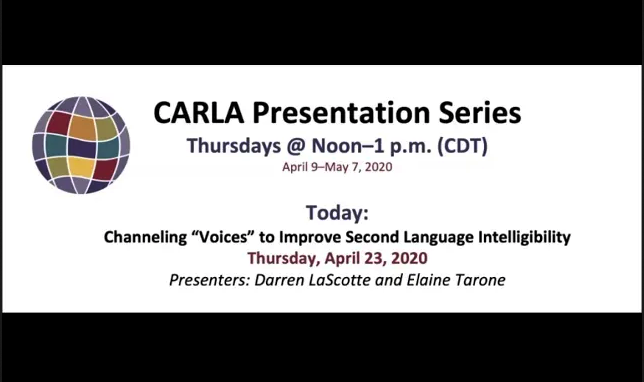
LaScotte, D. & Tarone, E. (2020, April 23). "Channeling 'Voices' to Improve Second Language Intelligibility."
This research study shows how international students enrolled in different levels of an intensive English institute modified their suprasegmental speech patterns and coordinating nonverbals in appropriating the voices of model speakers. LaScotte and Tarone (2019) argue that emerging L2 proficiency can be conceptualized as consisting of distinct voices—each voice a linguistic variety internalized in social context that retains characteristics of their original speakers—with significant differences in grammatical accuracy and fluency. Related studies show these voices can significantly alter suprasegmentals, nonverbals, and discourse styles in ways known to improve intelligibility (Tarone & Meyers, 2018). Drawing on Bakhtinian sociocultural theory (e.g., Broner & Tarone, 2001), this study analyzes the video-recordings of seven English learners ' verbal and nonverbal linguistic features over time as they learned to "mirror" the speech of fluent speakers of English they had selected as models. Data were collected over seven weeks in an elective course focused on pronunciation improvement. Participants took part in a Mirroring Project (Lindgren et al., 2003; Meyers, 2013) in which they selected, memorized, and performed a segment from a TED Talk or YouTube video by a model English speaker. Participants were then instructed to "channel" their model English speaker 's voice in speaking about their own major or place of employment. Data samples were analyzed in terms of pitch and intensity using Praat software (Boersma & Weenink, n.d.). Findings demonstrate that speakers learned to produce (sometimes dramatic) shifts in these features of learner language, which are known to promote intelligibility; findings suggest that interaction with semiotic resources (i.e., videos) is a valuable tool in pedagogical approaches that are congruent with an emerging transdisciplinary framework of L2 use and acquisition (Douglas Fir Group, 2016).
Presenters:
Darren LaScotte is an ESL Teaching Specialist in the Minnesota English Language Program. Within the broader scope of applied linguistics and sociolinguistics, his research focuses on second language acquisition and use, and on the resulting implications for teaching and learning.
Elaine Tarone is Distinguished Teaching Professor Emerita at the University of Minnesota where she taught graduate courses in Second Language Education, and served as the Director of CARLA. She continues to do research on second-language acquisition and provide professional development for language teachers.
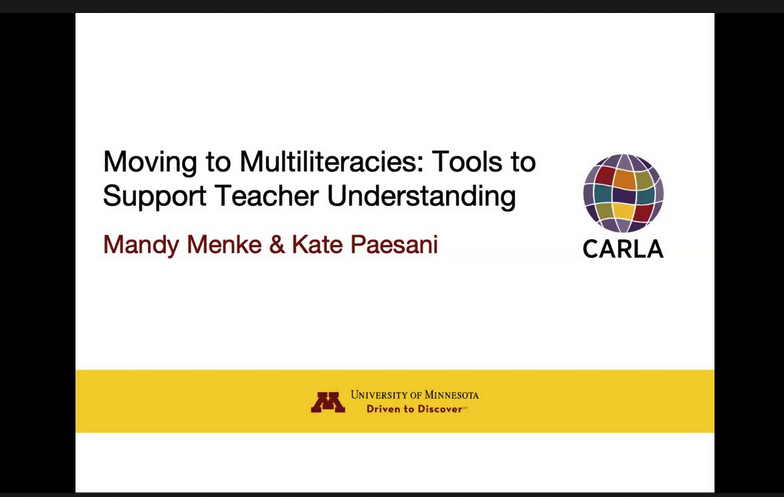
Paesani, K. (2020, April 16). "Moving to Multiliteracies: Tools to Support Teacher Understanding."
Recent scholarship foregrounds multiliteracies pedagogy as a viable approach for developing students' foreign language literacies, yet few tools exist to assist teachers in implementing this approach. Following a brief overview of multiliteracies pedagogy, we present two tools for teachers that were developed in response to research findings from CARLA 's Foreign Language Literacies project: an infographic featuring multiliteracies and other meaning-based approaches and a lesson analysis checklist. Both tools bring together research and practice by helping teachers explain multiliteracies concepts, distinguish multiliteracies from other approaches, and scaffold multiliteracies lesson plans.
Presenter:
Kate Paesani is Director of the Center for Advanced Research on Language Acquisition (CARLA) and affiliate Associate Professor in the College of Liberal Arts at the University of Minnesota. Her research focuses on literacies-oriented curriculum and instruction and language teacher development, couched within the frameworks of multiliteracies pedagogy and sociocultural theory.
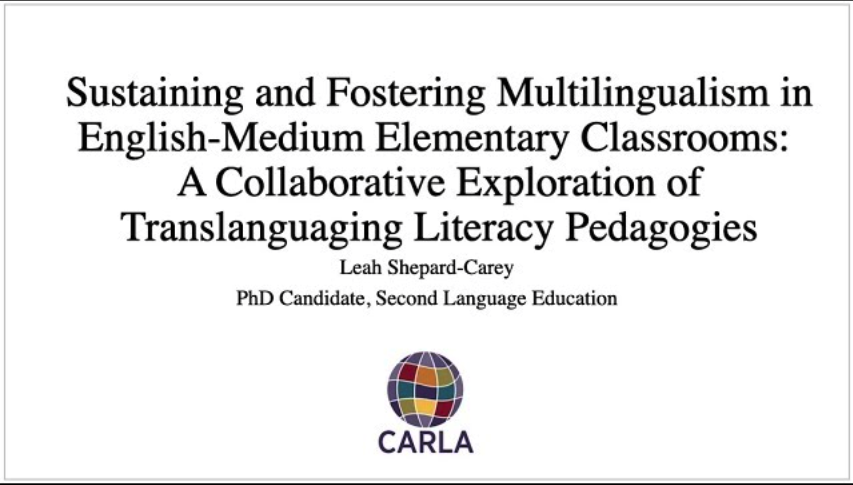
Shepard-Carey, L. (2020, March 4). "Sustaining and Fostering Multilingualism in English-Medium Elementary Classrooms: A Collaborative Exploration of Translanguaging Literacy Pedagogies."
CARLA Fellow Presentation:
With over 4.8 million students classified as English Learners in the United States and many more who are multilingual, educators are called to draw upon students ' first languages as part of a culturally- and linguistically-sustaining approach to education. Despite the growing interest and research surrounding translanguaging pedagogies, which aim to purposefully integrate students ' first languages into instruction, research has yet to fully address the complexity and challenges of implementing such pedagogies, particularly with younger students from less common language backgrounds, such as Somali.
In this presentation, Shepard-Carey discusses preliminary findings from year one of a two-year design-based study in a second-grade English-medium classroom. These data derive from the larger project, which explores the potential and complexity of employing translanguaging pedagogies during reading instruction with young emergent bilinguals of Somali linguistic and cultural backgrounds. Specifically, during this presentation, she discusses a qualitative case study that examines how translanguaging ideologies and pedagogies were negotiated and mobilized during small-group reading instruction in the first year of this project. She concludes the presentation with implications for pedagogy and research and a brief description of the work moving forward.
Presenter:
Leah Shepard-Carey is a PhD candidate in Second Language Education in the Department of Curriculum and Instruction. Leah 's research interests include multilingualism, literacy learning, and collaborative and equity-oriented approaches related to language teaching and learning in elementary contexts. Her research explores the ways teachers can integrate elementary emergent bilinguals ' first languages during instruction in English-medium classrooms, with particular emphasis on supporting learners from less-common language backgrounds.
This presentation is cosponsored by the Second Language Education Program in the Department of Curriculum and Instruction.
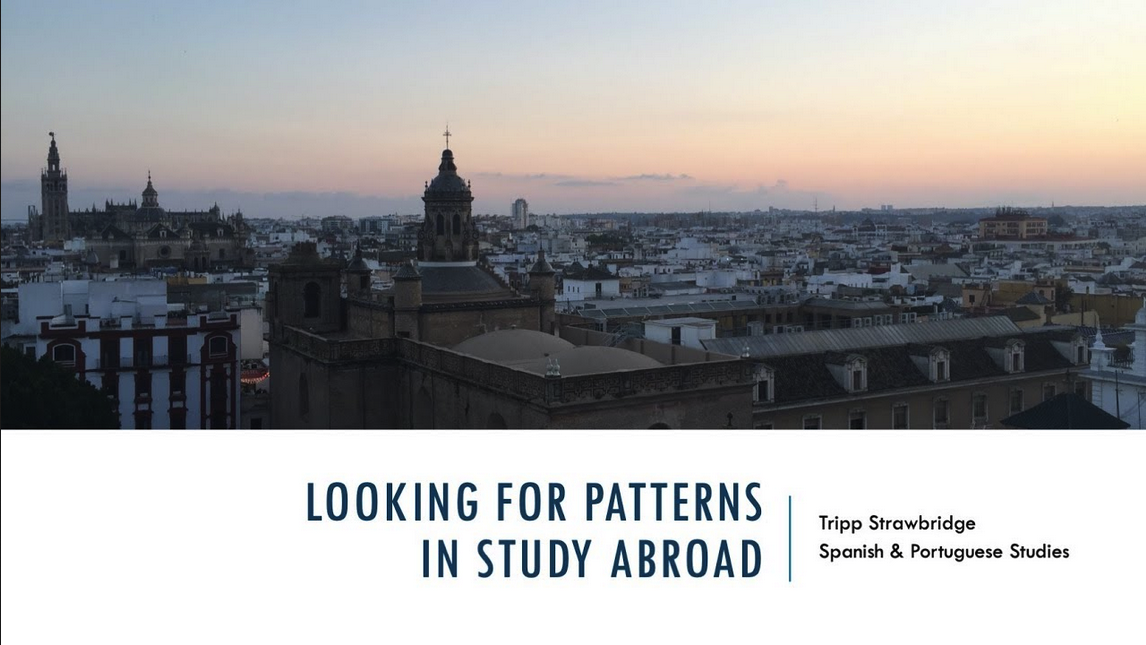
Strawbridge, T. (2020, February 25). "Looking for Patterns in Study Abroad: Language Use, Language Gain, and Social Network."
Despite the popular belief that study abroad provides an ideal environment for second language acquisition (SLA) to occur, previous research has been largely unable to show if, and under which circumstances, such experiences abroad may lead to second language (L2) development. This presentation discusses the application of social network analysis as a means of identifying patterns in the diverse social and linguistic experiences of L2 learners while studying abroad. In particular, the presentation discusses the results of a study examining the L2 Spanish proficiency development of 45 students studying abroad in Spain; the relation of this development to patterns in these students ' social networks; and the ways in which these patterns are in turn influenced by study abroad program structure.
Presenter:
Tripp Strawbridge is a PhD candidate in Hispanic Linguistics in the Department of Spanish and Portuguese Studies. His research interests include second language acquisition (SLA) as it occurs in study abroad; language proficiency testing and its relation to curriculum design; and SLA in computer-mediated communication.
This presentation is cosponsored by the Department of Spanish and Portuguese Studies.
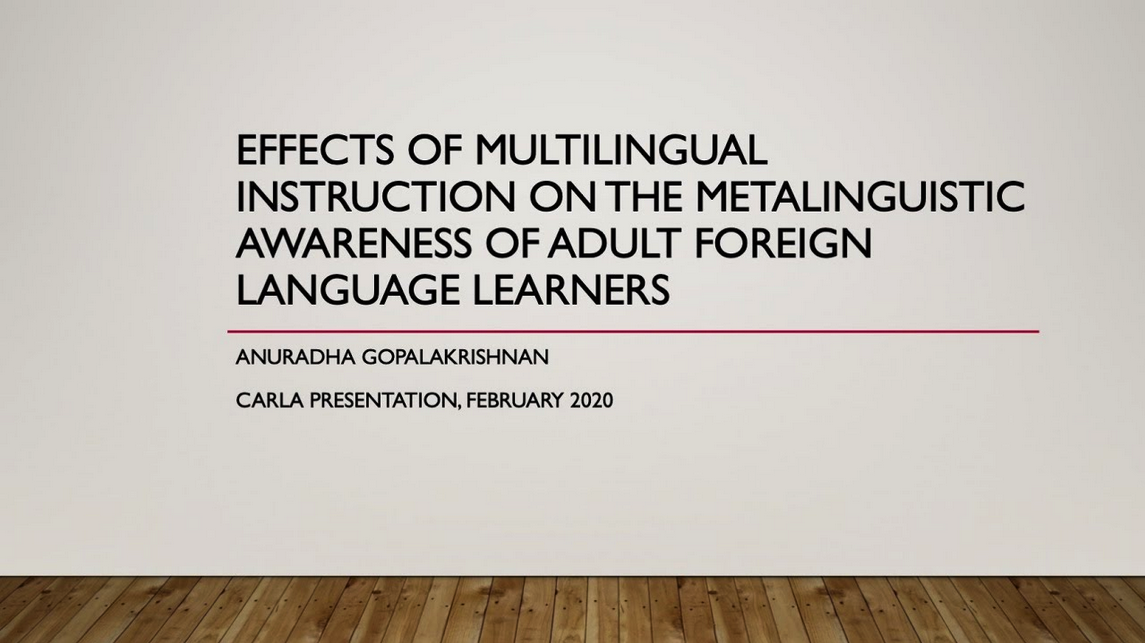
Gopalakrishnan, A. (2020, February 18). "Effects of Multilingual Pedagogy on the Metalinguistic Awareness of Foreign Language Learners: A Quasi-Experimental Study."
As multilingual pedagogies become increasingly popular, a need to understand its effects on the language learner is also on the rise. This study examined how an instructional sequence that leveraged multilingual learners ' entire linguistic repertoire influenced their metalinguistic awareness over the course of a 16-week language program. The presentation briefly described the instructional sequence that the experiment group consisting of adult foreign language learners of German in India received. Then preliminary findings from a quasi-experimental study that compared the metalinguistic awareness of learners in the experiment group at the end of the 16 weeks with that of learners in a control group was presented. The presentation concluded with pedagogical implications of the findings and directions for future research.
Presenter:
Anuradha Gopalakrishnan is a PhD candidate in Second Language Education in the Department of Curriculum and Instruction. Her research interests include multilingual pedagogies in foreign language instruction, and the role and place of the English language in postcolonial India.
This presentation is cosponsored by the Second Language Education Program in the Department of Curriculum and Instruction.
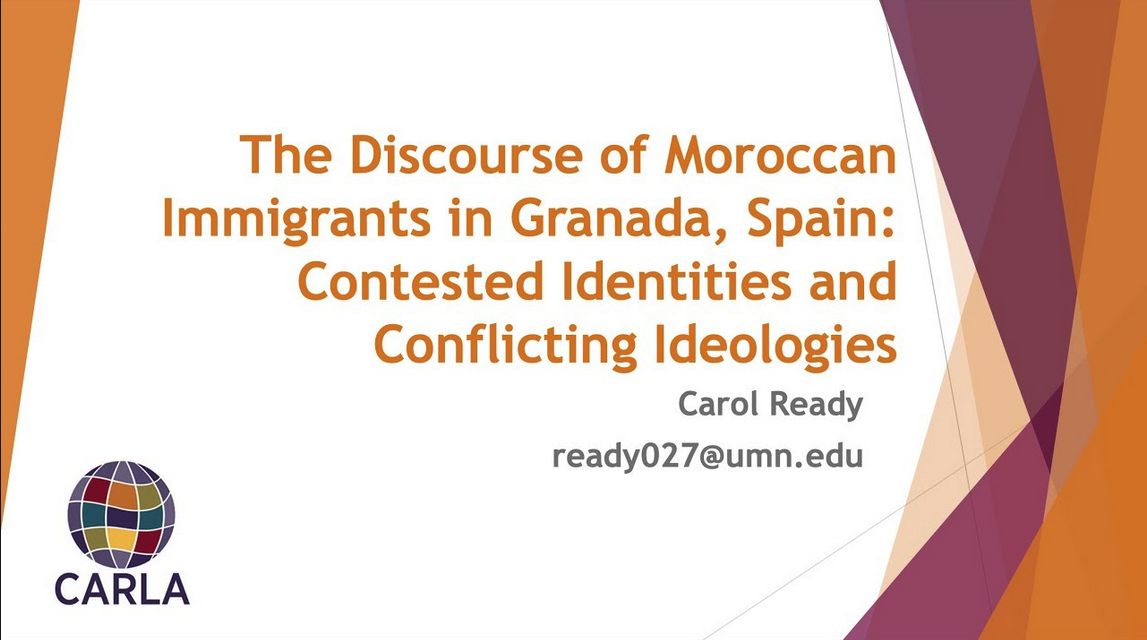
Ready, C. (2020, February 13). "The Discourse of Moroccan Immigrants in Granada, Spain: Contested Identities and Conflicting Ideologies."
Language use is often at the center of the debate regarding migrant populations as is the case for Moroccan immigrants in Spain whose linguistic, cultural, and religious practices are under scrutiny and suspicion. Focusing on the Moroccan immigrant population of Granada, Spain, the presenter examines when, how, and where multilingual Moroccan immigrants and their descendants use the languages they speak as well as the role of religious and cultural identity, attitudes and ideologies in their linguistic practices. The presenter also examines how Moroccan immigrants position themselves in discourse and how this positionality can be used to mobilize support for their multilingual practices. The conflicting language ideologies of Moroccans in Granada which either lend support to or place limits on their multilingual practices are discussed.
Presenter:
Carol Ready is a PhD candidate in the Department of Spanish and Portuguese Studies in cotutelle with the Department of Languages, Texts, and Contexts at the University of Granada in Granada, Spain. She specializes in Hispanic Linguistics with research interests in sociolinguistics, bi- and multilingualism, language contact, language policy, language acquisition, and pedagogy. Her current work focuses on the sociolinguistic, cultural, and ideological aspects of Arabic and Spanish in Spain.
This presentation is cosponsored by the Department of Spanish and Portuguese Studies.
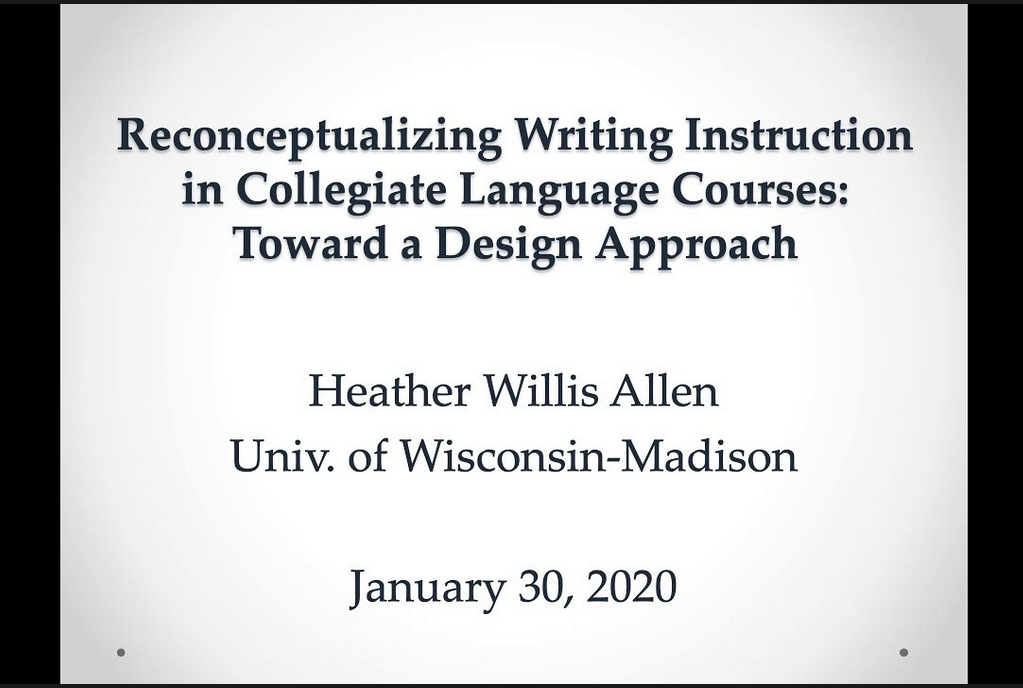
Willis Allen, H. (2020, January 30). "Reconceptualizing Writing Instruction in Collegiate Language Courses: Toward a Design Approach."
Although writing is a critical skill in personal, educational, and professional domains, its role in language education in the United States is unclear and several recent studies have identified presentational writing as the most difficult linguistic modality to teach and the one that students struggle with the most. Why is this the case and what are the perspectives of language educators today on teaching writing? This presentation begins by sharing data from a qualitative study on collegiate language instructors ' beliefs and practices related to teaching writing. In the second half of the presentation, Willis Allen argues in favor of an integrated pedagogy for writing instruction, i.e., a Design approach, based on second language writing research and multiliteracies pedagogy and describes principles of this approach. The presentation concludes with implementation considerations and directions for future research.
Presenter:
Heather Willis Allen is Associate Professor of French in the Department of French and Italian at the University of Wisconsin-Madison and a core faculty member of her university 's second language acquisition doctoral program. She teaches undergraduate French courses and graduate courses in applied linguistics and serves as Course Chair for Elementary French One and Two and Intermediate French One in her department. Her research has appeared in the ADFL Bulletin, Foreign Language Annals, the French Review, L2 Journal, and the Modern Language Journal. Her collaborative projects have included co-authoring A Multiliteracies Framework for Collegiate Foreign Language Teaching (2016 with Kate Paesani and Beatrice Dupuy) and Alliages Cultures: La Société Française en Transformation (2013 with Sebastien Dubreil) and co-editing the 2011 AAUSC volume Educating the Future Foreign Language Professoriate for the 21st Century with Hiram Maxim. Her current project is a book-length monograph on the use of Design pedagogy for teaching second language writing.
This presentation is funded via a Teaching Innovation Grant from the Center for Educational Innovation. Additional cosponsors include the Department of Spanish and Portuguese Studies, the Department of German, Nordic, Slavic and Dutch, and CARLA.
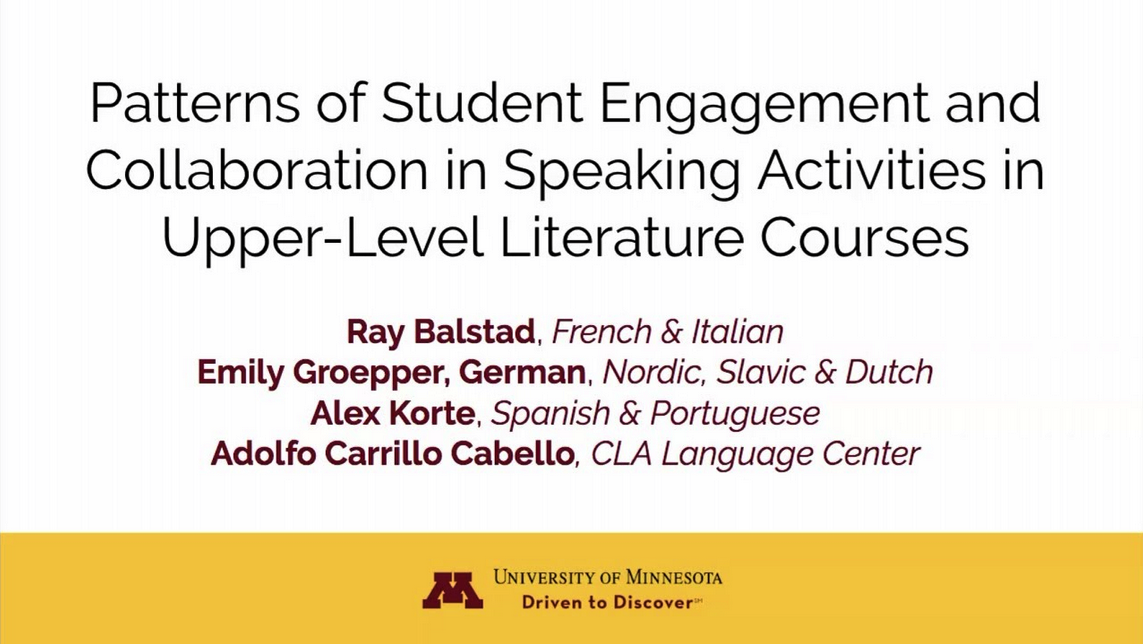
Balstad, R., Carrillo Cabello, A., Groepper, E., & Korte, A. (2019, November 7). "Patterns of Student Engagement and Collaboration in Speaking Activities in Upper-Level Literature Courses."
For three consecutive years, the federally-funded Proficiency Assessment for Curricular Enhancement (PACE) Project at the University of Minnesota conducted standardized language proficiency testing (i.e., ACTFL) in three modalities (speaking, listening, and reading) with students (n=2065) enrolled at year-end levels in seven language programs: Arabic, Chinese, French, Korean, Portuguese, Russian, and Spanish. This large-scale proficiency testing revealed that students' speaking development tends to plateau during the third year of language study. To help students continue to improve their language skills in more traditional content courses, the Advanced Speaking Initiative supported the design and implementation of approaches and activities that elicit extended discourse in upper-level French, German, and Spanish courses.
In this presentation, we share findings from analyses of student speech and collaboration patterns as they occurred in these course interventions. Presenters will describe pedagogical strategies that enhance or hinder student speaking development and will provide guidelines for implementing speaking activities for in-class and out-of-class practice based on their findings.
Presenters:
Ray Balstad (French & Italian), Adolfo Carrillo Cabello (CLA Language Center), Emily Groepper (German, Nordic, Slavic, & Dutch), and Alex Korte (Spanish & Portuguese).
This presentation is cosponsored by the CLA Language Center.
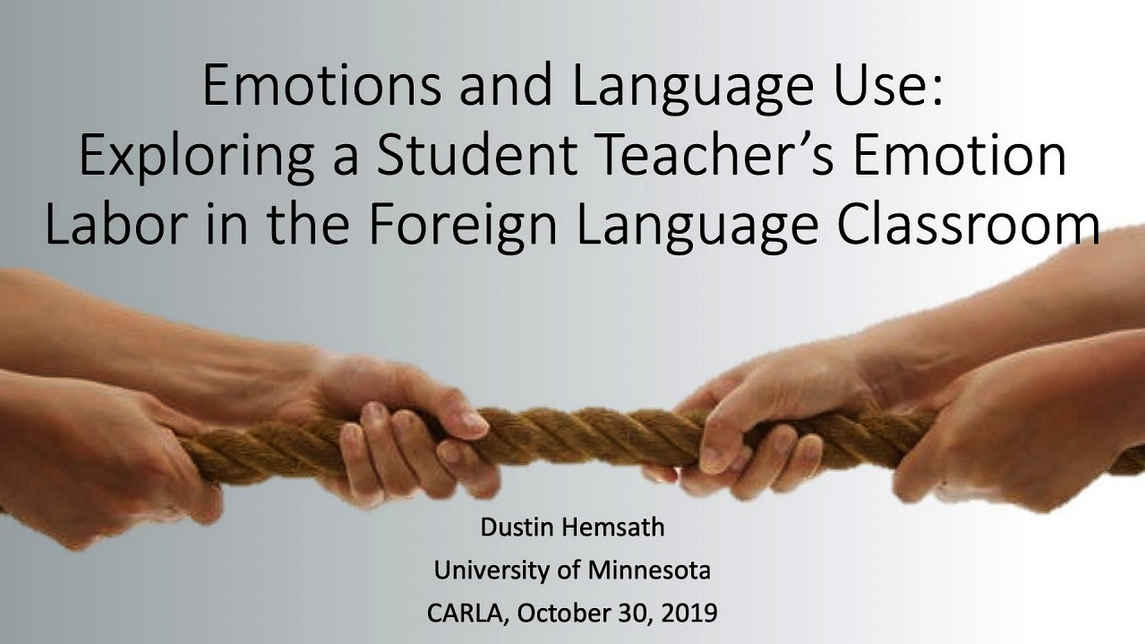
Hemsath, D. J. (2019, October 30). "Emotions and Language Use: Exploring a Student Teacher's Emotion Labor in the Foreign Language Classroom."
This study explores the emotion labor a pre-service foreign language teacher experiences regarding his use of English during instruction in a U.S. secondary Spanish classroom. Using discourse analysis, the presenter examines the transcription of a semi-structured interview between Maxwell, the student teacher, and Hemsath, his clinical supervisor, about his language use during instructional time. Using positionality theory, Hemsath analyzes hedging and ambiguity within Maxwell's narrative accounts to discover how he aligns and disaligns his language-use philosophies with his own. He ends with implications for increasing attention on the development of professional identities and on the emotional health of pre-service teachers in licensure programs.
Presenter:
Dustin J. Hemsath is a Ph.D. student in Second Language Education in the Department of Curriculum and Instruction and currently working as a Supervisor of world language and ESL teacher candidates in the SLE licensure program. His research interests are in language teacher education, foreign language teaching and learning, and bilingualism.
This presentation is cosponsored by the Second Language Education program in the Department of Curriculum and Instruction.
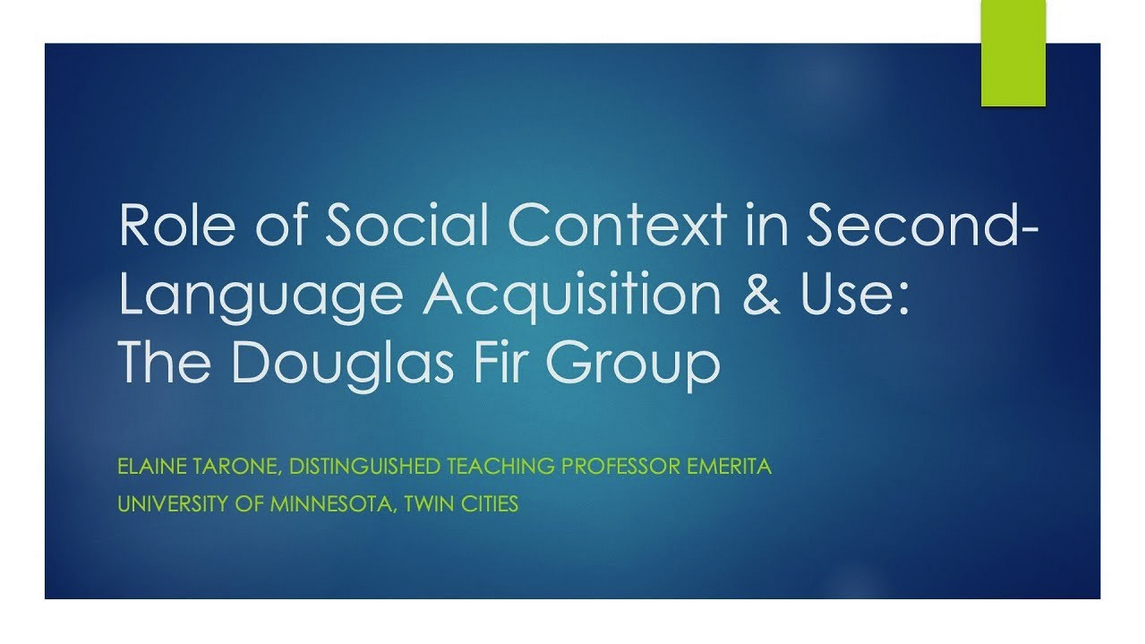
Tarone, E. (2019, October 15). "The Role of Social Context in Second Language Acquisition and Use: The Douglas Fir Group."
In 2016 the Douglas Fir Group (DFG) published a position paper in the Modern Language Journal, proposing a framework in which social context is central to research on second language acquisition (SLA). The presenter, a member of the DFG, describes how this framework grew historically out of an ongoing tension between cognitive and social approaches to SLA.
Presenter:
Elaine Tarone is Distinguished Teaching Professor Emerita at the University of Minnesota. Until her retirement, she taught graduate courses in Second Language Education, and was Director of CARLA. She continues to do research on second-language acquisition and provide professional development for language teachers.
This presentation is cosponsored by the Second Language Education program in the Department of Curriculum and Instruction.
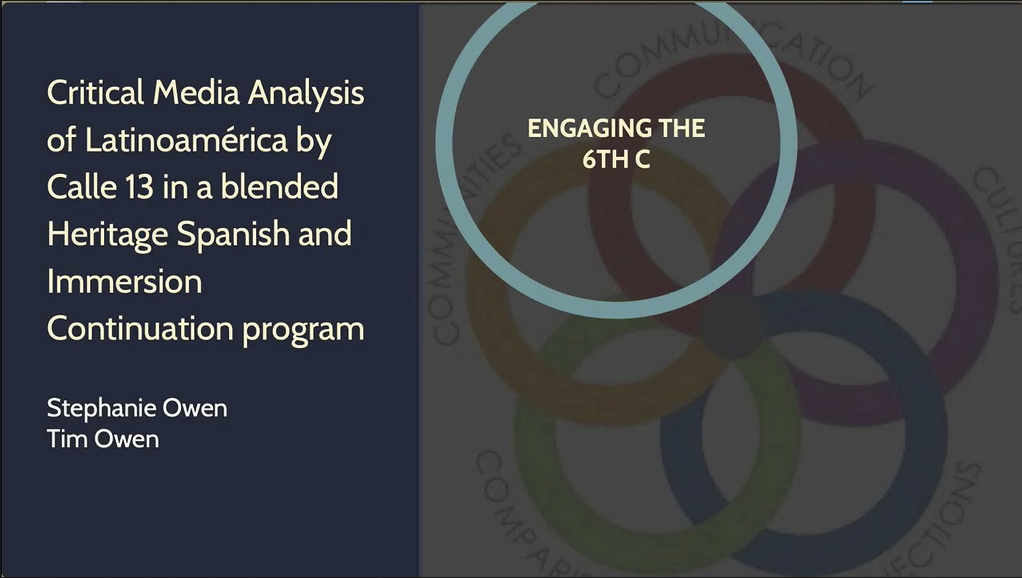
Owen, S. (2019, October 10). "Engaging the 6th C: Critical Media Analysis of Latinoamérica by Calle 13."
This talk highlights curricular redesign to address a local Spanish teacher's 'greatest professional challenge' -- teaching a 10th grade blended class of Spanish heritage and home English immersion learners of Spanish using prescribed World Language curriculum.
The presenter will highlight how a popular song, Latinoamérica by Puerto Rican Hip Hop group Calle 13, became a tool to teach academic content and language through a critical, multimodal analysis. What is the videographer trying to communicate about Latinamerican people with his choices of sound, gesture, speech, images, color, gaze and movement? How does the songwriter use metaphor and personification to forefront Latinx historical and cultural identities?
Presenter:
Stephanie Owen taught Spanish for 20 years before entering the SLE Ph.D program at the University of Minnesota. She now coordinates and instructs in the M.Ed. K-6 Licensure program with focus on Dual Language and Immersion housed in the Department of Curriculum and Instruction.
This presentation is cosponsored by the Second Language Education program in the Department of Curriculum and Instruction.
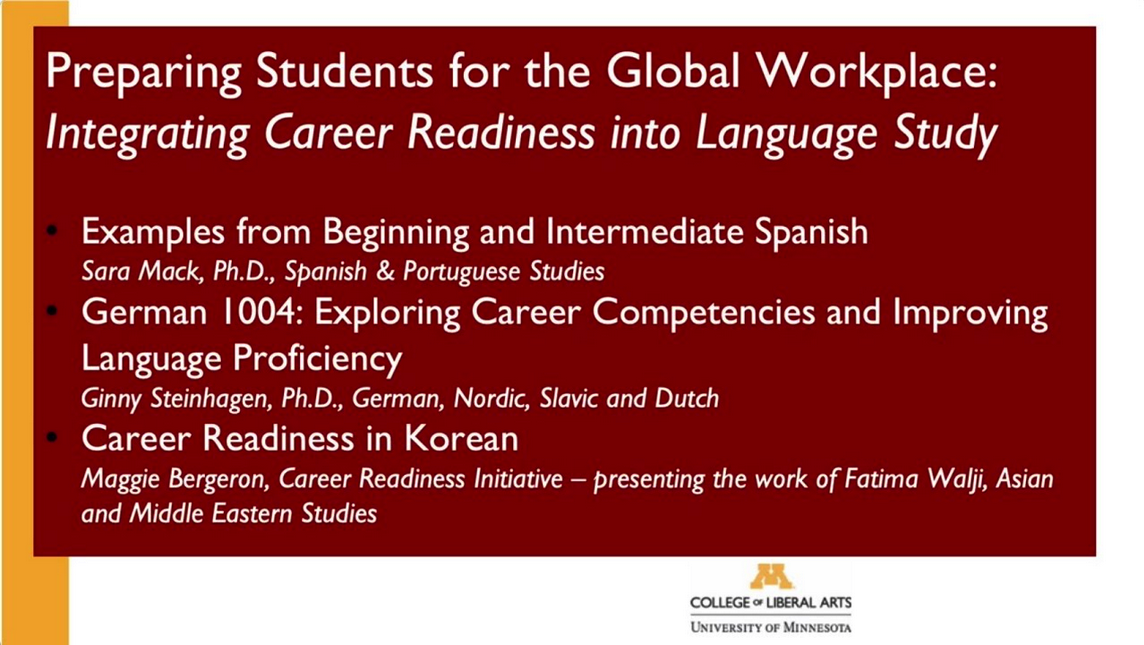
Bergeron, M., Mack, S., & Steinhagen, G. (2019, September 24). "Preparing Students for the Global Workplace: Integrating Career Readiness into Language Study."
This panel presentation showcased faculty experiences with integrating CLA Career Readiness core competencies across different levels of second language study. A focus on career readiness has a number of benefits, including fostering cross-disciplinary connections, strengthening articulation across course levels, and improving student recruitment and retention. Language instructors shared individual projects developed in the CLA Career Readiness Faculty Cohort Program and members of the Career Readiness team provided information about the program. The panel was moderated by Kate Paesani, Director of the Center for Advanced Research on Language Acquisition (CARLA) and included a brief welcome by Ascan Koerner, Associate Dean of Undergraduate Education in the College of Liberal Arts.
Presenters:
Maggie Bergeron (Career Readiness Initiative; presenting the work of Fatima Walji from Asian and Middle Eastern Studies), Sara Mack (Spanish & Portuguese), and Ginny Steinhagen (German, Nordic, Slavic, & Dutch).
This presentation is cosponsored by the CLA Career Readiness Initiative.
2018-2019
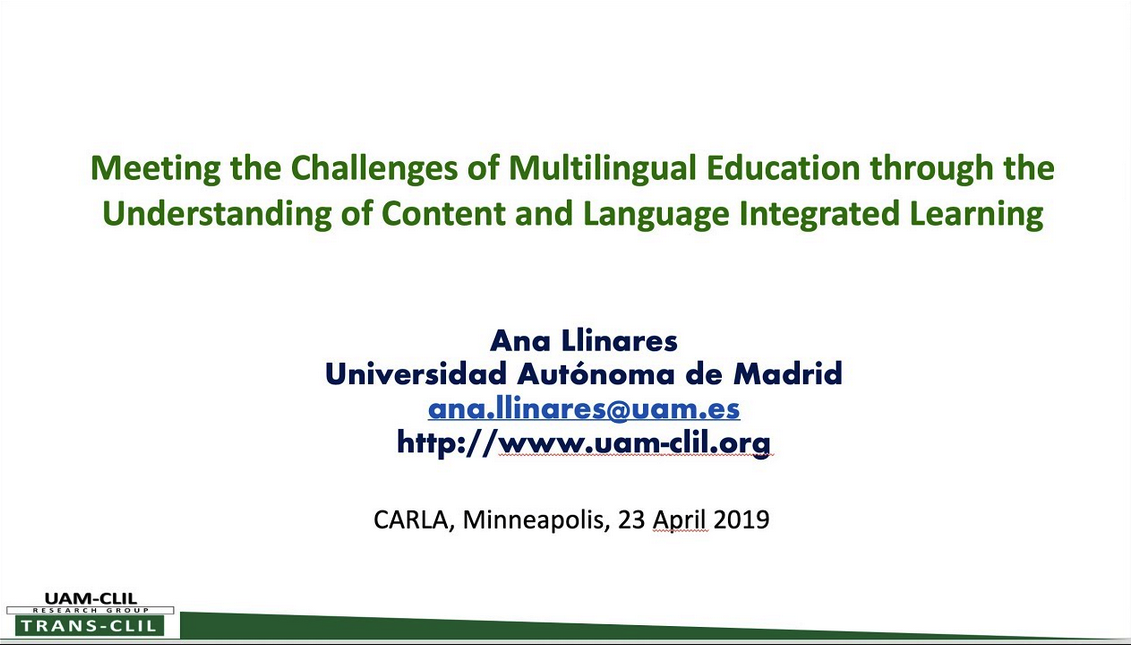
Llinares, A. (2019, April 23). "Meeting the Challenges of Multilingual Education through the Understanding of Content and Language Integrated Learning."
After more than two decades of CLIL implementation and research in Europe and beyond, it seems clear to both the research and education communities that its objectives and challenges go beyond the improvement of learners' competence in an additional language. In order to succeed at school, CLIL learners who study different subjects or disciplines in a second/third language need to be familiar with the linguistic demands of these disciplines, and teachers need to know what challenges are specifically related to the additional language and which are subject-, mode,- or activity-related language issues, which affect students academic performance, no matter if the language of instruction is the L1 or an L2/L3. In this scenario, recent studies have addressed the importance of exploring content and language integration and have attempted to present theoretically-informed models that allow researchers, and ultimately CLIL teachers, to evaluate students' academic language performance to convey specific disciplinary knowledge (e.g. Llinares 2015; Nikula et al. 2016).
Drawing on some results from the TRANS-CLIL research project, in this session I will explore and illustrate the concept of content and language integration from three perspectives: a) students' academic spoken and written production; b) their content and language engagement in classroom interactional activities; and c) students' motivation and beliefs about learning their school subjects in English. These issues will be addressed in the context of the transition from primary to secondary school and in relation to different degrees of exposure to CLIL in the Spanish context.
Presenter:
Ana Llinares has published extensively on content and language integrated learning. She is the leader of the UAM-CLIL research group at the Universidad Autónoma in Madrid.
This presentation is sponsored by the Second Language Education program in the Department of Curriculum and Instruction and is cosponsored by CARLA.
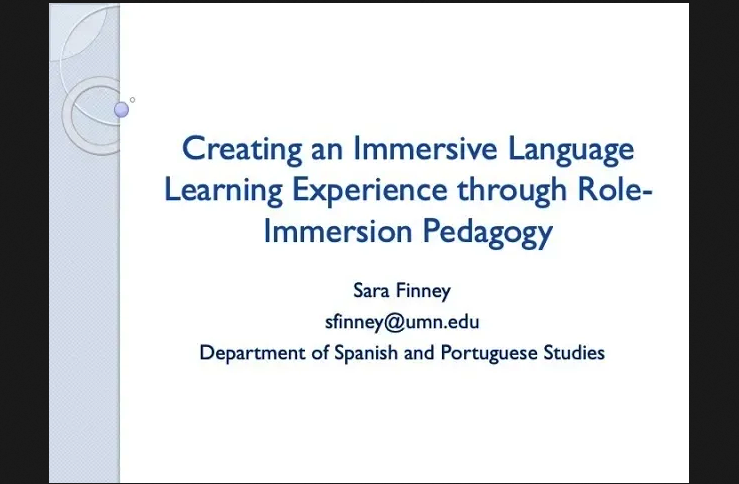
Finney, S. (2019, April 10). "Creating an Immersive Language Learning Experience through Role-Immersion Pedagogy."
This presentation will share findings related to student perceptions of a US-Mexico border role-immersion pedagogy carried out in an intermediate Spanish course. Role-immersion pedagogies aim to bring a highly contextualized alternate reality to life in the classroom in order to create an immersive and experiential learning encounter. In this five-week study, learners explored diverse perspectives related to the issues of drug trafficking and violence at the US-Mexico border, adopted and developed real-world cultural identities, and ultimately worked jointly to achieve individual and collective goals focused on curbing these complex problems. The qualitative data shared in this presentation will focus on student impressions of the pedagogy and how the process of understanding and enacting an alternate subjectivity contributed to these impressions. The presenter will conclude with implications for foreign language curriculum design.
Presenter:
Sara Finney is the Intermediate Spanish Coordinator in the Department of Spanish and Portuguese Studies. Her research interests include foreign language pedagogy with a focus on learner agency, experiential learning, and intercultural empathy.
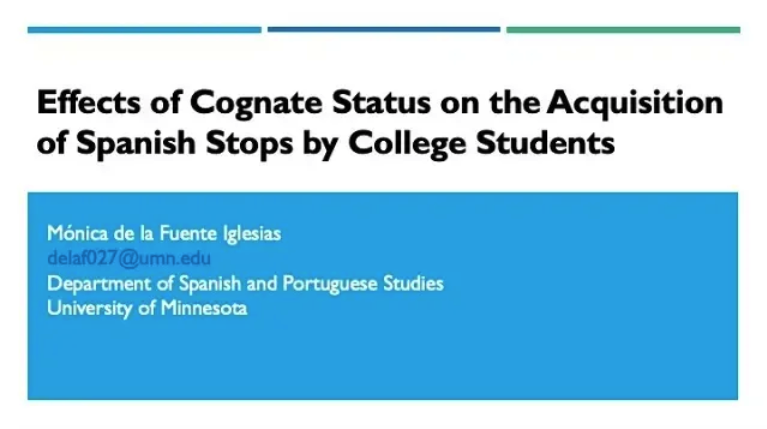
de la Fuente Iglesias, M. (2019, March 28). "Effects of Cognate Status on the Acquisition of Spanish Stops by College Students"
While the study of /p, t, k/ in learners of Spanish has been addressed quite extensively, the cognate status in the realizations of stops has not received as much attention. Previous studies have limited their analysis to the production of /t/ and have found mixed results. This presentation explores the development in the production of the voiceless stops by differing levels of learners of Spanish to determine whether lexical items that are orthographically and phonologically similar (cognates) and lexical items that are not similar in form (non-cognates) enhance cross-language phonetic interferences. The study also includes a control group of native speakers of Spanish. Using data from a reading aloud task, the results indicate an effect of cognate status, particularly for advanced learners, who overall have acquired a native-like pronunciation, but still do not display an optimal production of cognates. Implications of the findings will be discussed for models of bilingual speech processing.
Presenter:
Mónica de la Fuente Iglesias is a PhD candidate in the Hispanic Linguistics program in the Department of Spanish and Portuguese Studies. Her main research examines effects of language contact between Spanish and Galician in Spain. She has also researched several areas including morphology and experimental phonetics in the field of Spanish second language acquisition.
This presentation is cosponsored by the Department of Spanish and Portuguese Studies.
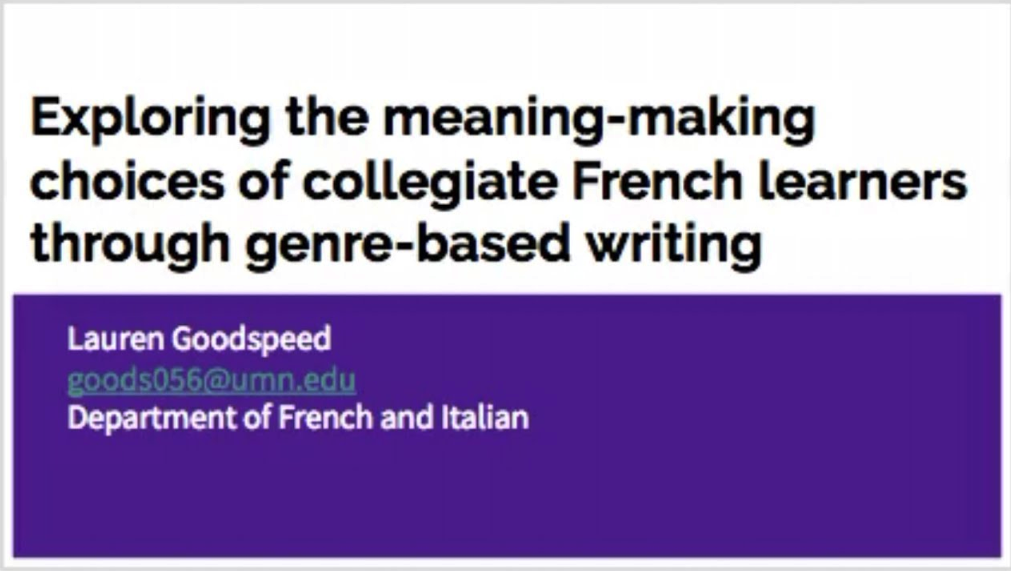
Goodspeed, L. (2019, March 7). "Exploring the Meaning-Making Choices of Collegiate French Learners Through Genre-Based Writing."
In foreign language (FL) instruction, the role of writing is often limited due—in part—to the fairly prevalent belief that successful FL texts are characterized primarily by accurate language. Scholars, however, have challenged this belief by insisting that FL writing also has important cognitive and sociocultural dimensions that must be attended to through classroom instruction (e.g., Byrnes, Hyland, Kern). Two pedagogical approaches that account for these dimensions are multiliteracies and genre pedagogy; yet, empirical studies that address how FL learners develop awareness of the multiple dimensions of successful FL writing remain quite limited.
The study presented in this talk explores the written meaning-making practices of 25 lower-level collegiate FL learners by focusing on the reasons for which they drew on model text resources in their genre-based tasks. Qualitative analysis of text-based interviews showed that learners used model texts for a variety of reasons that reflected the linguistic as well as the cognitive and sociocultural dimensions of writing, highlighting the importance of model texts for FL learners' development of multiple literacies.
Presenter:
Lauren Goodspeed is a Lecturer in the Department of French and Italian and Coordinator of French 1002, 1022, and 1003. Her research centers on applications of multiliteracies pedagogy for the foreign language classroom, particularly in regard to second language writing.
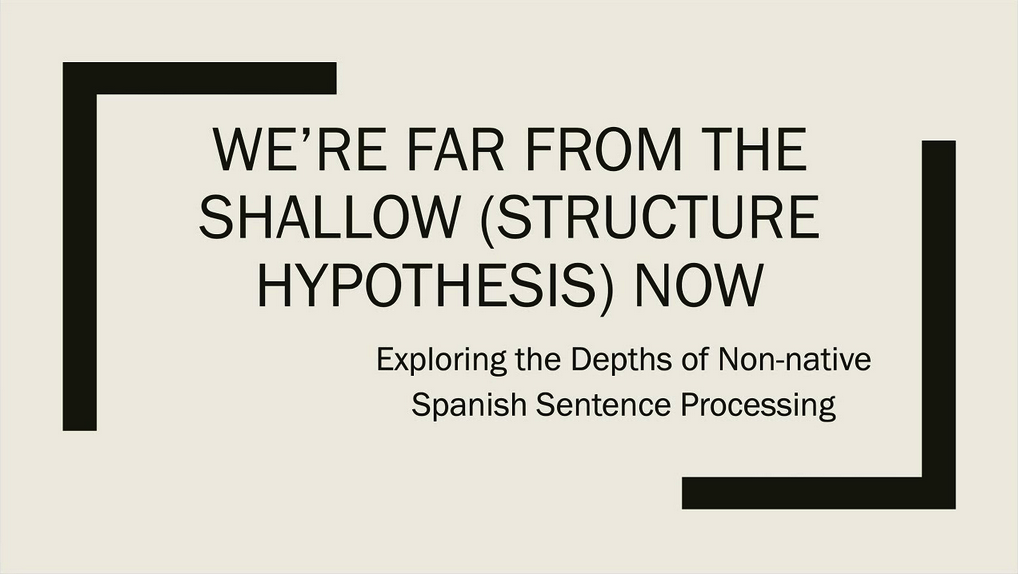
Simonsen, R. (2019, February 13). "We're Far from the Shallow (Structure Hypothesis) Now: Exploring the Depths of Non-native Spanish Sentence Processing."
The Shallow Structure Hypothesis maintains that second language learners do not process sentences as fully as native speakers. In other words, they process grammatical information in a "shallow," incomplete way. However, it is not clear if second language learners are forever restricted to shallow processing, as the Shallow Structure Hypothesis predicts, or if learners can in fact overcome their non-native processing patterns with advanced proficiency.
In this presentation, I discuss the results from a cross-sectional self-paced reading study in which I examined the sentence processing strategies of three groups of second-language Spanish learners: fourth-semester students, Spanish minors/majors, and people with an MA or PhD who use Spanish professionally. Specifically, I documented learners' sensitivity to variations in word order and verb type in sentences. Through a comparison with a control group of native Spanish speakers, it was clear that fourth-semester students and Spanish minors/majors exhibited shallow processing. The group of participants with an MA or PhD, however, processed sentences in a native-like way; in real time, they were able to use word order cues to make predictions about the type of verb that would appear in a sentence. This study demonstrates the importance of considering a wide range of language proficiencies when formulating hypotheses and theories in SLA. Second language learners may only be restricted to shallow processing until they reach a considerably high threshold of proficiency—one which they are not likely to attain during their college years.
Presenter:
Russell Simonsen is a PhD candidate in Hispanic Linguistics in the Department of Spanish and Portuguese Studies. He specializes in second language sentence processing and foreign language pedagogy.
This presentation is cosponsored by the Department of Spanish and Portuguese Studies.
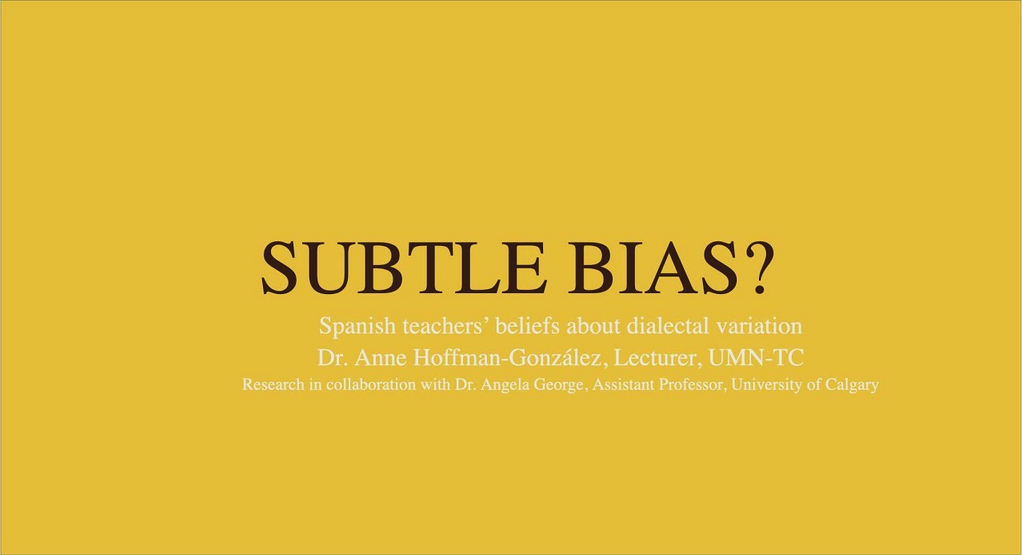
Hoffman-Gonzalez, A. (2019, February 6). "Subtle Bias? Spanish Teachers' Beliefs About Dialectal Variation."
This qualitative study conveys teacher attitudes toward the teaching of language variation by approximately 90 K-16 foreign language teachers in the USA. These same teachers also answered questions about their use of dialectally variable features in the classroom. Analysis of both open-ended and multiple choice questions reveals conflict between teachers' claims about best classroom practice and actual practice as well as conflicting opinions about dialectal variation in the language classroom.
Presenter:
Anne Hoffman-Gonzalez is a Lecturer in the Department of Spanish and Portuguese Studies at the University of Minnesota where she regularly teaches all levels of Spanish language and Spanish linguistics courses. Her research focuses on the use of dialectally variable features by nonnative speakers and native speakers in second dialect situations. She has presented her research at national and international conferences such as LASSO and AAAL.
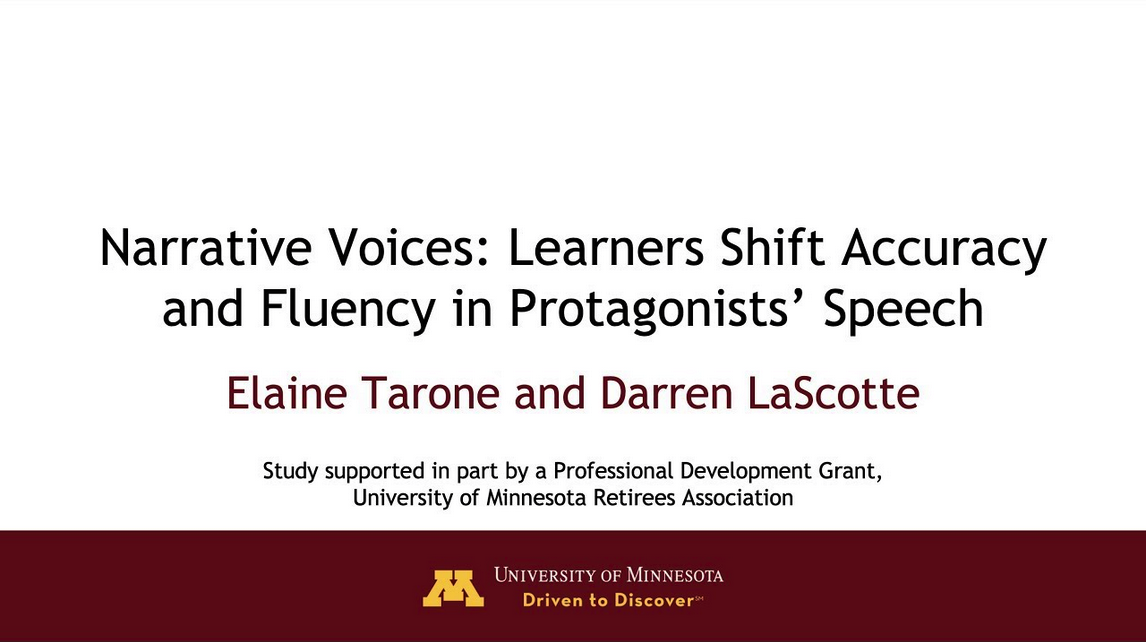
Tarone, E., & LaScotte, D. (2018, November 28). "Narrative Voices: Learners Shift Accuracy and Fluency in Protagonists' Speech."
This research study supports the idea that heteroglossia contributes to language learning in second language acquisition theory and bilingualism.
Bakhtin's (1934/1981) theory of heteroglossia differs from sociolinguistic constructs of variation in claiming that when acquiring a language, one internalizes different 'voices' of others, where 'voice' includes not just linguistic units, but also others' suprasegmentals, nonverbals, and social stances. The study analyzes speech samples from adult learners of English at different developmental levels as they engage in language play to produce narratives in their own voice, and as part of those same narratives, produce episodes of constructed dialogue that imaginatively recreate the 'voices' of their protagonists. We demonstrate important shifts in accuracy, complexity, fluency, and other features of learner language as the learners shift from their own voices to those of their protagonists, and we use a variationist and heteroglossic theory of second language acquisition to argue that all these voices form a part of their interlanguage competence. We claim on the basis of these findings that language play in constructing dialogue in oral narration is facilitative of SLA, and should be used more in classroom L2 pedagogy.
Presenters:
Elaine Tarone has published extensively on variationist approaches to second language acquisition; a retired professor at the University of Minnesota, she is a past director of CARLA.
Darren LaScotte is a Teaching Specialist in the Minnesota English Language Program and in the Department of French & Italian. Within the broader scope of applied linguistics and sociolinguistics, his research interests include language teaching practice, language play, and learner language variation across social contexts.
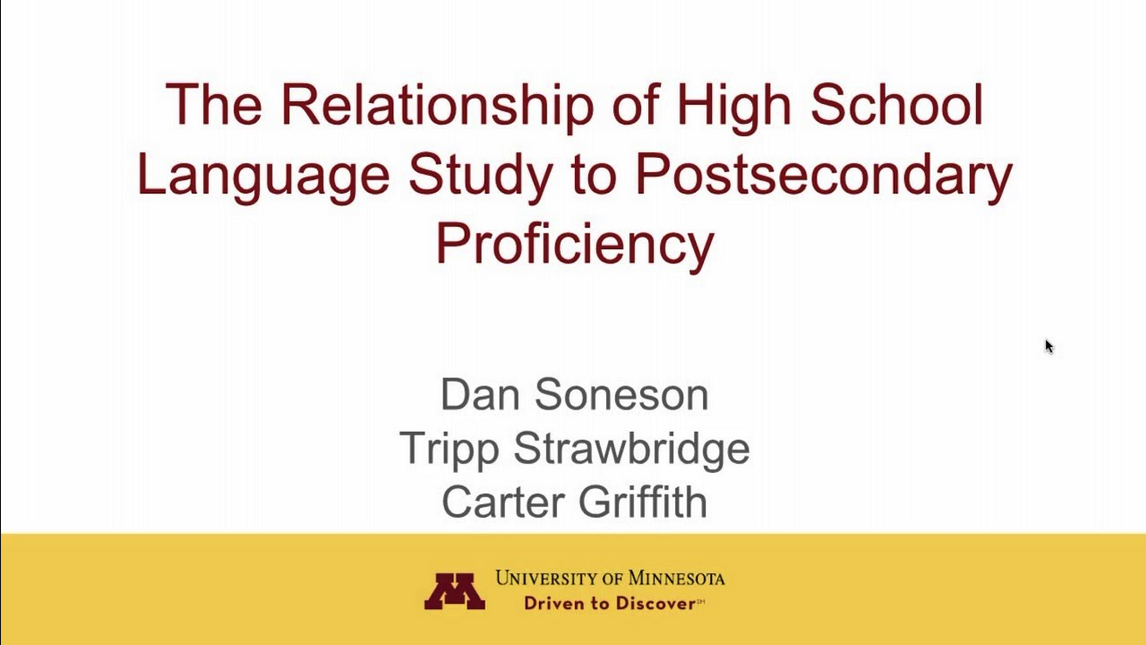
Soneson, D., Strawbridge, A., & Griffith, C. (2018, November 13). "The Relationship of High School Language Study to Postsecondary Proficiency."
To what extent does exposure to formal language learning at the secondary level affect language proficiency at the post-secondary level? Are there differences among students at the same stage in the second-language program that can be attributed to pre-university experience with the language?
The Language Flagship Proficiency Initiative PACE project at the University of Minnesota conducted ACTFL proficiency tests with over 2300 students in all levels of seven languages from 2014Ð2017. This study looked at data collected from over 1,100 students of French and Spanish during the three years of the PACE project to determine correlations between pre-university language study and proficiency and between placement in the program and language proficiency, and also looked at the most proficient learners in terms of their language background and placement.
The session presents our results which can have an impact on language offerings at the high school level and might also affect curricular emphases at the post-secondary level.
Presenters:
Dan Soneson is the Director of the Language Center in the College of Liberal Arts and is the Principal Investigator on the Flagship PACE project. He served as the managing editor of the IALLT Journal for Language Learning Technologies from 2010-2017, and has been a leader in language learning and technology for over 20 years.
Arthur "Tripp" Strawbridge is a PhD student in Hispanic Linguistics in the Department of Spanish and Portuguese Studies. His primary research interest is Spanish Second Language Acquisition, especially within the context of study abroad.
Carter Griffith has an MA in Second Language Education from the University of Minnesota. He is working as a data specialist with the PACE project to compile and process PACE data.
This presentation is cosponsored by the CLA Language Center.
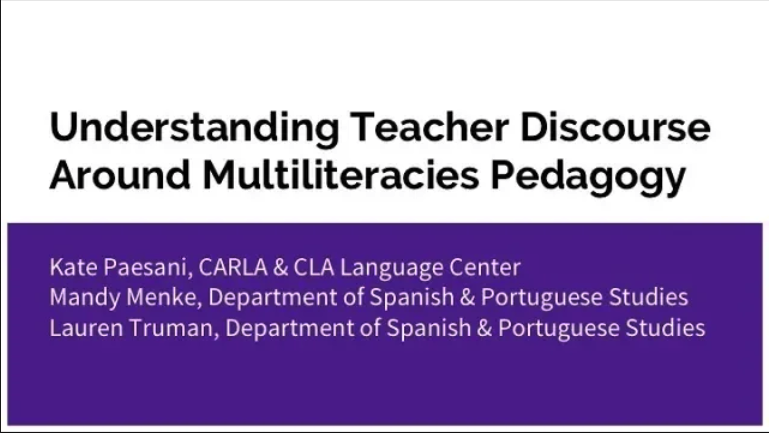
Paesani, K., Menke, M., & Truman, L. (2018, November 1). "Understanding Teacher Discourse Around Multiliteracies Pedagogy."
Over the past two decades, scholars and practitioners have been exploring ways to apply multiliteracies (ML) principles and practices to postsecondary language programs. Yet adopting new teaching paradigms can be challenging for teachers: The few studies that have investigated how teachers learn about and implement ML pedagogy underscore the long-term nature of teachers' conceptual development and their difficulties in applying conceptual knowledge in instruction. In this presentation, we discuss a qualitative case study that contributes to this line of research. Specifically, we investigate whether and how concepts related to communicative language teaching (CLT) (e.g., comprehensible input, language functions, affect) are manifested in teacher discourse around ML pedagogy. Findings indicate that participants' discourse reflected CLT concepts to differing degrees, despite similarities in their teaching histories. We conclude with implications of the study's findings for socializing FL teachers into ML pedagogy.
Presenters:
Kate Paesani is the CARLA Director and affiliate Associate Professor at the University of Minnesota. Her research is focused on literacy-based curriculum and instruction and foreign language teacher development.
Mandy Menke is an Assistant Professor of Hispanic Linguistics and Director of Language Programs in the Department of Spanish and Portuguese Studies. She researches topics related to second language acquisition and foreign language pedagogy, at both the university and K-12 levels.
Lauren Truman is a doctoral candidate of Hispanic Linguistics. Her research interests include bilingualism, language and identity, language maintenance, and language policy. Her work focuses on the sociolinguistics of Spanish and Maya in the Yucatan and bilingual education policy in the United States.
This presentation is cosponsored by the Department of Spanish and Portuguese Studies.
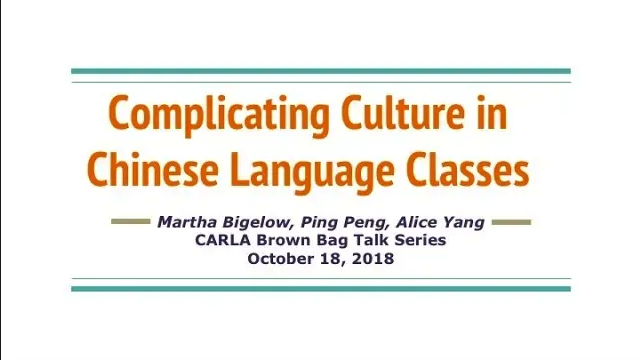
Bigelow, M., Peng, P., & Yang, A. (2018, October 18). "Complicating Culture in Chinese Language Classes."
This presentation will share findings about ways Chinese language teachers explore topics of culture in US school settings. Our analyses of naturally-occurring data from a summer institute point to new ways of integrating culture and language that make spaces for using Chinese to promote inquiry into self, particularly in terms of interculturality and understanding differences. We will discuss the challenges and insights we discovered when striving to complicate reductionist or celebratory approaches to culture through critical pedagogies. Implications for curriculum and instruction involve shifting the focus of culture from knowledge of China to building cultural awareness and intercultural competence to promote social justice in K-12 schools.
Presenters:
Martha Bigelow is Professor of Second Language Education in the Department of Curriculum and Instruction. Her research spans the fields of education, applied linguistics, and cultural studies.
Ping Peng is a Ph.D. student in Second Language Education in the Department of Curriculum and Instruction. She is also a Chinese immersion teacher in the Minnetonka Public Schools. She devotes most of her professional time to identifying, designing, and implementing effective and practical teaching methodologies and strategies for Chinese immersion teaching based on the daily teaching experience.
Alice Yang is a Ph.D. student in Second Language Education in the Department of Curriculum and Instruction. Her study interests are language teaching pedagogy, teacher education, language assessment, and international education.
This presentation is cosponsored by the Second Language Education program in the Department of Curriculum and Instruction.
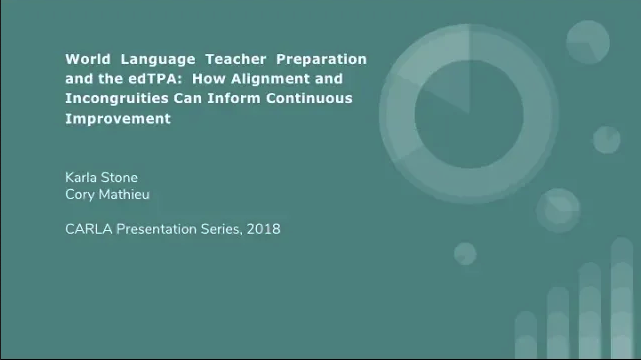
Stone, K., & Mathieu, C. (2018, October 3). "World Language Teacher Preparation and the edTPA: How Alignment and Incongruities Can Inform Continuous Improvement."
This presentation will describe a research project that explored World Language and Classical Language teacher candidate edTPA data spanning four years. A brief overview of the World Language edTPA and the SLE post-baccalaureate teacher licensure program will be given, followed by a description of the research process. Based on analysis of candidate scores and written portfolio responses, the presenters will share their findings around trends in teacher candidate performance, alignment of candidate performance with program goals, and how incongruities in the data have led to changes in practice for the coming year.
Presenters:
Karla Stone is a Lecturer and the License Program Lead in the Second Language Education program in the Department of Curriculum and Instruction.
Cory Mathieu is a Ph.D. student in the Second Language Education program. Her research primarily focuses on secondary Spanish immersion pedagogy, materials development, and teacher education. She teaches several classes in the department, including some for the Dual Language and Immersion certificate program. She also works as a Clinical Supervisor for the World Language and ESL post-baccalaureate teacher licensure program.
This presentation is cosponsored by the Second Language Education program in the Department of Curriculum and Instruction.
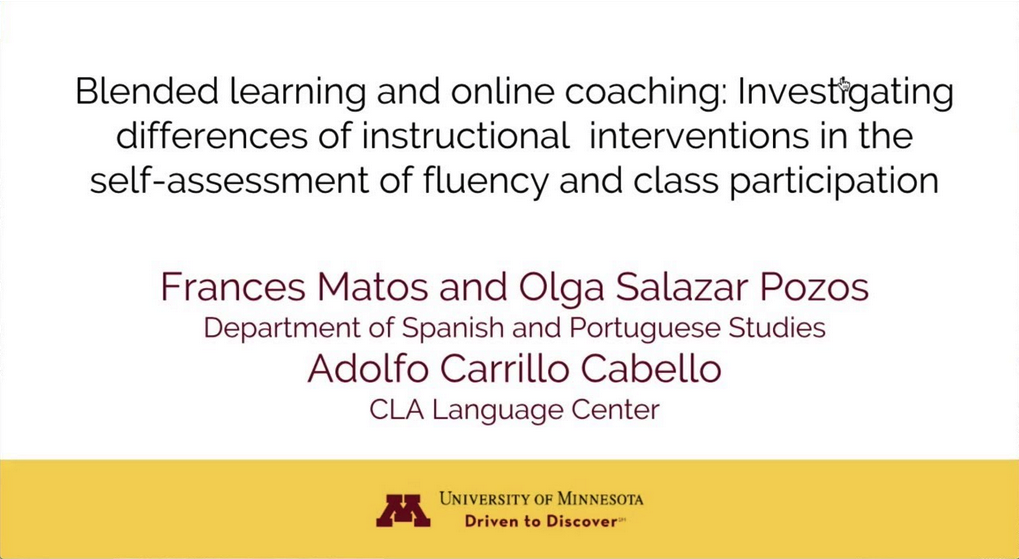
Carillo Cabello, A., Matos, F., & Salazar Pozos, O. (2018, September 20). "Blended Learning and Online Coaching: Investigating Differences of Instructional Interventions in the Self-assessment of Fluency and Class Participation."
This study examined the use of online coaching as a pedagogical intervention for the development of speaking skills and its connection to assessment practices. Using quantitative and qualitative data, we analyzed self-assessment ratings of oral performance and class participation of 54 Spanish learners. In addition, the study aimed to identify and explicate any differences in ratings of these categories based on pedagogical interventions, instructor's ratings, and learners' perceptions of the interventions. Results revealed that different technology tools triggered contrasting reactions to speaking engagement rules and approaches to task completion. Implications of the results and implementation will be discussed.
Presenters:
Adolfo Carrillo Cabello is a Professional Development Specialist at the CLA Language Center. His research interests include intercultural communicative competence, foreign language pedagogy, materials development, and online and distance learning.
F. Matos is a Senior Lecturer in the Department of Spanish and Portuguese Studies. Her interests are teacher development, online and hybrid/blended teaching, and course design.
Olga Salazar Pozos is a second-year graduate student at the Department of Spanish and Portuguese Studies. Her research interests include 19th and 20th century Latin American literature, contemporary Mexican literature, postcolonial studies, and human rights.
This presentation is cosponsored by the CLA Language Center.
2017-2018
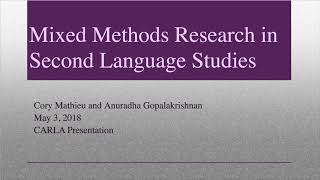
Mathieu, C., & Gopalakrishnan, A. (2018, April 25). "Mixed Methods Research in Second Language Studies."
This CARLA presentation is the culmination of a semester-long independent study on mixed methods research in language learning and teaching. Although mixed methods research has gained traction since the paradigm wars of the 1990s, it is still adopted relatively infrequently in research in the broad field of language learning and teaching. In this presentation, we will first discuss our understanding of the underlying paradigms and purposes of mixed methods research. We then argue that this research approach offers important affordances for the field of language learning and teaching research given the multi-dimensionality of the constructs that are studied. We note, therefore, the gap between the potential of mixed methods research and the reality of its scarcity in current literature. We conclude the presentation by describing our upcoming study that will look more closely at this gap by speaking directly with researchers to understand why they do or do not adopt mixed methods in their own work.
Presenters:
Cory Mathieu is a PhD student in Second Language Education in the department of Curriculum and Instruction. Her research focuses on materials use and development and content and language integration in secondary Spanish immersion programs.
Anuradha Gopalakrishnan is a PhD student in Second Language Education in the department of Curriculum and Instruction. Her research interests include multilingual pedagogies, third language acquisition and foreign language education. Her multilingual and multicultural experiences shape her research work and influence her teaching.
This presentation is cosponsored by the Second Language Education Program in the Department of Curriculum and Instruction.
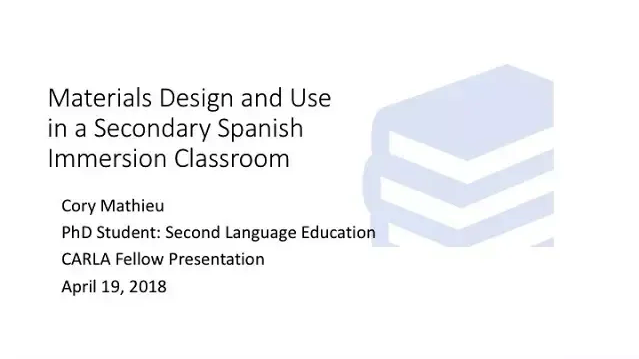
Mathieu, C. (2018, April 19). "Materials Design and Use in a Secondary Spanish Immersion Classroom."
CARLA Fellow Presentation:
The successful integration of content and language is a persistent challenge in content-based language instruction contexts such as dual language and immersion (DLI) classrooms. Although previous scholarship has explored a variety of factors that affect DLI teachers' abilities to integrate content and language in their pedagogy, none of this work has focused on the potential affordances and constraints of the classroom materials that these teachers employ. Moreover, very little classroom-based language learning materials use research has examined the relationship between the design of the materials themselves and how they are used in the classroom. Operating under an overarching question of how language-focused modifications to DLI materials might offer affordances for more frequent and effective content and language integration, this study set out to build a local theory for how the design of DLI materials related to how they were mobilized by the teacher and students in one ninth-grade Spanish immersion social studies classroom. In this presentation, I share findings from classroom observations, teacher interviews and materials analysis that illustrate a possible relationship between materials design and materials use, highlighting in part how materials design features can support or inhibit an intended pedagogical paradigm and/or curriculum. I will also present implications for DLI pedagogy, materials development for content-based instruction and teacher education.
Presenter:
Corinne (Cory) Mathieu is a PhD student in Second Language Education in the department of Curriculum and Instruction. Her research focuses on materials use and development and content and language integration in secondary Spanish immersion programs. She teaches in the dual language and immersion certificate program and works as the graduate assistant for the K-6 initial licensure program with a focus on dual language and immersion education at the University of Minnesota.
This presentation is cosponsored by the Second Language Education Program in the Department of Curriculum and Instruction.
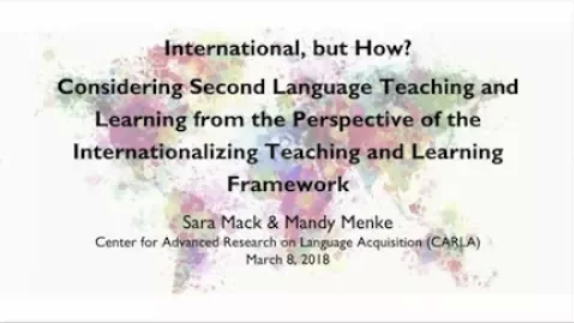
Mack, S. & Menke, M. (2018, March 8). "International, but How? Considering Second Language Teaching and Learning from the Perspective of the Internationalizing Teaching and Learning Framework."
Second language classes are often assumed to be inherently 'international,' and have the potential to contribute significantly to institutional goals of producing 'globally competent' citizens. Upon closer examination, however, what international exactly means is not always clear, and course materials and learning outcomes often rest upon hegemonic discourse and communicative standards that place the U.S. student experience at the center. In this presentation, the speakers will explore how the Internationalizing Teaching and Learning (ITL) framework (Clifford 2009; Hovland 2009; Leask 2009; University of Minnesota 2013) provides a conceptual structure and pedagogical method for addressing these issues. From a cross-disciplinary perspective, we will explore the question of how an internationalized curriculum is defined, what this framework can offer language teachers at the individual level, and what benefit it can have at the course and programmatic level. The presentation will include key considerations for effectively integrating the ITL framework in multi-section, multi-instructor contexts as well as share preliminary findings from data gathered in a course organized using the ITL model.
Presenters:
Sara Mack is a Senior Lecturer and Coordinator of Spanish 1004 at the University of Minnesota, and currently serves as a Spanish Faculty Coordinator Assistant for the College in the Schools program. Her areas of interest include critical approaches to multi-section course curriculum and materials, inclusive design, sociophonetics, and learning and memory.
Mandy Menke is an Assistant Professor of Hispanic Linguistics and Director of Language Programs in the Department of Spanish and Portuguese Studies. She researches topics related to second language acquisition and foreign language pedagogy, at both the university and K-12 levels.
This presentation is cosponsored by the Department of Spanish & Portuguese Studies and the Internationalizing Teaching and Learning Faculty Cohort Program.
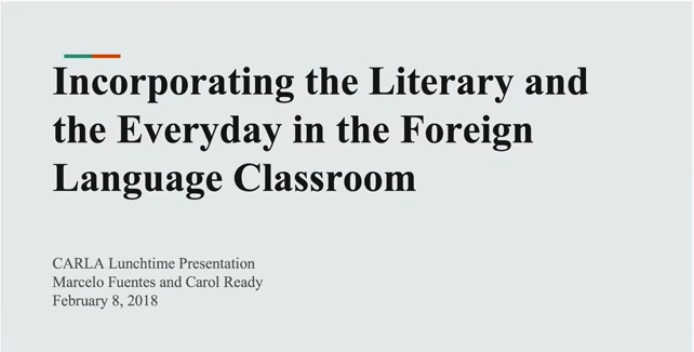
Ready, C. & Fuentes, M. (2018, February 8). "Incorporating the Literary and the Everyday in the Foreign Language Classroom."
The Foreign Languages and the Literary in The Everyday (FLLITE) approach, developed from Joanna Luks's The Literary in the Everyday, is an heuristic for curriculum development from the beginning levels to advanced foreign language study. The FLLITE approach attempts to bridge the language/literature divide that is still prevalent in foreign language curriculums and textbooks by bringing together "the literary," with its range of playful, metaphorical, and non-conventional ways of making meaning, and "the everyday," which includes the language used for daily communication. This talk will address the key concepts of the FLLITE approach and how to incorporate these concepts into the foreign language classroom. Additionally, we will look at lesson plans that combine the literary and the everyday to help students grapple with layers of meaning when interpreting and producing diverse kinds of texts.
Presenters:
Carol Ready is a PhD student in the Department of Spanish and Portuguese Studies specializing in Hispanic Linguistics focusing on the sociolinguistics and language contact of Spanish and Arabic in Spain. She participated in the FLLITE project as a COERLL (Center for Open Educational Resources and Language Learning) collaborator at the University of Texas at Austin where she worked with foreign language educators to develop lessons and teaching materials based on the FLLITE approach.
Marcelo Fuentes is a PhD candidate in the Department of Spanish and Portuguese Studies, and he analyzes the depictions of Muslims by Christians in the medieval and early modern literatures of Iberia. He was also a COERLL collaborator at the University of Texas at Austin.
This presentation is cosponsored by the Department of Spanish & Portuguese Studies.
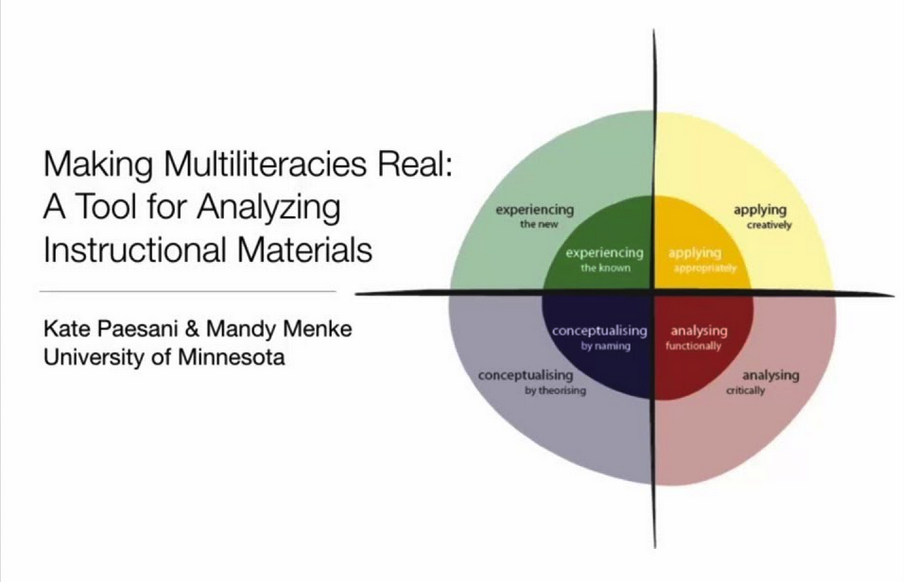
Paesani, K. & Menke, M. (2018, January 23). "Making Multiliteracies Real: A Tool for Analyzing Instructional Materials."
Recent scholarship has foregrounded literacies, defined as a socially situated process of making meaning from texts, as a necessary curricular goal for collegiate foreign language (FL) programs, and multiliteracies pedagogy as a viable approach to develop students' FL literacies. Yet as more programs adopt this framework, additional research is needed to understand how it is applied through materials design and implementation. In response, this study documents the process of implementing a tool for analyzing literacies-based teaching materials. Using the knowledge processes framework (Kalantzis, Cope, Chan, & Dalley-Trim, 2016) as an analytical lens, the researchers and a group of experienced teachers examined 25 lessons targeting interpretive communication from two courses in a lower-level Spanish curriculum. In this presentation, we report empirical data illustrating the results of our analysis as well as teachers' perceptions of the process. We furthermore discuss conceptual and pedagogical factors contributing to our findings and implications for supporting FL teachers in the creation and revision of literacies-based instructional materials.
Presenters:
Kate Paesani is the CARLA Director and affiliate Associate Professor at the University of Minnesota. Her research is focused on literacy-based curriculum and instruction and foreign language teacher development.
Mandy Menke is an Assistant Professor of Hispanic Linguistics and Director of Language Programs in the Department of Spanish and Portuguese Studies. She researches topics related to second language acquisition and foreign language pedagogy, at both the university and K-12 levels.
This presentation is cosponsored by the Department of Spanish & Portuguese Studies
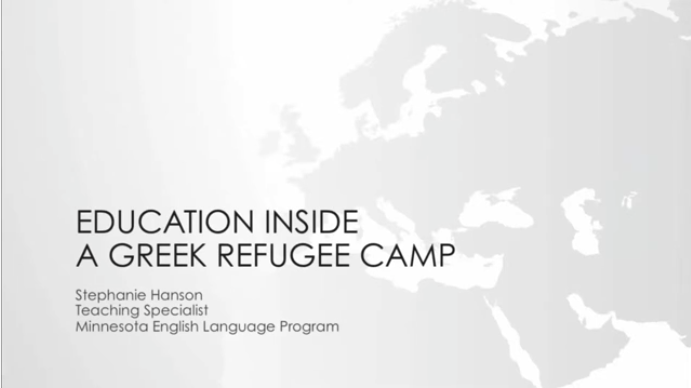
Hanson, S. (2017, November 9). "Education Inside a Greek Refugee Camp."
Presenter:
Stephanie Hanson is a Teaching Specialist at the Minnesota English Language Program (MELP) at the University of Minnesota.
This presentation is cosponsored by the Minnesota English Language Program.
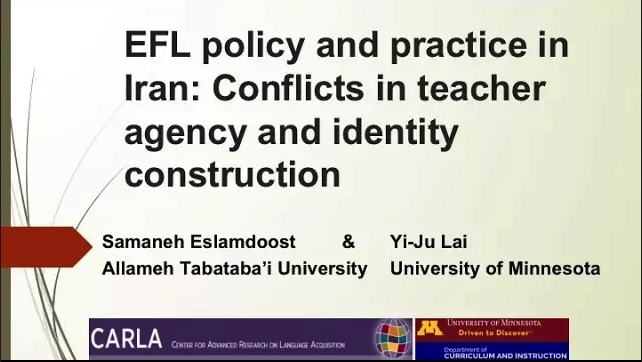
Eslamdoost, S. & Lai, Y-J. (2017, October 31). "EFL Policy and Practice in Iran: Conflicts in Teacher Agency and Identity Construction."
Fairclough's (2015) approach to language and power was used to closely analyze classroom interactions where Iranian EFL instructors demonstrated their agency to negotiate and legitimize teacher expertise, sociocultural expectations towards teaching and learning, and institutional and broader Islamic ideologies. Teachers' agentive identities were mediated by the practices at local level and institutional context and educational policies at broader level. Learners' expectations and the rules imposed by the authorities led some teacher participants to challenge against their desirable teacher agentive identities. Teachers interaction with policies in centralized Iranian institutional contexts complicated their desired and performed agentive identities in relation to language learners, institutions, and larger Iranian sociocultural contexts.
Presenters:
Samaneh Eslamdoost is a PhD candidate in Teaching English as a Foreign Language at the University of Allameh Tabataba'i in Tehran. She is currently a visiting scholar in the Second Language Education program at the University of Minnesota. Her research focuses on how EFL teacher identities are (re)constructed in interaction with language and education policies in centralized Iranian educational contexts. She also looks into the conflicts facing EFL teachers in those contexts and how they respond to the challenges to their professional identities.
Yi-Ju Lai is a PhD candidate in the Second Language Education program at the University of Minnesota. Her research addresses the language socialization processes and practices of multilingual international students into academic discourse communities. Her work focuses on the socialization interactions where communicative forms and norms, institutional ideologies, and memberships are negotiated and constructed among participants.
This presentation is cosponsored by the Second Language Education Program in the Department of Curriculum and Instruction.
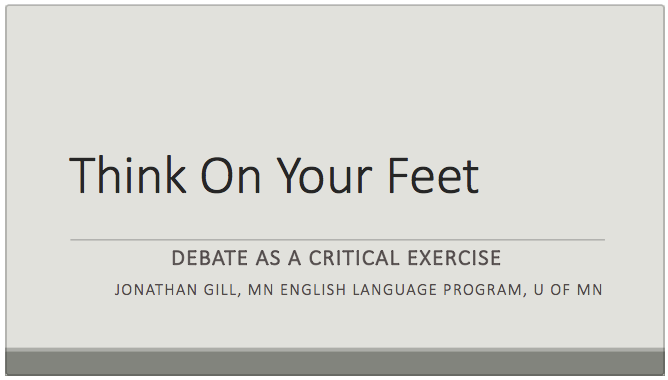 (PDF of slides)
(PDF of slides)Gill, J. (2017, October 19). "Think on Your Feet: Debate as a Critical Exercise."
Presenter:
Jon Gill is a Teaching Specialist at the Minnesota English Language Program (MELP) at the University of Minnesota.
This presentation is cosponsored by the Minnesota English Language Program.
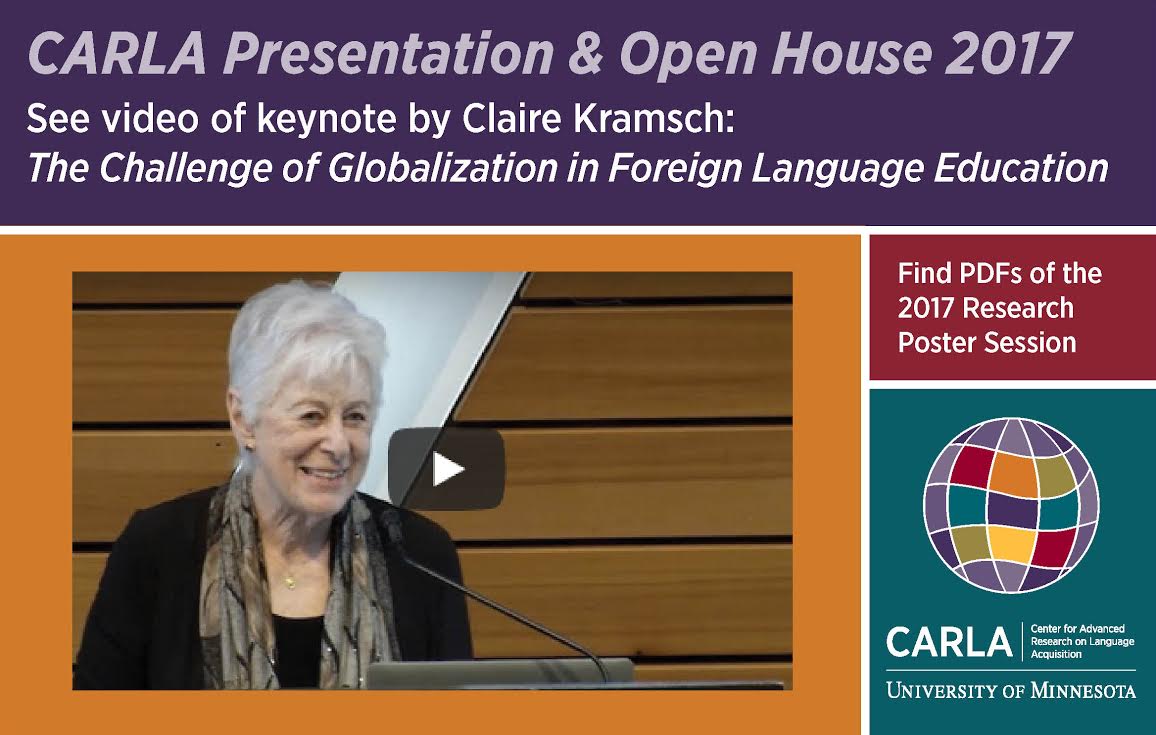
Kramsch, C. (2017, October 10). “The challenge of globalization in foreign language education.” Keynote, CARLA 2017 Open House.
Kate Paesani, CARLA Director, welcomes attendess to the CARLA 2017 Open House which includes a video welcome message from Al Frankin, Minnesota Senator. Provost Karen Hanson speaks briefly before introducing Meredith McQuaid, Associate Vice President and Dean of International Programs, Global Strategies and Programs, who introduces keynote speaker Professor Claire Kramsch.
In a recent position paper on teaching foreign languages in an era of globalization, Claire Kramsch wrote: "Through its mobility of people and capital, its global technologies, and its global information networks globalization has changed the conditions under which foreign languages (FLs) are taught, learned, and used. It has destabilized the codes, norms, and conventions that are putting into question the monolingual foundation of FL education and challenging monolingual ideologies at play in our society. These changes call for a more reflective, interpretive, historically grounded and politically engaged pedagogy than was called for by the communicative language teaching of the eighties" (2014, p. 296).
In this presentation, Professor Kramsch updated this assessment of the situation by discussing recent developments in applied linguistics: the multilingual turn (May, 2014), the transdisciplinary turn (Douglas Fir Group, 2016), and various trans-perspectives (Hawkins & Mori, forthcoming) that are redefining what it means to learn and use one or several additional languages. She also discussed two current trends that are challenging the very nature of language and that raise serious ethical questions for collegiate education: the algorithms being developed by the computer industry that strive to establish full translatability across linguistic codes, and the proliferation of purely phatic uses of language in a spectacle society obsessed with social media.
Keynote Speaker:
Claire Kramsch is Professor Emerita of German and Education at University of California-Berkeley. Her area of research is applied linguistics, with emphasis on social, cultural and stylistic approaches to language study and she has published numerous books, articles, and chapters in these areas. She was, until 2006, founding Director of the Berkeley Language Center, a research and development unit for all foreign language teachers on campus. Among her many awards, she has received UC Berkeley's Distinguished Teaching Award, the Distinguished Service Award from the Modern Language Association, and the Distinguished Scholarship and Service Award from the American Association for Applied Linguistics.
Presentation given at the CARLA Presentation Series, University of Minnesota, Minneapolis, MN.
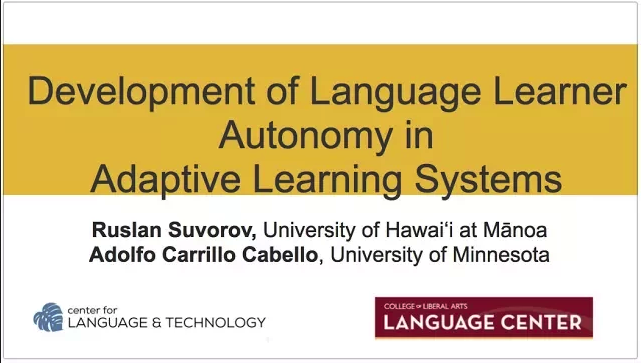
Suvorov, R. & Carrillo Cabello, A. (2017, September 13). "Development of Language Learner Autonomy in Adaptive Learning Systems."
Presenters:
Dr. Ruslan Suvorov is Language Technology Specialist at the Center for Language & Technology, University of HawaiÔi at Maønoa. His research interests lie at the intersection of applied linguistics and instructional technology and design, with the focus on language assessment, eye tracking, and blended and online learning.
Dr. Adolfo Carrillo Cabello is Professional Development Specialist at the CLA Language Center, University of Minnesota. His research interests include intercultural communicative competence, foreign language pedagogy, materials development, and online and distance learning. This presentation is cosponsored by the CLA Language Center.
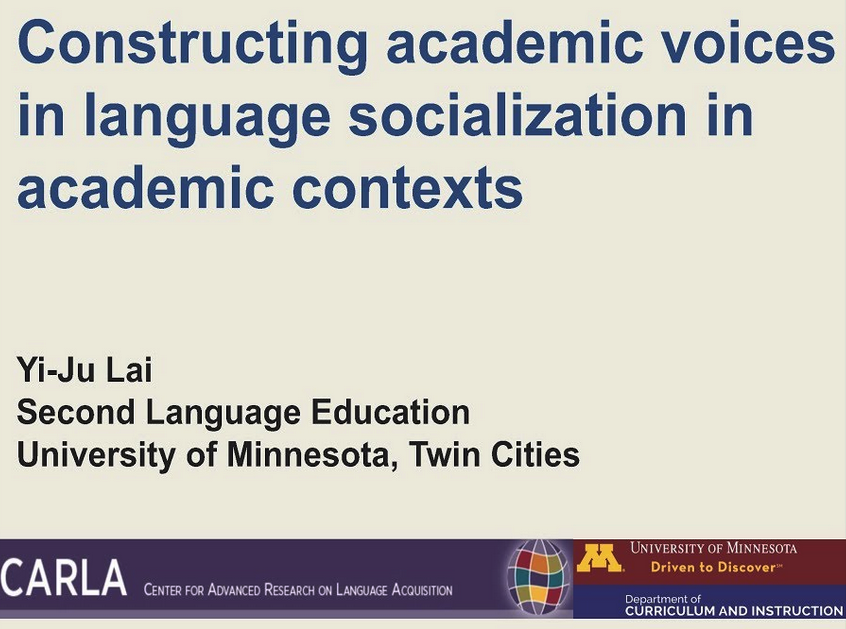
Lai, Y-J. (2017, September 26). "Constructing Academic Voices in Language Socialization in Academic Contexts."
Presenter:
Yi-Ju Lai is a PhD candidate in the Second Language Education program at the University of Minnesota. Her research addresses the language socialization processes and practices of multilingual international students into academic discourse communities. Her work focuses on the socialization interactions where communicative forms and norms, institutional ideologies, and memberships are negotiated and constructed among participants.
This presentation is cosponsored by the Second Language Education Program in the Department of Curriculum and Instruction.
2016-2017
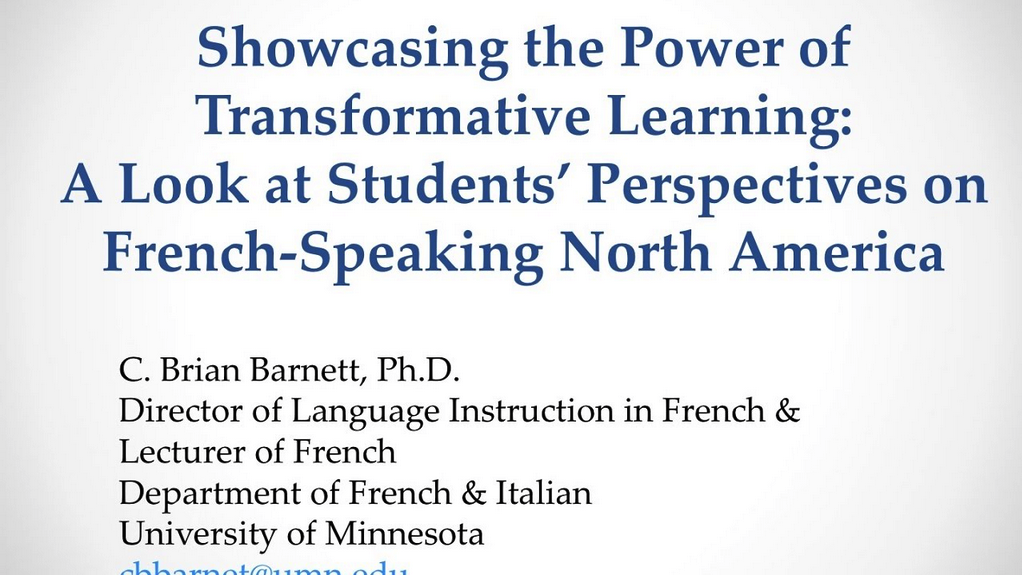
Barnett, C. B. (2017, April 25). "Showcasing the Power of Transformative Learning: A Look at Students ' Perspectives on French-Speaking North America."
Presenter:
C. Brian Barnett is a Lecturer of French and Director of French Language Instruction at the University of Minnesota and has taught undergraduate-level novice, intermediate, and advanced French courses and graduate-level pedagogy courses. He has interests in the American varieties of French, immersion education, children's literature, materials and curriculum development, and styles- and strategies-based instruction.
Cosponsored by the Department of French and Italian in the College of Liberal Arts
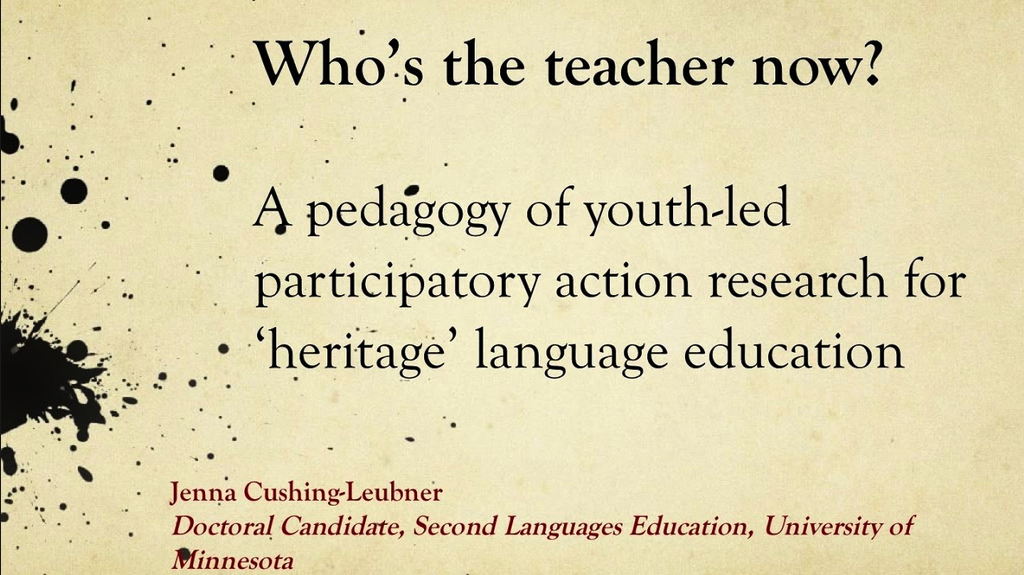
Cushing-Leubner, J. (2017, April 12). "Who's the Teacher Now? A Pedagogy of Youth-Led Participatory Action Research for 'Heritage' Language Education."
Youth-led participatory action research (YPAR) is an approach to teaching and learning that blurs research, pedagogy, and actions that seek transformational justice. This talk describes one example of a YPAR project in a high school Spanish as a heritage language class in which multilingual Latinx youth drew on their own study of U.S. Latinx social justice history to become teachers to multilingual 3rd-5th graders. They first drew on their own academic studies to design and facilitate learning circles, then utilized these experiences to lead language teachers and administrators in professional development around community expectations for linguistic and cultural representation in the schooling experiences of multilingual youth of color. Ultimately, this talk examines YPAR as a key pedagogy of possibility for multilingual youth to claim, reclaim, and sustain languages other than English whose maintenance has been restricted in the predominantly English language environment of U.S. schools.
Presenter:
Jenna Cushing-Leubner is a PhD candidate and doctoral dissertation fellow in the department of Curriculum & Instruction (Second Languages Education) and has spent the last four years working with teachers to forge multilingual learning spaces for youth from multilingual communities. She has worked extensively with teachers of English as an additional language and Spanish for native speakers to develop classes and programs that emphasize positive ethnic and linguistic identity, social justice, youth research, and transformative teaching.
Cosponsored by the Second Language Education Program in the College of Education and Human Development
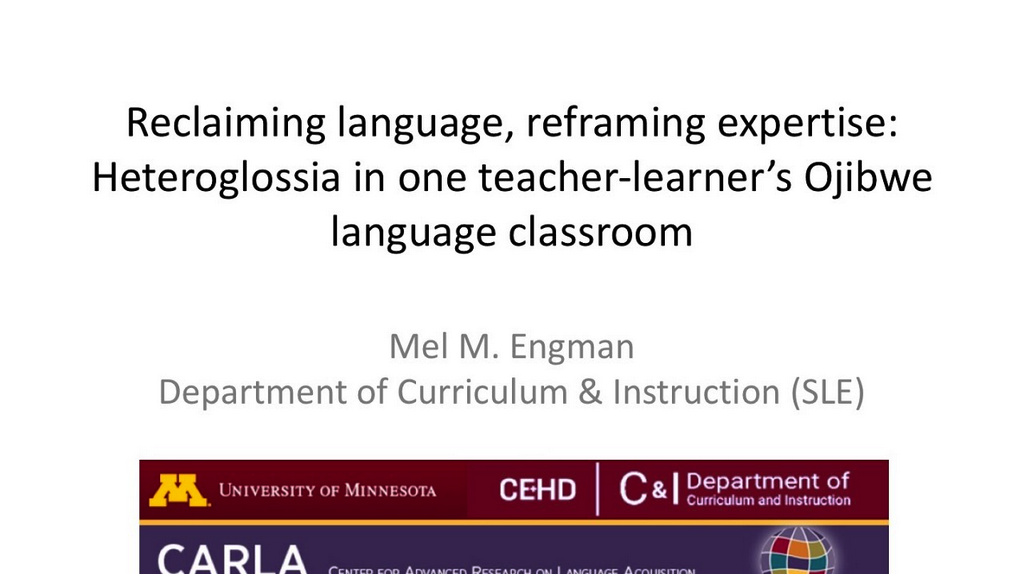
Engman, M. (2017, March 28). "Reclaiming Language, Reframing Expertise: Heteroglossia in One Teacher-Learner's Ojibwe Classroom."
Due to centuries of settler colonial policies intended to oppress and erase Indigenous peoples in what is now the United States, most teachers currently involved in Ojibwe language education efforts are learners themselves with varying formal training in language and pedagogy. This phenomenon of the 'teacher-learner' (Hinton, 2003) receives little attention though it is of crucial importance to the growing number of classroom-based revitalization programs. This talk presents a qualitative analysis of language and interaction, focusing on patterns of language use and social practices within one teacher-learner's Ojibwe classroom. A better understanding of how language is used in this context and its connection with broader discourses of Indigenous language and education contributes to language revitalization research, informs professional development to support teacher-learners, and strengthens heteroglossic Indigenous identities.
Presenter:
Mel Engman is a PhD candidate and doctoral dissertation fellow in the department of Curriculum & Instruction (second language education) and she is a White, non-Indigenous learner of Ojibwemowin. Her research examines the use of heritage and Indigenous languages in a variety of schooling contexts, and she works with language teachers and administrators to develop curriculum and instructional materials.
Cosponsored by the Second Language Education Program in the College of Education and Human Development
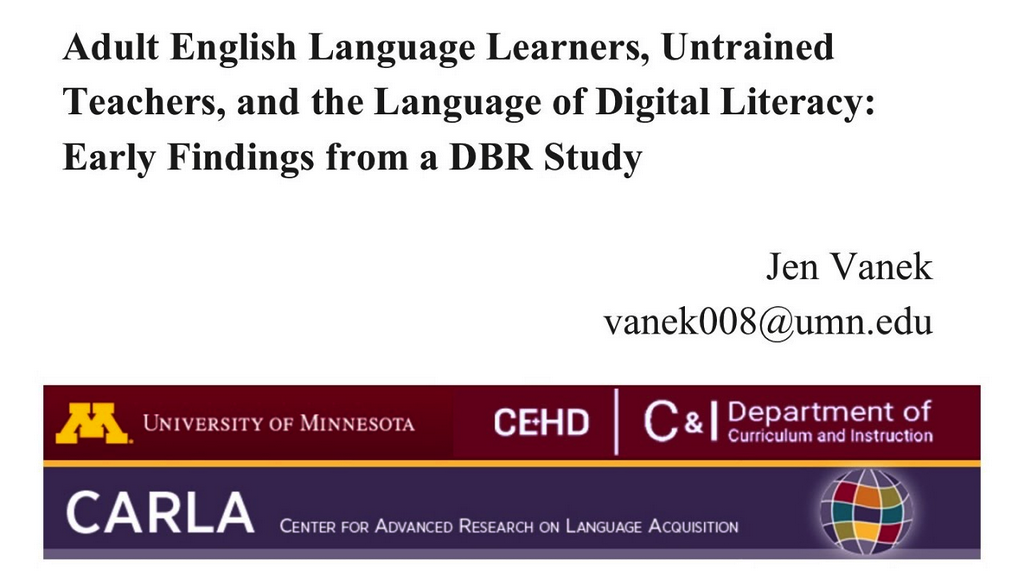
Vanek, J. (2017, March 7). "Adult English Language Learners, Untrained Teachers, and the Language of Digital Literacy: Early Findings from a Design-Based Research Study."
The presentation describes one aspect of a larger dissertation project exploring digital literacy and language learning for adult migrants in the US. The study used Design-Based Research to elucidate the challenges adult ELLs face as they attempt to build digital literacy skills in community-based organizations staffed by untrained teachers (i.e., AmeriCorps members). The presentation addresses a central finding concerning the role of English language and literacy in the teachers' instructional strategies. More specifically, the data show that as the participant teachers collaboratively defined instructional challenges and iteratively built an instructional resource to support their computer skills instruction, they developed an awareness of their role as language teachers. Discussion includes observations about the implications for this shift on their instructional strategies and, more broadly, recommendations for support of novice or untrained teachers working in widely mixed-level classroom settings with linguistically diverse student populations.
Presenter:
Jen Vanek is a Doctoral Dissertation Fellow and Doctoral Candidate in Second Language Education program at the University of Minnesota. Jen's research is informed not only by her academic work in SLE but also nearly twenty years of experience working as an adult English language and literacy teacher, curriculum developer and teacher educator.
Cosponsored by the Second Language Education Program in the College of Education and Human Development
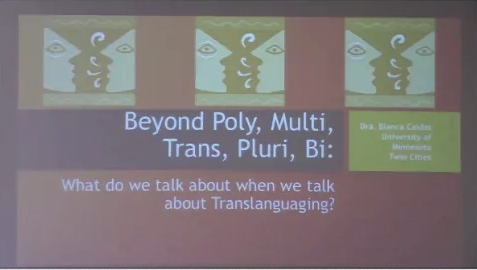
Caldas, B. (2017, February 21). "Beyond Poly, Multi, Trans, Pluri, Bi: What Do We Talk About When We Talk About Translanguaging?"
Presenter:
Blanca Caldas is an assistant professor in Second Language Education and Elementary Education—College of Education and Human Development at The University of Minnesota Twin Cities.
Cosponsored by the Second Language Education Program in the Department of Curriculum and Instruction.
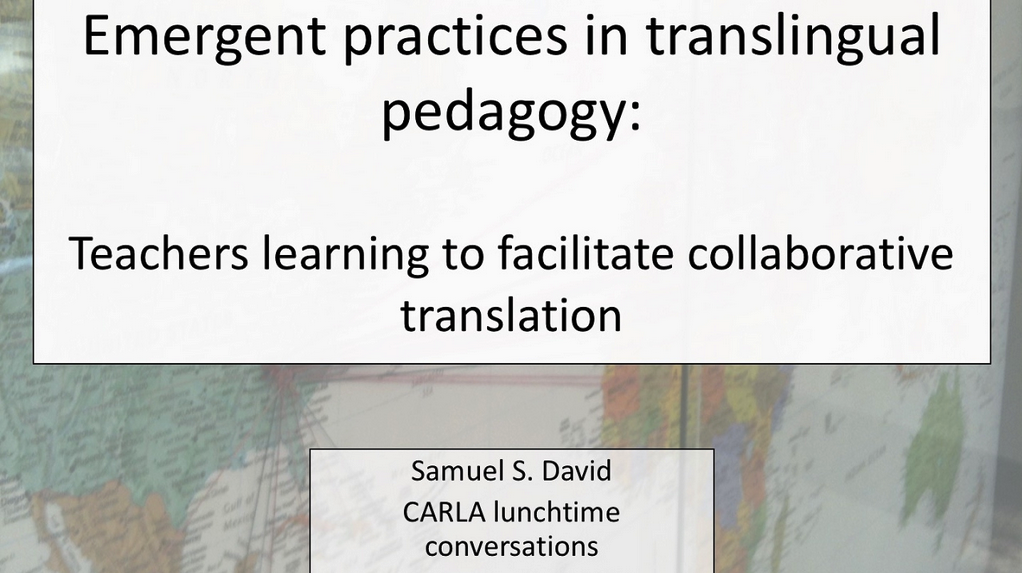
David, S. (2017, February 7). "Emergent Practices in Translingual Pedagogy: Teachers Learning to Facilitate Collaborative Translation."
Presenter:
Sam David is an assistant professor of second language education at the University of Minnesota. He recently completed his doctoral work at Vanderbilt University, focusing on the literacy development of culturally and linguistically diverse students in mainstream classrooms, and on teacher learning of translingual and culturally responsive pedagogies. Prior to pursuing the doctorate, Sam worked as a bilingual special education teacher in upper elementary grades in Brooklyn, NY.
Cosponsored by the Second Language Education Program in the Department of Curriculum and Instruction.
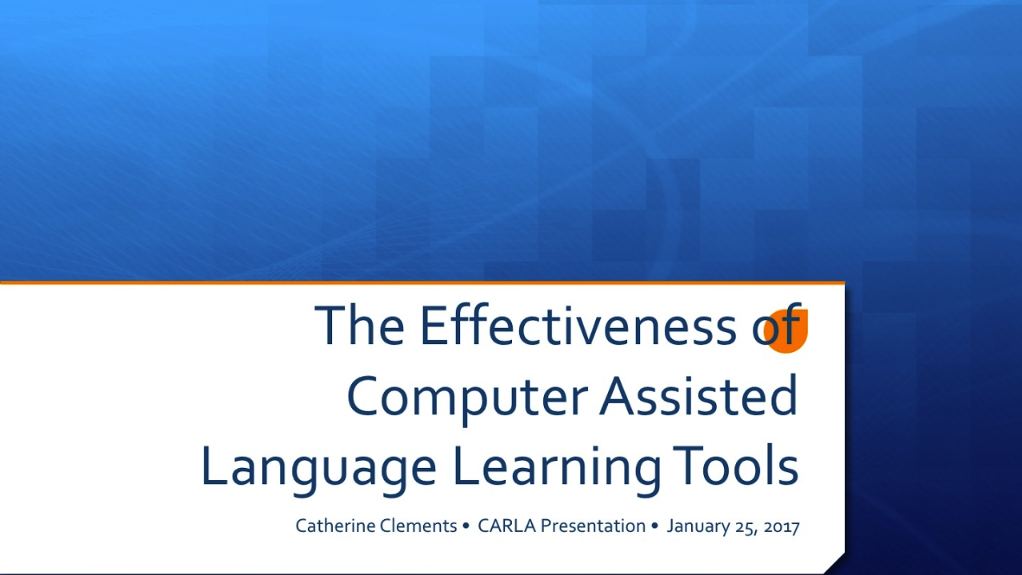
Clements, C. (2017, January 25). "The Effectiveness of Computer Assisted Language Learning Tools."
Presenter:
Catherine Clements teaches English as a Second Language in the Minnesota English Language Program at the University of Minnesota and Computer Assisted Language Learning at Hamline University.
Cosponsored by the Minnesota English Language Program
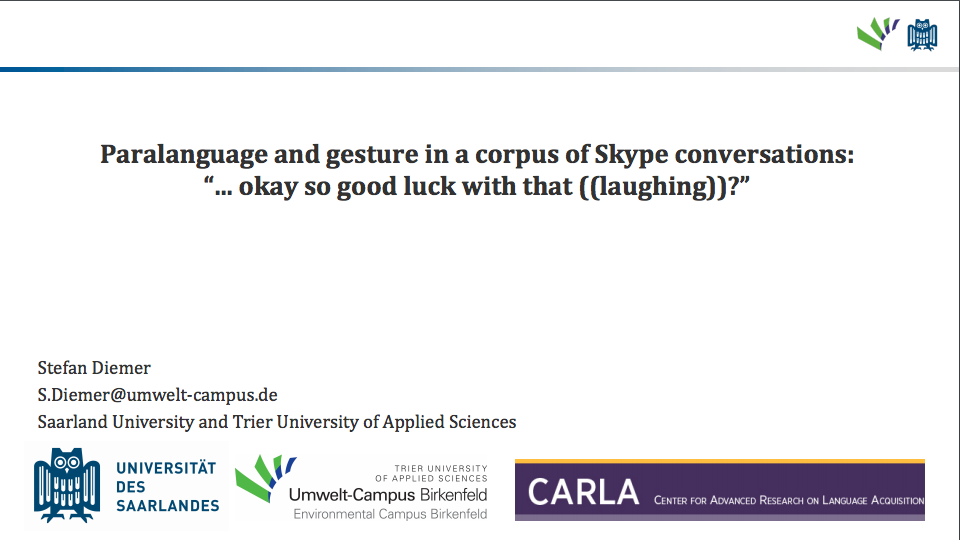 (PDF of slides)
(PDF of slides)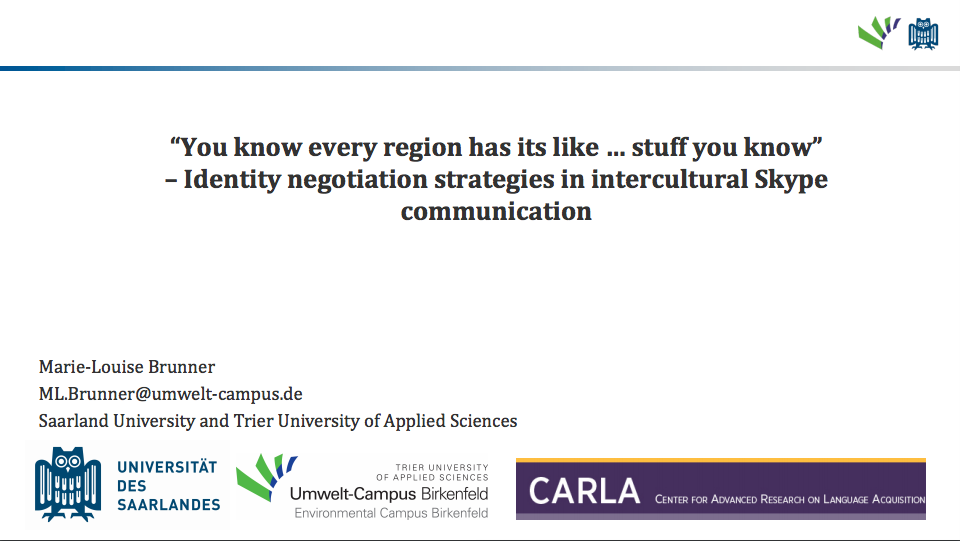 (PDF of slides)
(PDF of slides)
Diemer, S., & Brunner, M-L. (2016, November 10). "Intercultural Skype Communication: Two Views from the Field."
Paralanguage and Gesture in a Corpus of Skype Conversations:
"... Okay so good luck with that ((laughing))?"
Presenter:
Stefan Diemer is professor of international communication and digital business at Trier University of Applied Sciences and associate professor of linguistics at Saarland University, SaarbrŸcken, Germany. He is head of the team compiling CASE, the Corpus of Academic Spoken English, a corpus of international Skype conversations.
Identity Negotiation Strategies in Intercultural Skype Communication:
"You know every region has its like ... stuff you know"
Presenter:
Marie-Louise Brunner is PhD researcher and head of the intercultural communication programme at Trier University of Applied Sciences and lecturer in the department of English linguistics at Saarland University, Germany.
This is event is sponsored by the Institute of Linguistics and cosponsored by CARLA, PACE Project, and the Minnesota English Language Program.
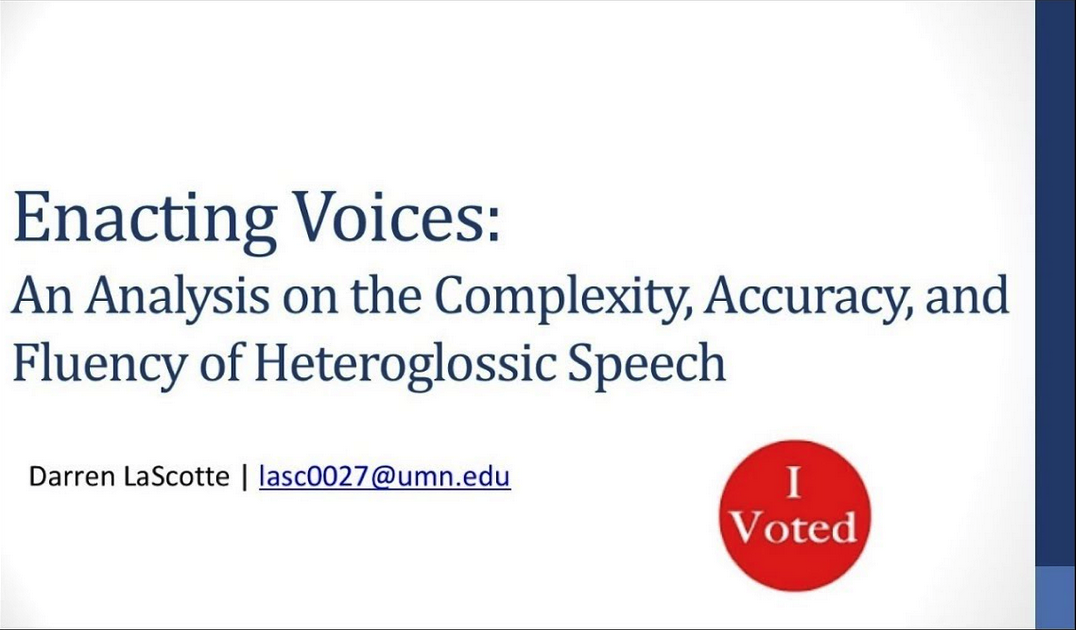
LaScotte, D. K. (2016, November 8). "Enacting Voices: An Analysis on the Complexity, Accuracy, and Fluency of Heteroglossic Speech."
The present study supports the idea of heteroglossia and its contributions to language learning in SLA theory. Bakhtin's (1934/1981) theory of heteroglossia differs from variety and register in that when learning a language, one internalizes the voices of others. Viewing interlanguage through a heteroglossic lens, it is possible that these voices in heteroglossia may have an effect on learner language. This study analyzes two learners' interlanguage through a heteroglossic lens to explore whether these distinctive voices in heteroglossia have an effect on the complexity, accuracy, and fluency of L2 learners' language.
Presenter:
Darren Keith LaScotte, MA in TESOL, is adjunct faculty in the Minnesota English Language Program and in the University of Minnesota's Dept. of Curriculum & Instruction. His research interests include language education, learner language, and language variation across social contexts.
Cosponsored by the Minnesota English Language Program and the Second Language Education Program in the Department of Curriculum and Instruction.
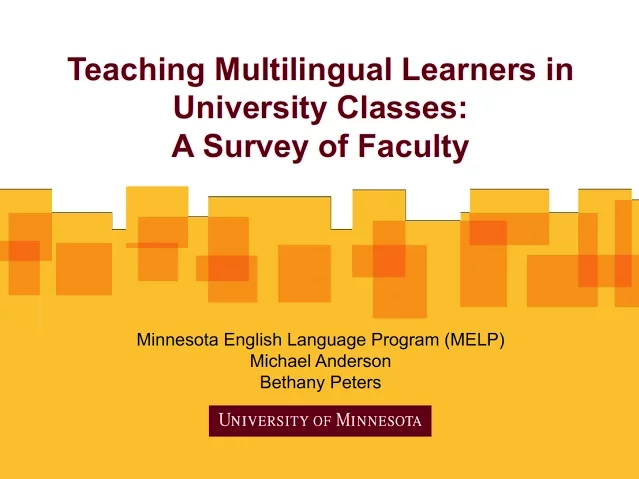
Peters, B., & Anderson, M. (2016, November 1). "Teaching Multilingual Learners in University Classes: A Survey of Faculty."
Faculty teach a variety of multilingual students across the many disciplines at the University of Minnesota. Working with international students or others who do not speak English as their first language, faculty encounter challenges related to students' language ability as well as the many benefits of working with a cross-cultural and multilingual class. In Spring 2016, the Minnesota English Language Program (MELP) conducted a survey to learn more about what faculty and staff perceive as the benefits and challenges of supporting multilingual students. Approximately 1,500 survey respondents shared their views and provided recommendations to enhance training and support options for faculty and staff at the University of Minnesota. In this session, the presenters will provide an overview of the faculty survey results as well as implications for best practices in supporting multilingual learners.
Presenters:
Bethany Peters, M.A., is a Teaching Specialist and Faculty Liaison at the Minnesota English Language Program (MELP) in the College of Continuing Education at the University of Minnesota.
Michael Anderson, Ph.D., is the Director of English Language Programs in the College of Continuing Education at the University of Minnesota.
Cosponsored by the Minnesota English Language Program.
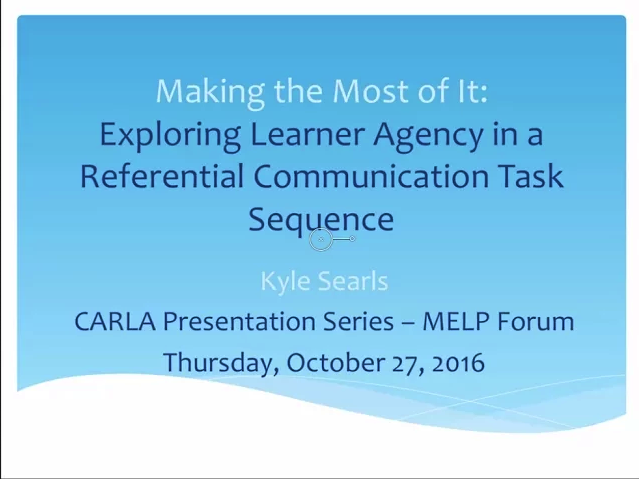
Searls, K. (2016, October 27). "Making the Most of It: Exploring Learner Agency in a Referential Communication Task Sequence."
The presenter will discuss how two Korean English learners shaped interaction with the interviewer during a Question and Retell referential task sequence. Learner agency is explored through qualitative linguistic analyses of questions asked and patterns of language adopted from the interviewer. This linguistic data is surveyed for divergence from a "typical" performance through learners' strategic behavior and resistance to the task. The discussion contributes to an understanding of referential communication as social interactions that require participants to negotiate intersubjectivity as well as transfer information (Yule, 1997).
Presenter:
Kyle Searls, MA in TESOL, is adjunct faculty in the Minnesota English Language Program. His background includes teaching EFL in Argentina and South Korea; he also holds licences to teach ESL and Spanish in Wisconsin. His interests include SLA and learner identity.
Cosponsored by the Minnesota English Language Program and the Second Language Education Program in the Department of Curriculum and Instruction.
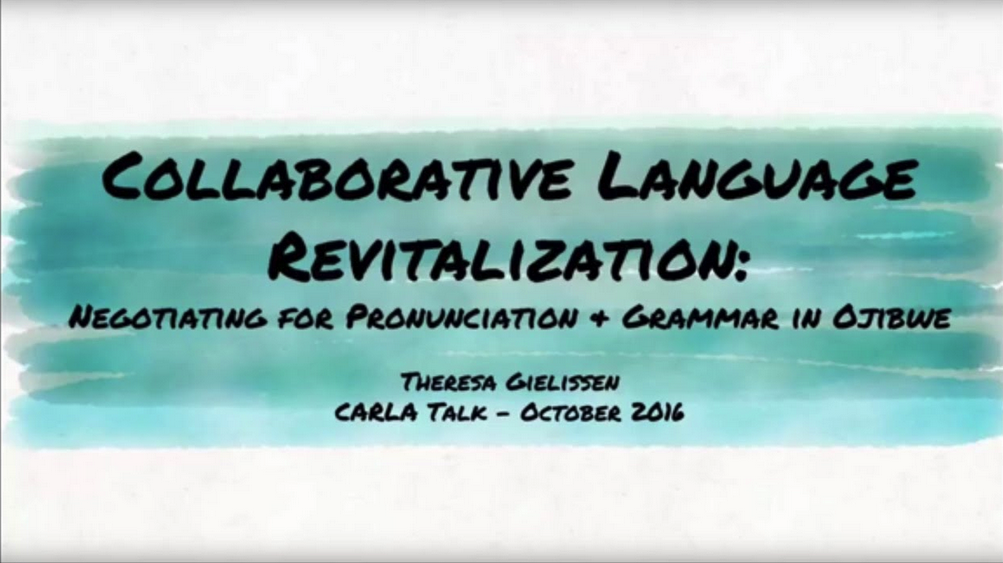
Gielissen, T. (2016, October 11). "Collaborative Language Revitalization: Negotiating for Pronunciation and Grammar in Ojibwe."
Due to the crushing effects of hundreds of years of racial and linguistic colonialism, Ojibwe is now considered an endangered language, and the number of native speakers dwindles a little more each year. This has sparked a wave of language revitalization efforts, which have attempted to bring the language back into use. Unfortunately, prospective Ojibwe learners often struggle to find meaningful language practice opportunities, and due to the unavailability of immersion schools, adult learners often learn individually. In this study, the presenter examines her own language negotiation with a fellow graduate student after 11 weeks of Ojibwe study. Her findings show that, despite their low language ability, the learners were able to notice and correct each other's Ojibwe pronunciation and grammar. While this small case study, of course, cannot be generalized to language revitalization at large, it suggests that, even in a community in which native speakers become scarcer each year, the learning of the Ojibwe language can be continued through collaboration between language learners.
Presenter:
Theresa Gielissen is a recent graduate of the MA in TESOL program and currently works at the Minnesota English Language Program as an adjunct teaching specialist.
Cosponsored by the Minnesota English Language Program and the Second Language Education Program in the Department of Curriculum and Instruction
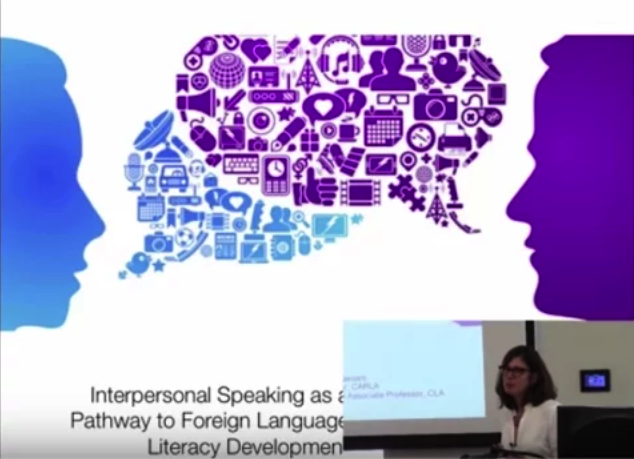
Paesani, K. (2016, September 28). "Interpersonal Speaking as a Pathway to Foreign Language Literacy Development."
In recent years, the concept of literacy has emerged as a common goal for collegiate foreign language curricula. Whereas traditional definitions of literacy focus on students' ability to read and write, modern definitions entail the ability to interpret and create meaning in a range of sociocultural contexts through interaction with authentic target language texts of various genres. This broader definition suggests that literacy development encompasses all language modalities—reading, writing, listening, viewing, and speaking—and that these modalities overlap as learners interact with literary-cultural content to communicate meaningfully. In this presentation, I expand this definition and use illustrative examples to help argue that interpersonal speaking is a viable pathway to foreign language literacy development and increased engagement with literary-cultural content at all levels of the undergraduate foreign language curriculum.
Presenter:
Kate Paesani is the new Director of CARLA. Her research focused on literacy-based curriculum and instruction and foreign language teacher development. Before coming to CARLA she was an associate professor and director of basic French courses at Wayne State University.
Cosponsored by the CLA Language Center and the Second Language Education Program in the Department of Curriculum and Instruction.
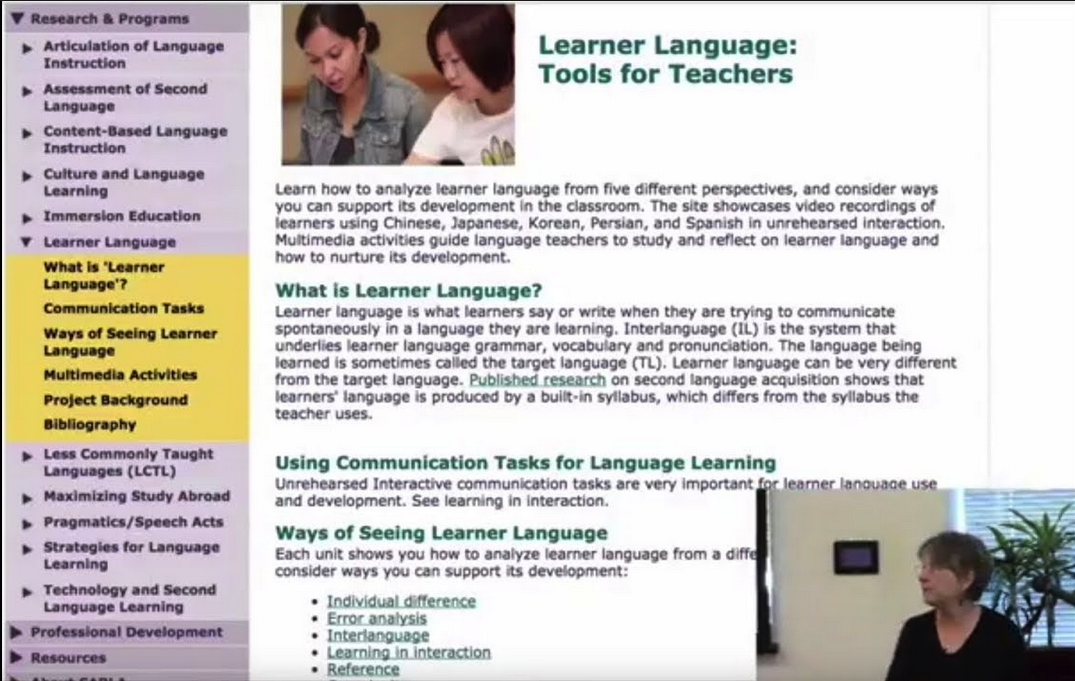
Tarone, E., & Wicker, S. (2016, September 14). "Exploring Spanish Learner Language: New CARLA Multimedia Activities."
The presenters will show the newest installment to the learner language project: multimedia interactive materials featuring two learners of Spanish, one a heritage learner and the other a foreign language learner. Using Exploratory Practice (Allwright & Hanks, 2009) as a framework, the presenters will engage participants in website activities that show how to explore and document characteristics of the Spanish language the different learners produce. For example, the group will explore and measure key differences in lexical variety and syntactic complexity when the learners did the same task orally and in writing. The group will consider together reasons for such learner differences and possible pedagogical responses.
Presenters:
Elaine Tarone is a Distinguished Teaching Professor Emerita at the University of Minnesota, and past Director of CARLA. She has published extensively in the field of second-language acquisition.
Shawna Wicker is a graduate student in the MA in TESOL program. Her background and interests include Hispanic linguistics, SLA, teaching Spanish in the US, and teaching EFL in Italy and China.
Cosponsored by the Second Language Education Program in the Department of Curriculum and Instruction.
2016 - Winter/Spring
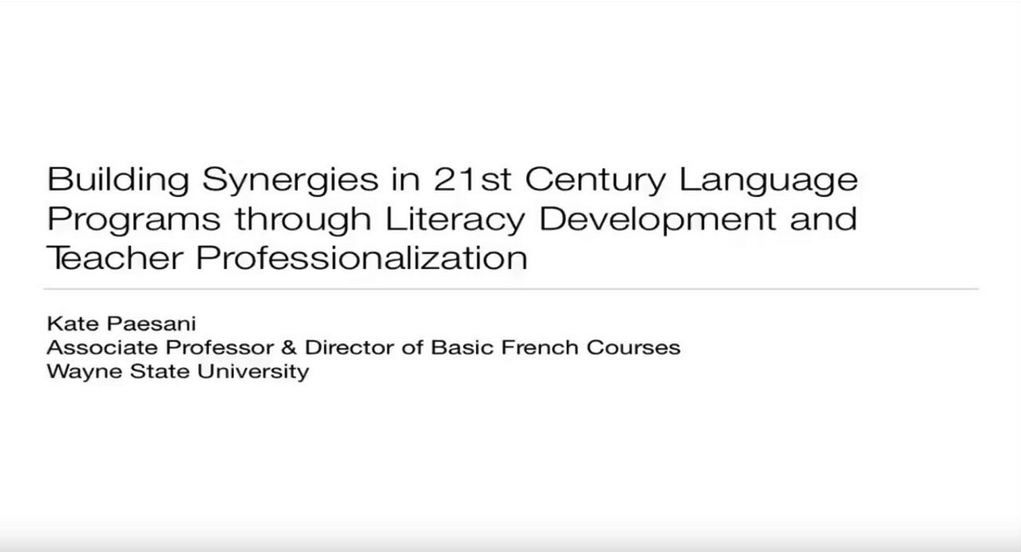
Paesani, K. (2016, April 6). "Building Synergies in 21st Century Language Programs through Literacy Development and Teacher Professionalization."
To overcome challenges facing language programs in the 21st century, a focus on synergies is crucial. In this presentation, I discuss synergies that are embodied in two strands of empirical research: one focusing on students' foreign language literacy development; the other on graduate student teacher professionalization. Using the multiliteracies framework as theoretical grounding for both studies, I explore how an understanding of learner perceptions, literacy development, and teacher practice can create stronger relationships between research and practice, language competencies and content knowledge, secondary and post-secondary educational contexts, and foreign languages and other disciplines, and thus enhance language teaching and learning. I conclude by considering how these kinds of synergies are reflected in and can be expanded upon through projects and professional development efforts at the Center for Advanced Research in Language Acquisition.
Presenter:
Kate Paesani, Associate Professor & Director of Basic French Courses, Department of Classical & Modern Languages, Wayne State University
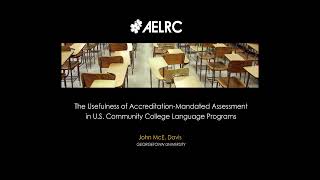
McEwan Davis, J. (2016, April 4). "The Usefulness of Accreditation-Mandated Assessment in U.S. Community College Language Programs."
U.S. college foreign language educators are under increasing pressure to use assessment and evaluation for program improvement. Institutional accreditation, in particular, has tried to make program assessment an integral part of educational delivery with the ambitious aim of increasing educational effectiveness across U.S. post-secondary institutions. The productive usefulness of accreditation-driven assessment, however, is in question. Research suggests, rather, that institutional assessment requirements result in perfunctory, compliance-oriented assessment activity and fail to achieve meaningful educational change. How have these mandates impacted college-level language education? This presentation reports on a national survey of programmatic assessment activities in U.S. community college language programs. The study investigated the extent to which educators are using assessment productively (e.g., to develop materials or modify instruction) and whether they have the needed resources to conduct assessment for educational innovation and improvement purposes.
Presenter:
John McEwan Davis, Visiting Assistant Professor, Georgetown University and Co-Director, Assessment and Evaluation Language Resource Center
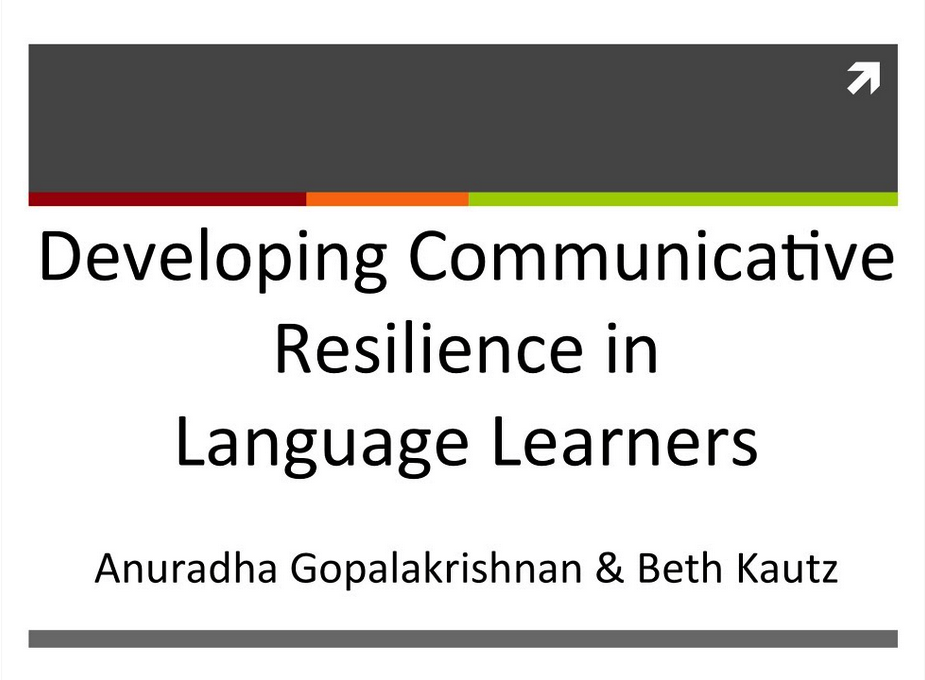
Gopalakrishnan, A., & Kautz, B. (2016, March 29). "Developing Communicative Resilience in Language Learners."
Language learners need communicative resilience: the ability to persist in unrehearsed interactions even in the face of communication breakdowns. The present study analyzes the effect of continuous and explicit instruction of communication strategies on the communicative resilience of intermediate level adult learners of German.
The treatment in this study included weekly input in the form of core vocabulary and training activities. A comparison of pre- and post-tests show a substantial rise in the learners' ability to manage communicative breakdowns and interact successfully despite them. This study has implications for teaching interpersonal communication skills to language learners and in improving their self-confidence while engaging in unrehearsed interactions in a second language.
Presenters:
Anuradha Gopalakrishnan is a first year PhD student in the Department of Curriculum and Instruction. Her research interests include learner language in multilingual settings.
Beth Kautz coordinates and teaches intermediate German (German 1003) at the University of Minnesota. She is interested in new pedagogical approaches and has implemented blended learning, integrated performance assessments, and content-based instruction in her courses.
Cosponsored by the Second Language Education Program in the College of Education and Human Development.
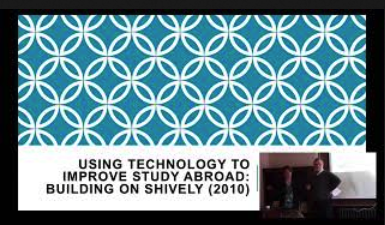
Goertler, S. (2016, March 28). "Using Technology to Improve Study Abroad: Building on Shively (2010)."
As foreign language enrollments decrease (MLA, 2015) and the Generation Study Abroad Initiative (Institute of International Education, 2014) demands a doubling of study abroad participation, language programs need to improve the effectiveness and the articulation of study abroad in the overall curriculum. Shively (2010) proposed a model for pragmatic learning, which uses technology to improve pragmatic learning before, during, and after study abroad participation. Building on Shively, Goertler (2015) argued that technology cannot only improve pragmatic learning, but technology's affordances can help prepare students for study abroad, maximize language and culture learning while abroad, and assist in integrating students returning from study abroad.
Based on these notions the German program at Michigan State University has introduced three technology-mediated curricular innovations to increase study abroad participation and enrollment, and improve the effectiveness of and articulation of our curriculum. (1) By integrating technology-enhanced modules about our study abroad destinations into our second-year curriculum prior to students going abroad, we have increased participation in study abroad and stakeholders report that students are better prepared for study abroad. (2) During our year-long study abroad program, students completed analysis tasks and reflective blogs to increase noticing of language and culture gaps. While students did notice stereotypical morphosyntactical and intercultural communicative errors, many of the errors leading to greater communicative challenges were not noticed. (3) To better integrate our study abroad returnees into the curriculum, we revised our fourth-year language course to include a virtual exchange with students at an institution located in one of our study abroad destinations. This post study abroad virtual exchange allowed students to continue to use German at a high level and stay connected to German-speaking communities. For one of the two year-long study abroad program returnees this exchange had a significant positive impact on her challenges with reverse culture shock and reintegration into our curriculum and institution.
Presenter:
Senta Goertler, Associate Professor of Second Language Studies and German, Department of Linguistics and Germanic, Slavic, Asian, and African Languages, Michigan State University
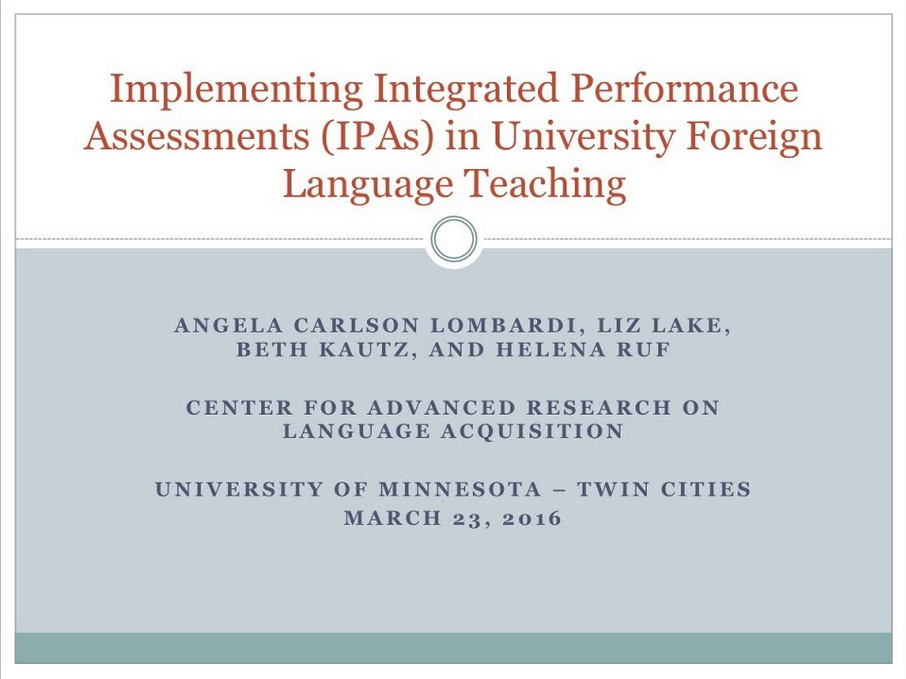
Carlson-Lombardi, A., Kautz, B., Lake, E., & Ruf, H. (2016, March 23). "Implementing Integrated Performance Assessments (IPAs) in University Foreign Language Teaching."
Instructors from the Departments of German, Scandinavian and Dutch and Spanish & Portuguese share their experiences implementing Integrated Performance Assessments (IPAs) in first-year and second-year foreign language courses, including the challenges and successes.
Presenters:
Angela Carlson Lombardi is the Coordinator for Spanish 1003 and has taught both language and culture in the Department of Spanish and Portuguese Studies. She has also conducted Global Seminars abroad. Her interests are developing authentic cultural materials for the classroom with blended online and face to face instruction.
Beth Kautz coordinates and teaches intermediate German (German 1003). She is interested in new pedagogical approaches and has implemented blended learning, integrated performance assessments, and content-based instruction in her courses.
Liz Lake is a Senior Teaching Specialist in the Department of Spanish & Portuguese Studies. She has taught beginning and intermediate-level hybrid and technology-enhanced Spanish courses for over nine years.
Helena Ruf is Director of Language Instruction in the Department of German, Scandinavian and Dutch. She also coordinates and teaches first-year German and is interested in creating innovative materials for classroom use and assessment.
Cosponsored by the CLA Language Center PACE project
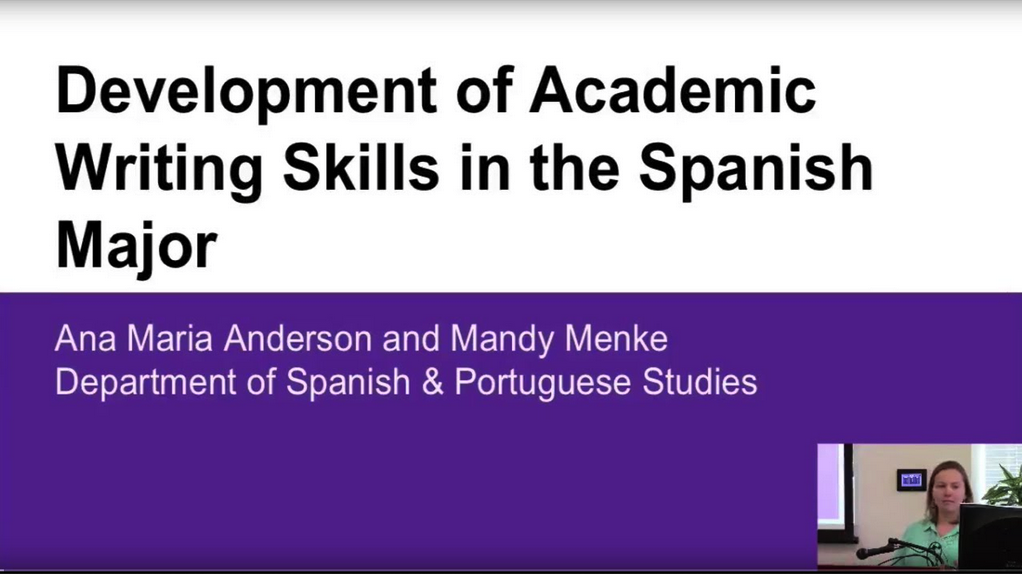
Anderson, A. M., & Menke, M. (2016, March 7). "Development of Academic Writing Skills in the Spanish Major."
In this presentation, we explore the writing development of undergraduates in the Spanish major. The presentation begins with a comparison of student writing with self-reported faculty expectations, highlighting incongruities between the two and the potential impact of under-defined criteria in assignment descriptions and rubrics. From there, we explore the linguistic forms and expressions students use to fulfill one of these criteria—adoption of a critical and analytical stance—via a function-form analysis.
Presenters:
Ana Maria Anderson is a Ph.D. student in Hispanic Linguistics in the Department of Spanish and Portuguese Studies. While she has done work in a variety of areas of linguistics, including studies of Metaphor and of Second/Third Language Acquisition of Spanish and Portuguese, her main focus is on Language Contact between Galician and Spanish in Galicia.
Mandy Menke is an Assistant Professor of Hispanic Linguistics and Director of Language Programs in the Department of Spanish and Portuguese Studies. She regularly researches topics related to both second language acquisition and foreign language pedagogy, at both the university and K-12 levels.
Cosponsored by the Department of Spanish and Portuguese Studies and the CLA Language Center PACE project.
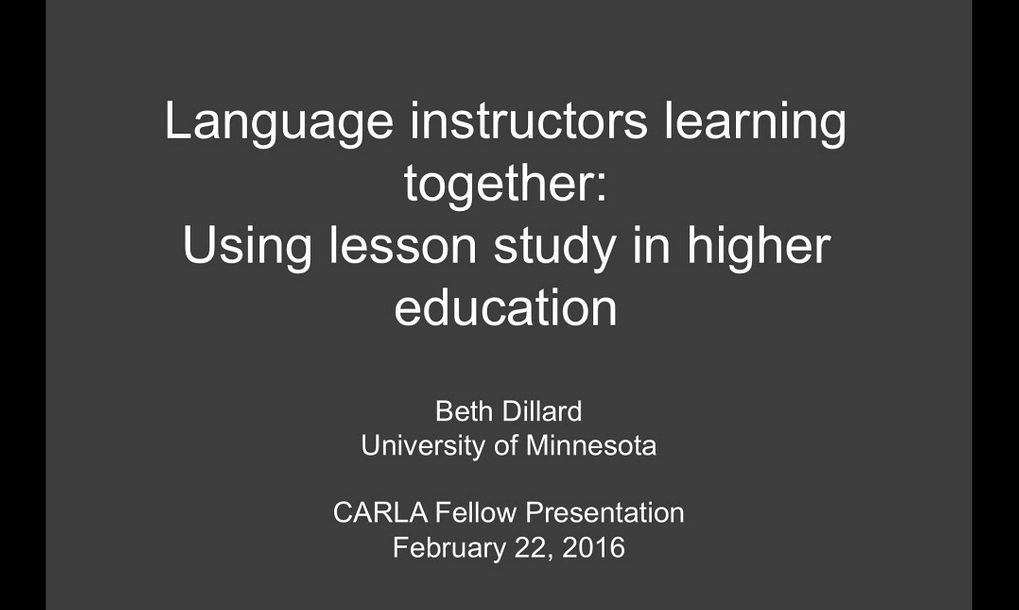
Dillard, B. (2016, February 23). "Language Instructors Learning Together: Using Lesson Study in Higher Education."
Research on professional development overwhelmingly suggests that instructor learning is maximized through sustained involvement in active learning. This type of participation allows instructors not only needed time to absorb and conceptually integrate new ideas, but more importantly, to practice that new knowledge in the contexts relevant to their work (Garet, Porter, Andrew & Desimone, 2001; Guskey, 2000; Opfer & Pedder, 2011). It can be challenging to design these types of meaningful environments for language instructors in higher education, particularly in the less commonly taught languages (LCTLs) where individuals may be sole representatives of their language.
In response to this challenge, the author brought together a small inquiry group composed of college instructors of Arabic, Japanese, and Korean (for a total of five individuals). Drawing ideas from both the exploratory practice model (Allwright, 2009) and the jugyou kenkyuu "lesson study" framework (Yoshida, 1999; Lewis, 2004), an inquiry cycle was designed to engage the participants in collaborative investigation of collective problems of practice. Participants first used video recordings and classroom observations to focus their attention on student learning; subsequently, transcripts of group conversations about classroom observations served to stimulate awareness of moments of teacher learning.
This paper uses an activity theory framework to address the following question: How can elements of an instructor inquiry group such as interaction patterns, transcripts of previous group meetings, and videos of classroom interactions serve to mediate language teacher conceptual development? Analysis of interview and inquiry group meeting data suggests the efficacy of using transcripts from prior meetings as "mirrors" or "second stimuli" (Engestršm & Sannino, 2010) to mediate further insight into one's teaching practice. Further, and importantly for professional development work with instructors of LCTLs, data suggest that the multi-language nature of the group itself was a mediating factor towards language teacher conceptual development.
Presenter:
Beth Dillard is a Ph.D. candidate in the Second Language Education program in the College of Education and Human Development. Her research interests include teacher learning through teacher-led inquiry, the academic language development of language learners, and content-language integration in language classrooms. Beth was selected as a CARLA Fellow for 2014-2015.
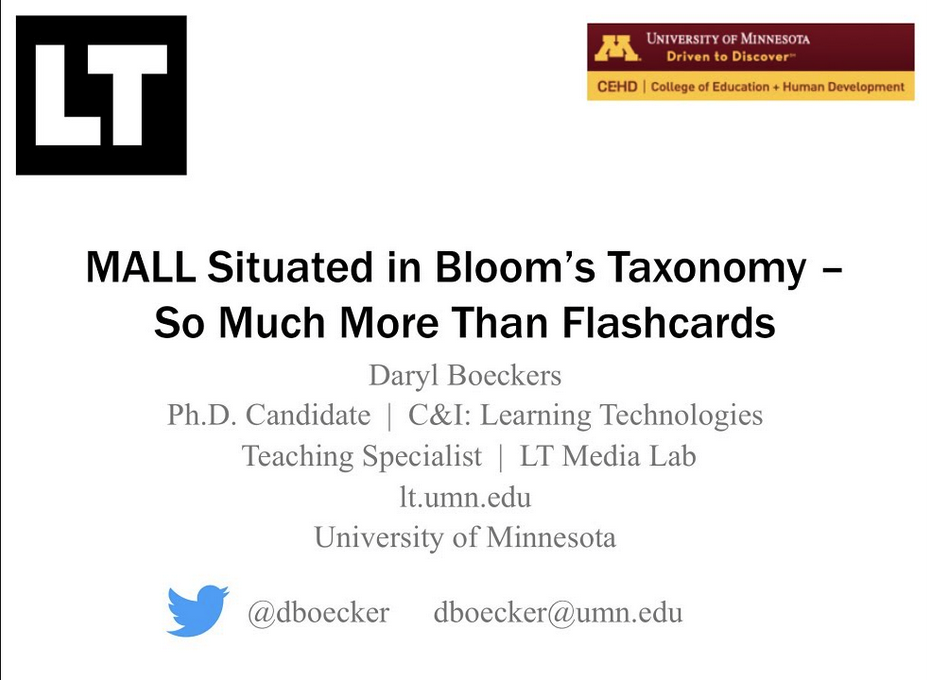
Boeckers, D. (2016, February 10). "Mobile-Assisted Language Learning Situated in Bloom's Taxonomy—So Much More Than Flashcards!"
Mobile-assisted Language Learning can sometimes get a bad reputation from critics of limited use of apps. This sessions counters that critique with an exploration of apps (iOS, Droid, Chrome) that weaves through Bloom's Taxonomy. In particular, we will emphasize the highest level of Bloom's updated TaxonomyÐcreating. Highlighted tasks are all contextualized in the L2 classroom and attendees will have access to a resource webpage chock-full of handouts, screencasts and rubrics.
Presenter:
Daryl Boeckers trains in-service and pre-service teachers at the Learning Technologies Media Lab in the College of Education + Human Development. His background is teaching 15 years of secondary Spanish. Daryl teaches, writes, conferences, publishes and gives talks about how mobile technologies affect language teaching and learning.
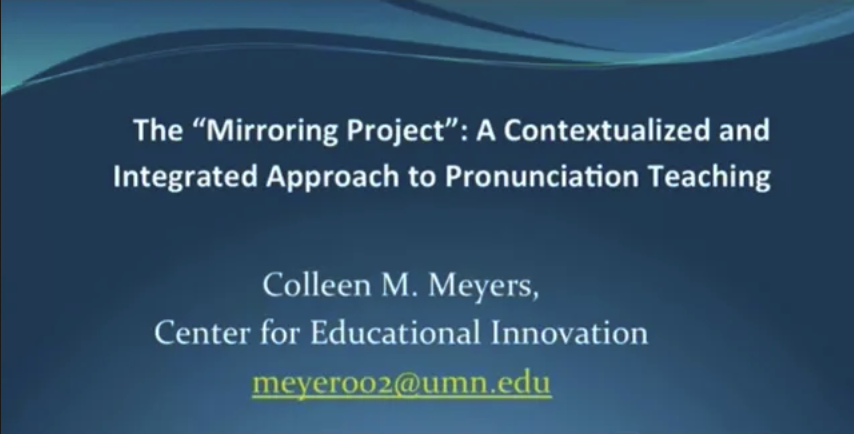
Meyers, C. (2016, February 5). "The 'Mirroring Project': A Contextualized and Integrated Approach to Pronunciation Teaching."
Although the field of pronunciation teaching has moved from the audio-lingual era of "listen and repeat" to more interesting and fun activities, it's still often de-contextualized. In addition, it may be taught from a bottom-up perspective (sounds through intonation) or as discrete pronunciation features.
The "Mirroring Project," in which students mimic not only the language but also the non-verbals of an intelligible spoken model, is one way to contextualize pronunciation practice, as well as integrate pronunciation features into one practice activity. This interactive presentation will take you through the steps of this process so that you can apply it to your own ESL or foreign language classroom context.
Presenter:
Colleen Meyers is an educational specialist at the Center for Educational Innovation. In 2007, she trained university-level instructors in teaching pronunciation as a Fulbright scholar in Turkey.
